democracynow.org
Stories:

Clinton & Sanders Spar on Immigration Reform, Deportations & U.S. Imperialism in Latin America
Clinton & Sanders Spar on Immigration Reform, Deportations & U.S. Imperialism in Latin America
In the 2016 race for the White House, former Secretary of State Hillary Clinton and Vermont Senator Bernie Sanders squared off in a debate at Miami-Dade College in Florida sponsored by the Spanish-language network Univision. The two candidates clashed on issues including immigration, trade policy, Latin America and more. Both candidates vowed not to deport children, while Clinton attacked Sanders for opposing a 2007 immigration bill. Sanders also spoke out against U.S. military intervention in Latin America after being shown a 1985 clip of him praising Fidel Castro. "What that was about was saying that the United States was wrong to try to invade Cuba, that the United States was wrong trying to support people to overthrow the Nicaraguan government, that the United States was wrong trying to overthrow in 1954 the democratically elected government of Guatemala," Sanders said. The debate comes one day after Sanders’ surprise victory in the Michigan primary.
TRANSCRIPT
This is a rush transcript. Copy may not be in its final form.
NERMEEN SHAIKH: With less than a week before voters head to the polls in Florida, Illinois, Missouri and North Carolina, Hillary Clinton and Bernie Sanders sparred last night in a debate in Miami hosted by Univision. Large portions of the debate focused on immigration. Facing questioning by moderator Jorge Ramos, both candidates promised not to deport children or noncriminal undocumented immigrants.
JORGE RAMOS: But again, yes or no, can you promise tonight that you won’t deport children, children who are already here?
HILLARY CLINTON: I will not deport children. I would not deport children. I do not want to deport family members, either, Jorge. I want to, as I said, prioritize who would be deported: violent criminals, people planning terrorist attacks, anybody who threatens us. That’s a relatively small universe.
JORGE RAMOS: OK, so I want to be very specific. So, you’re telling us tonight that if you become president, you won’t deport children who are already here?
HILLARY CLINTON: I will not.
JORGE RAMOS: And that you won’t deport immigrants who don’t have a criminal record.
HILLARY CLINTON: That’s what—that’s what I’m telling you.
JORGE RAMOS: Senator, Senator Sanders, will you—can you promise us tonight that you won’t deport children?
SEN. BERNIE SANDERS: Now, I happen to agree with President Obama on many, many issues. I think he’s done a great job as president of the United States. He is wrong on this issue of deportation. I disagree with him on that. So, to answer your question, no, I will not deport children from the United States of America.
JORGE RAMOS: And can you promise not to deport immigrants who don’t have a criminal record?
SEN. BERNIE SANDERS: I can make that promise.
AMY GOODMAN: Hillary Clinton repeatedly criticized Bernie Sanders for voting against a 2007 immigration reform bill.
HILLARY CLINTON: I think our best chance was in 2007, when Ted Kennedy led the charge on comprehensive immigration reform. We had Republican support. We had a president willing to sign it. I voted for that bill. Senator Sanders voted against it.
MARÍA ELENA SALINAS: Now, Senator Sanders, in 2007, you voted against immigration reform. You now say that it was because the bill had guest worker provisions which seemed semi-slavery. But back then, this is what you said to CNN’s Lou Dobbs. Let’s listen.
SEN. BERNIE SANDERS: If poverty is increasing and if wages are going down, I don’t know why we need millions of people to be coming into this country as guest workers who will work for lower wages than American workers and drive wages down even lower than they are right now.
MARÍA ELENA SALINAS: So, Senator, were you concerned with working conditions for guest workers, or really because you think immigrants drive down wages and take jobs from Americans?
SEN. BERNIE SANDERS: Well, you have guest worker programs that have been described by the Southern Poverty Law Center, one of the important institutions in this country who studies these issues, as guest worker programs akin to slavery, where people came in, they were cheated, they were abused, they were humiliated, and if they stood up for their rights, they would be thrown out of the country. Of course that type of effort leads to a race to the bottom for all of our people.
HILLARY CLINTON: You know, I think it’s very hard to make the case that Ted Kennedy, Barack Obama, me, La Raza, United Farm Workers, Dolores Huerta, leaders of the Latino community, would have supported a bill that actually promoted modern slavery. That was one of the many excuses used not to vote for the 2007 bill.
NERMEEN SHAIKH: While Hillary Clinton and Bernie Sanders took jabs at Donald Trump, Clinton was questioned about her voting record to expand security along the Mexican border.
MARÍA ELENA SALINAS: But the question is: What is the difference between the wall that you voted for and Donald Trump’s wall?
HILLARY CLINTON: It’s a big difference. I mean, first of all, as I understand him, he’s talking about a very tall wall—right?—a beautiful, tall wall, the most beautiful, tall wall, better than the Great Wall of China, that would run the entire border, that he would somehow magically get the Mexican government to pay for. And, you know, it’s just fantasy. And, in fact, if he cared to know anything about what members of Congress, like the senator and I, have done, where it was necessary, we did support some fencing. Where it was necessary, we did add Border Patrol agents. We have done what by any fair estimate would have to conclude is a good job, quote, "securing the border." So let’s get about the business of comprehensive immigration reform.
SEN. BERNIE SANDERS: Let me just say—
MARÍA ELENA SALINAS: Senator?
SEN. BERNIE SANDERS: The secretary and I mostly, I think, agree on this issue. Look, in this country, immigration reform is a very hot debate. It’s divided the country. But I would hope very much that as we have that debate, we do not, as Donald Trump and others have done, resort to racism and xenophobia and bigotry. This idea of suddenly, one day or maybe a night, rounding up 11 million people and taking them outside of this country is a vulgar, absurd idea that I would hope very few people in America support.
AMY GOODMAN: The candidates also discussed the Puerto Rican debt crisis.
HILLARY CLINTON: The Congress must give authority to Puerto Rico to restructure its debts, just like it has—it has enabled states and cities to restructure their debt. And it is a grave injustice for the Congress, led by the Republicans, to be refusing to enact that opportunity within the bankruptcy law.
And what we see in Puerto Rico now is a lot of suffering. We see, you know, schools being closed. We see healthcare being denied. And we see a thousand Puerto Rican families a month moving to the United States, mostly to Florida. Puerto Ricans are citizens of America. They deserve to be treated as citizens and to be given the opportunity to get back on their feet economically.
SEN. BERNIE SANDERS: When you get to Puerto Rico, there’s an issue that we have not talked about. That little island is $73 billion in debt, and the government now is paying interest rates of up to 11 percent. And many of the bonds that they are paying off were purchased by vulture capitalists for 30 cents on the dollar. And what I have said in talking to the leaders of Puerto Rico, we’ve got to bring people together. And it’s not the people of Puerto Rico or the children—
KAREN TUMULTY: Senator—OK.
SEN. BERNIE SANDERS: —or the schools, but maybe some of these vulture capitalists who are going to have to lose a little bit of money in this process.
NERMEEN SHAIKH: During the debate, Univision questioned Bernie Sanders about comments he made during the 1980s about Cuba and Nicaragua.
MARÍA ELENA SALINAS: In 1985, you praised the Sandinista government, and you said that Daniel Ortega was an impressive guy. This is what you said about Fidel Castro. Let’s listen.
SEN. BERNIE SANDERS: You may recall way back in—when was it?—1961, they invaded Cuba. And everybody was totally convinced that Castro was the worst guy in the world, all the Cuban people were going to rise up in rebellion against Fidel Castro. They forgot that he educated their kids, gave them healthcare, totally transformed the society.
MARÍA ELENA SALINAS: In South Florida, there are still open wounds among some exiles regarding socialism and communism. So please explain what is the difference between the socialism—
SEN. BERNIE SANDERS: Well—
MARÍA ELENA SALINAS: —that you profess and the socialism in Nicaragua, Cuba and Venezuela.
SEN. BERNIE SANDERS: Well, let me just answer that. What that was about was saying that the United States was wrong to try to invade Cuba, that the United States was wrong trying to support people to overthrow the Nicaraguan government, that the United States was wrong trying to overthrow in 1954 the government—democratically elected government of Guatemala. Throughout the history of our relationship with Latin America, we’ve operated under the so-called Monroe Doctrine. And that said that the United States had the right do anything that they wanted to do in Latin America.
So I actually went to Nicaragua, and I very strongly opposed the Reagan administration’s effort to overthrow that government. And I strongly opposed earlier Henry Kissinger and the—to overthrow the government of Salvador Allende in Chile. I think the United States should be working with governments around the world, not get involved in regime change. And all of these actions, by the way, in Latin America brought forth a lot of very strong anti-American sentiments. That’s what that was about.
HILLARY CLINTON: And I just want to add one thing to the question you were asking Senator Sanders. I think in that same interview he praised what he called the revolution of values in Cuba and talked about how people were working for the common good, not for themselves. I just couldn’t disagree more. You know, if the values are that you oppress people, you disappear people, you imprison people, even kill people, for expressing their opinions, for expressing freedom of speech, that is not the kind of revolution of values that I ever want to see anywhere.
NERMEEN SHAIKH: At the Univision debate, Hillary Clinton was also questioned about her use of a private email server while she was secretary of state.
JORGE RAMOS: So, who specifically gave you permission to operate your email system as you did? Was it President Barack Obama? And would you drop out of the race if you get indicted?
HILLARY CLINTON: Well, Jorge, there’s a lot of questions in there. And I’m going to give the same answer I’ve been giving for many months. It wasn’t the best choice. I made a mistake. It was not prohibited. It was not in any way disallowed. And as I’ve said and as now has come out, my predecessors did the same thing, and many other people in the government.
JORGE RAMOS: The questions were: Who gave you permission to operate?
HILLARY CLINTON: There—there—
JORGE RAMOS: Was it President Obama?
HILLARY CLINTON: There was no permission to be asked. It had been done by my predecessors. It was permitted. I didn’t have to ask anyone.
JORGE RAMOS: If you get indicted, would you drop out?
HILLARY CLINTON: Oh, for goodness—that is not going to happen. I’m not even answering that question.
AMY GOODMAN: Highlights from last night’s Univision debate in Miami, Florida. It was the last Democratic debate before voters go to the polls in Florida, Illinois, Missouri, North Carolina and Ohio. The Republicans debate tonight at the University of Miami. This is Democracy Now! When we come back, we’ll be joined by military historian, by retired Colonel Andrew Bacevich. He is asking why questions on foreign policy are not being asked of any of the candidates. And he says that Donald Trump is not only changing the Republican Party, but changing America forever. Stay with us. ... Read More →

Andrew Bacevich: Why Is No Candidate Offering an Alternative to Militarized U.S. Foreign Policy?
In a recent article, historian and retired Colonel Andrew Bacevich raised six questions that have been ignored in the 2016 presidential race. Most notably, he says, "Nearly 15 years after this 'war' was launched by George W. Bush, why hasn’t 'the most powerful military in the world,' 'the finest fighting force in the history of the world’ won it? Why isn't victory anywhere in sight?" Bacevich joins us from Boston to talk about the race and these missing questions. His new book, "America’s War for the Greater Middle East: A Military History," will be published next month. He is professor emeritus of international relations and history at Boston University.
TRANSCRIPT
This is a rush transcript. Copy may not be in its final form.
NERMEEN SHAIKH: To talk more about the presidential race and to look at some of the questions not being raised at the debates, we’re joined by Andrew Bacevich, a retired colonel and Vietnam War veteran. His new book, America’s War for the Greater Middle East: A Military History, will be published next month. He is professor emeritus of international relations and history at Boston University, also author of several other books, including Washington Rules: America’s Path to Permanent War. His son was killed in action in Iraq in 2007.
AMY GOODMAN: Andrew Bacevich’s most recent article is headlined "The Six Questions Missing from the 2016 Election Debates." He’s joining us now from Boston.
Andrew Bacevich, welcome back to Democracy Now! So what is missing from these debates?
ANDREW BACEVICH: Well, from my point of view, the big thing that’s missing is a willingness to take on board the progress, or lack thereof, of U.S. military involvement in the Islamic world. Certainly, there is attention in the campaign given to the ISIS campaign, the campaign against ISIS. But let us note that even as the ISIS campaign unfolds, we’re still involved in Afghanistan. You noted in your news roundup, we’ve just had a major bombing incident in Somalia, followed by a special operations raid. Last week in The New York Times, there was an article discussing the plans within the Obama administration perhaps to launch a major air campaign in Libya.
And it seems to me to be time for the American people, or for those aspiring to be the next commander-in-chief, to take stock of this military involvement in the region, which has been going on for decades now, and to ask, "How are we doing? Are we winning? What are the prospects?" And to pose those questions in a serious way would, I think, contribute to a conclusion that the militarization of U.S. policy in that part of the world has been utterly counterproductive and is making things worse, not better.
NERMEEN SHAIKH: Andrew Bacevich, a lot of people in the U.S. would disagree with the claim that ISIS is not the principal threat facing Americans today. So could you explain why you think that’s not the case?
ANDREW BACEVICH: Well, I think ISIS is a—poses an existential threat to the countries in the region. It threatens the state structure that was created in the aftermath of World War I. And therefore, from that point of view, the powers in the region, whether we’re talking about Iran, Saudi Arabia, Turkey, Iraq and others, they have a profound interest in bringing about the destruction of ISIS. But by any realistic measure, ISIS poses only a modest threat to the United States of America. It doesn’t have an air force. It doesn’t have a navy. It consists of a relatively small number of fierce fighters, not particularly well armed. And the notion that ISIS somehow threatens us, I think, is really absurd.
NERMEEN SHAIKH: Do you think that there’s any evidence to suggest that the next administration, whether it’s Republican or Democrat, will be less interventionist in the Muslim world?
ANDREW BACEVICH: Well, if we look at the remaining Republican candidates, they are all clearly different flavors, but they’re all militarists. I would certainly evaluate Secretary Clinton as an exceedingly hawkish Democrat. Her principal achievement, if you want to call it that, as secretary of state was in pushing the intervention in Libya, which has produced catastrophic consequences.
Senator Sanders, however, is largely—it seems to me, hasn’t laid out his position. One might anticipate that given his general left-leaning view of the world, that he might be somewhat less inclined to rely on U.S. military power, might be more willing to consider alternatives to military power, but he has not yet, at least to my knowledge, really spelled out in detail where he stands on these matters. And frankly, I wish he would. I think he—I think he needs to, in order to move his candidacy beyond the economic and social justice themes that have been the core of his campaign thus far.
AMY GOODMAN: Well, you know, last night at the Univision debate, we just played that clip of Bernie Sanders saying, overall, when he was talking about Latin America, everyone from Nicaragua to Chile and the ouster of the democratically elected leader Salvador Allende, said he was opposed to, you know, U.S. interventions for regime change. And then, this was Vermont Senator Bernie Sanders at the Democratic presidential debate in [New Hampshire] accusing former Secretary of State Hillary Clinton of being, quote, "too much into that regime change."
SEN. BERNIE SANDERS: There’s some difference of opinion with Secretary Clinton on this. Our differences are fairly deep on this issue. We disagreed on the war in Iraq. We both listened to the information from Bush and Cheney. I voted against the war.
But I think—and I say this with due respect—that I worry too much that Secretary Clinton is too much into regime change and a little bit too aggressive without knowing what the unintended consequences might be. Yes, we could get rid of Saddam Hussein, but that destabilized the entire region. Yes, we could get rid of Gaddafi, a terrible dictator, but that created a vacuum for ISIS. Yes, we could get rid of Assad tomorrow, but that would create another political vacuum that would benefit ISIS. So I think, yeah, regime change is easy, getting rid of dictators is easy. But before you do that, you’ve got to think about what happens the day after.
HILLARY CLINTON: Now, with all due respect, Senator, you voted for regime change with respect to Libya. You joined the Senate in voting to get rid of Gaddafi, and you asked that there be a Security Council validation of that with a resolution.
All of these are very difficult issues. I know that; I’ve been dealing with them for a long time. And, of course, we have to continue to do what is necessary when someone, like Gaddafi, a despot with American blood on his hands, is overturned. But I’ll tell you what would have happened. If we had not joined with our European partners and our Arab partners to assist the people in Libya, you would be looking at Syria. Now the Libyans are turning their attention to try to dislodge ISIS from its foothold and begin to try to move together to have a unified nation.
SEN. BERNIE SANDERS: I was not the secretary of state.
AMY GOODMAN: That was Hillary Clinton and Bernie Sanders at the debate in Manchester, New Hampshire, last year. Andrew Bacevich, respond.
ANDREW BACEVICH: Well, I think that she’s putting a fairly optimistic take on the prognosis in Libya. And I think Senator Sanders’s critique of her interventionism, her pension for interventionism, deserves a far more serious response than she offers. She tends to shrug off the Iraq vote. She tends to shrug off the Libya experience as, you know, "Well, we did our best, and so what?" And I think that my point here is not—
AMY GOODMAN: Isn’t she just trying to get away from it?
ANDREW BACEVICH: —is not the partisan one—
AMY GOODMAN: Isn’t she just trying to get away from it, because, I mean, that you could say that that’s one of the key reasons that President Obama is president today? He opposed the Iraq War, and she voted for it. And now she’s dealing with the same thing with Bernie Sanders, who continually raises that key issue, that she voted for war with Iraq.
ANDREW BACEVICH: Yes, but the point here really is one that needs to look beyond partisanship. That is to say, who gets the better in these debates? The real issue that, it seems to me, never gets fully addressed is this larger question of what the militarization of U.S. policy, in particular, in the Islamic world has yielded over a period of now several decades. The issue is not, specifically, what went right or wrong in Iraq, right or wrong in Libya. The issue really is, given the magnitude of the U.S. military involvement in the region, in one country after another, whether our purposes were supposedly to bring order, spread democracy, pacify, advance human rights, the total sum of our activity has produced next to nothing that is positive, has imposed great costs on ourselves and on many other nations and peoples, and shows no evidence of producing anything more positive tomorrow or the next year. So there is a need to take stock of U.S. military involvement in the region to recognize its failure, and therefore to consider alternatives. And it’s my personal judgment that there are alternatives to the militarization of U.S. policy. And quite frankly, I’d like to hear Senator Sanders be the one to begin to articulate what those alternatives might be.
NERMEEN SHAIKH: And in your view, Andrew Bacevich, what are some of the alternatives to the militarized foreign policy, U.S. foreign policy, that we’ve seen so far?
ANDREW BACEVICH: Well, let me give you, very briefly, a three-point strategy. First of all, point number one of this strategy is self-protection. Earlier, we talked about whether or not ISIS poses a particular threat to the United States. The threat’s minor. But we need to do a better job—certainly, we need to do a better job than we did on 9/11—at simply erecting barriers to keep the bad guys from getting at us. And that is primarily a function of domestic agencies—FBI, the Coast Guard, the TSA, border agencies. Keep the bad guys out.
Point number two in this strategy—and this alludes to my previous point about it is the nations in the region who are really affected by ISIS—point number two is to, as a diplomatic task, get those nations to recognize that they have a common interest in dealing with ISIS. Yes, they are divided among themselves on any variety—other variety of fronts—religious, sectarian, historical. But their common interest in dealing with ISIS is preeminent and ought to provide the basis for a collaboration against ISIS.
Point number three, again, the big question, the big issue, it seems to me—and I know that President Obama believes this—is the difficulty of some in the Islamic world of finding a path that will reconcile belief, faith, with secular modernity. Peaceful coexistence between the West and the Islamic world will require that reconciliation between faith and modernity occurring. But it has to occur on terms of the people within the region. So, point number three, really, of that strategy is to encourage that reconciliation; to demonstrate, through our own behavior, that faith and modernity need not be at odds; and to encourage exchanges—cultural, educational—between ourselves and, in particular, young people in the Islamic world, that will help demonstrate that we are not the enemy.
Now, that’s a strategy that does not involve U.S. military power in any significant way. It’s a strategy that would have to unfold over decades. But it is a preferable alternative to permanent war, and that’s where we are now.
AMY GOODMAN: Andrew Bacevich, what is the media not asking? What is your critique of the media right now?
ANDREW BACEVICH: Well, my critique of the media is that they allow this preoccupation with what happened yesterday, the day before, to transcend or to remove any larger awareness of what the United States has attempted to do, has accomplished or not accomplished, and at what cost over a period of decades. I mean, for all practical purposes, the U.S.-Iraq War of 2003-2011 has already been forgotten, not to mention the U.S. war in Iraq of 1990-'91, not to mention U.S. involvement in the Iran-Iraq War of 1980 to 1988. If you—if one takes on board that entire experience, military—U.S. military experience in and around Iraq over a period of decades, it's hard for me to imagine that you can look at what’s going on now and say, "Well, gosh, if we just defeat ISIS, everything is going to be—everything is going to be hunky-dory." The media is too focused on the immediate past and ignores the deeper past.
AMY GOODMAN: I want to go to your piece, "Has Trump Already Won?: He Has Already Changed the Republican Party and American Democracy Forever." But I want to start by playing two short clips. This is Trump this week responding to Anderson Cooper on CNN’s question of whether Islam is at war with the West.
DONALD TRUMP: I think Islam hates us. There’s something—there’s something there that—there’s a tremendous hatred there. There’s a tremendous hatred. We have to get to the bottom of it.
AMY GOODMAN: And now I want to turn to Donald Trump at the Republican debate in Greenville, South Carolina, Trump denouncing the Iraq War, calling it a "big, fat mistake."
DONALD TRUMP: Obviously, the war in Iraq was a big, fat mistake. All right? Now, you can take it anywhere you want. And it took Jeb—it took Jeb Bush, if you remember, at the beginning of his announcement, when he announced for president, took him five days. He went back. It was a mistake, it wasn’t a mistake. Took him five days before his people told him what to say. And he ultimately said it was a mistake. The war in Iraq, we spent $2 trillion, thousands of lives. We don’t even have it. Iran is taking over Iraq, with the second-largest oil reserves in the world. Obviously, it was a mistake.
JOHN DICKERSON: So—
DONALD TRUMP: George Bush made a mistake. We can make mistakes, but that one was a beauty. We should have never been in Iraq. We have destabilized the Middle East.
AMY GOODMAN: So there was Donald Trump taking on Jeb Bush, George Bush’s brother. He would then pull out of the race. And today, actually, Jeb Bush is meeting with Kasich, Rubio and Cruz, but not meeting with Trump, before the big debate tonight. But look at those two quotes, Andrew Bacevich, fitting in with saying Muslims should be banned from the U.S., saying Islam hates America, and then George Bush lied about the—lied us into the Iraq War.
ANDREW BACEVICH: Well, the Iraq War was a big, fat mistake. I mean, Trump, in many respects, is a blowhard, but from time to time he actually says something that is true. What’s not true is his characterization of Islam. It’s not simply that it’s not true; it’s that it’s utterly counterproductive. It cannot provide the basis for any sort of meaningful policy, unless somehow or other a president Trump would be interested in promoting some sort of Armageddon-like conflict between the West and Islam.
I mean, my—one of my points with regard to Trump is this. There are those who compare him to a fascist. I don’t think he’s a fascist, because however evil it may have been, fascism did imply some sort of a coherent ideology. Trump has no ideology. He shoots from the hip. He contradicts himself. He speaks in generalities. He has a remarkable aptitude, I think, for manipulating and exacerbating anger and alienation in a certain part of the American population. So he’s not so much a fascist, I think, as he is a representative of a kind of a personality cult. And in a sense, that would make him that much more dangerous, were he ever to become president, because we actually don’t know what he stands for, and therefore what he would do if in the position of commander-in-chief.
NERMEEN SHAIKH: Well, you’ve suggested that departing from U.S. foreign policy orthodoxy often has fatal consequences. And I want to ask about another point that Trump has made, and this on Russia. In an interview with CNN’s Anderson Cooper in October, Trump was asked about NSA whistleblower Edward Snowden. Trump denounced Snowden and said he would get along very well with Russian President Vladimir Putin.
DONALD TRUMP: I think he’s a total traitor. And I would deal with him harshly. And if I were president, Putin would give him over. I would get along with Putin. I’ve dealt with Russia. Putin hates—
ANDERSON COOPER: You think you’d get along with Putin?
DONALD TRUMP: I think I’d get along with him fine. I think he’d be absolutely fine.
NERMEEN SHAIKH: That was Trump speaking to CNN’s Anderson Cooper in October, saying that he, Trump, would get along very well with Putin. In December, Trump defended Putin after the Russian president called Trump a, quote, "very colorful, talented person." Trump responded by saying it is, quote, "a great honor to be so nicely complimented." In a series of interviews, Trump disputed reports of the Kremlin’s involvement in the killing of journalists, saying, quote, "Our country does plenty of killing also." Andrew Bacevich, your response?
ANDREW BACEVICH: Well, I mean, I think it’s frankly a bit silly to talk about the relationship with the leader of Russia in terms of "getting along with." Putin is not interested in, quote-unquote, "getting along with" the United States. Putin is a—is a thug. But in his own way, he is a relatively serious statesman playing a game that is defined by power and interests. I think, in many respects, Putin’s primary interest is trying to maintain his status within Russia at a time when the Russian economy is clearly having a very difficult time. So, a posture of blustering, of insisting upon the rest of the world giving respect to Russia, the respect that it deserves, plays well, I think, with his domestic constituents and helps to ease his domestic problems. But the notion that Putin wants to get along well with us, I think, is frankly absurd.
But what’s also, of course, not to be admitted, I think, or acknowledged or accepted is that Russia actually represents a very limited threat to the United States of America. There are those on the right in the United States who somehow think that Putin’s Russia can be equated to Stalin’s Soviet Union, and therefore every time Putin exercises a modest amount of muscle, that somehow that ought to lead to a U.S. military response. I think that that also would be a reckless way to approach Russia.
AMY GOODMAN: We don’t hear very much about nuclear weapons. Why do you think this is a key question that is being missed for all of these candidates to have to address, Professor Bacevich?
ANDREW BACEVICH: Well, it beats me. I mean, I am astonished that there has been so little attention given to the Obama administration’s announced plans to modernize the U.S. nuclear arsenal with smaller nuclear weapons, which, to some people, might sound reassuring. "Smaller" means, actually, more usable and, arguably, more likely to be used. The modernization program involves new ballistic missiles, a new manned bomber for the Air Force, new missile-launching submarines. This is a program—it’s publicly announced—that probably will cost a trillion dollars or more between now and its projected completion, roughly around 2045, in time for the 100th anniversary of Hiroshima and Nagasaki.
Neither party, certainly none of the candidates, to my knowledge, have questioned whether this is going to be money well spent, why we need an expanded arsenal, how this plays with regard to the professions by, what, the last 10 presidents, all of whom have indicated that they would like to see nuclear weapons eliminated altogether. It’s another blindspot, it seems to me, in our political discourse that is baffling.
NERMEEN SHAIKH: Well, another point that you raise that’s missing from the debates is the fact, as you say, that U.S. forces are today active in 147 countries around the world. You ask why there are troops in so many countries, saying this question can’t really be posed, because "[t]o answer it is to expose the real purpose of American globalism, which means, of course, that none of the candidates will touch it with a 10-foot pole." Could you tell us what the answer to that question is, why U.S. troops are stationed in 147 countries and what it says about the real purpose of American globalism?
ANDREW BACEVICH: Well, if we compared why they’re in country A versus country B, the immediate rationale is going to differ. But when we consider that profile, the global profile that you just referred to—and that’s a global profile which has expanded in recent years but certainly has been enormous since the beginning of the Cold War, a military presence orders of magnitude greater than that of any other significant power on the face of the Earth—why are we doing that? Well, because people in Washington believe that military power, military presence, the projection of force, that these translate into influence that benefits the United States. They believe that that influence then translates into security for the United States of America. Many of them even believe that that translates into enhancing the well-being of the rest of the world. And I think that that’s a—it’s a notion implicit in U.S. national security strategy, therefore never examined, never questioned. And I think that posing those questions, it’s past time, because there’s plenty of evidence that the U.S. military presence may, in some places, contribute to stability, but in many other places it actually contributes to instability, at great cost to ourselves and others.
AMY GOODMAN: Also not mentioned at last night’s debate was the fact that the U.S. just bombed Somalia, killed 150 people. We’re told they believe that they’re militants at a training camp. It looks like the Pentagon first appeared to have initially tried to cover up the fact that it was not just drones, but also manned attacks. This is a country we are not officially at war with, and this week we first killed 150 people, the U.S. military, and now, in the last hours, another 19.
ANDREW BACEVICH: Well, exactly. So this—we used to call it the war on terrorism; I’m not sure if that term is actually still in circulation. But this enterprise, this war, this series of campaigns, continues to evolve, continues to expand. The authority of the president to make war wherever he chooses to now seemingly—is now seemingly beyond any sort of question. The Constitution, in that regard, has simply been thrown out the window. And to circle back to the fact that we’re in a political season, virtually none of this is discussed. Virtually none of this becomes a subject of the moderators at these interminable debates. It’s simply taken for granted that we—that war has become a normal condition.
AMY GOODMAN: We have to leave it there. I want to thank you, Andrew Bacevich, for joining us, retired colonel, Vietnam War veteran. His recent piece for The Nation, "The Six Questions Missing from the 2016 Election Debates." His new book, America’s War for the Greater Middle East: A Military History, will be published next month. He’s professor emeritus of international relations and history at Boston University. Among his other books, Washington Rules: America’s Path to Permanent War.
This is Democracy Now! When we come back, a debate on who would beat Donald Trump. Stay with us. ... Read More →

Hillary Clinton or Bernie Sanders: Who Can Trump Trump?
At last night’s Democratic presidential debate in Miami hosted by Univision, both Hillary Clinton and Bernie Sanders claimed they would be the best candidate to take on Republican front-runner Donald Trump in a general election. Well, the question of which Democratic candidate is best suited to challenge Trump is generating a lot of impassioned discussion and disagreement. We host a debate between Nathan Robinson of Current Affairs and professor Alan Draper of St. Lawrence University.
TRANSCRIPT
This is a rush transcript. Copy may not be in its final form.
NERMEEN SHAIKH: At last night’s Democratic presidential debate in Miami hosted by Univision, both Hillary Clinton and Bernie Sanders claimed they would be the best candidate to take on Republican front-runner Donald Trump in a general election.
SEN. BERNIE SANDERS: I believe that our message of the need for people to stand up and tell corporate America and Wall Street that they cannot have it all is resonating across this country. And I think, in the coming weeks and months, we are going to continue to do extremely well, win a number of these primaries and convince superdelegates that Bernie Sanders is the strongest candidate to defeat Donald Trump.
HILLARY CLINTON: If I am so fortunate enough to be the Democratic nominee, there will be a lot of time to talk about him. I was the first one to call him out. I called him out when he was calling Mexicans rapists. When he was engaging in rhetoric that I found deeply offensive, I said, "Basta." And I am pleased that others—others are also joining in making clear that his rhetoric, his demagoguery, his trafficking in prejudice and paranoia, has no place in our political system.
AMY GOODMAN: Well, the question of which Democratic candidate is best suited to challenge Republican front-runner Donald Trump is generating a lot of impassioned discussion and debate. So, who stands a better chance in the general elections—Bernie Sanders or Hillary Clinton? We’ll spend the rest of the hour talking about this.
In Boston, Massachusetts, we’re joined by Nathan Robinson, a doctoral student in sociology and social policy at Harvard University, editor-in-chief of Current Affairs, a new print magazine of political analysis. Robinson’s recent piece is called "Unless the Democrats Run Sanders, a Trump Nomination Means a Trump Presidency."
And in Ottawa, Canada, we’re joined by Alan Draper, professor of government at St. Lawrence University. His recent article in MarketWatch is "A Vote for Bernie Sanders is a Vote for Donald Trump."
We welcome you both to Democracy Now! And, Professor Draper, thanks for going from St. Lawrence University up to Ottawa for this discussion. Why do you feel Hillary Clinton is the best candidate to beat Trump?
ALAN DRAPER: Well, I think Hillary has certain positives for her. Number one is experience. Number two is that she, it seems to me—everything is on the table with her. We know so much about her. With regard to Bernie, that film that was shown in the debate last night, in terms of his apologies for Castro and authoritarianism, how many—do we know how many other films like that are out there? Do we know what kind of petitions Bernie has signed? That’s all going to come out. So, in terms of the unknowns that Bernie Sanders presents, I just think Hillary is a safer candidate at this point.
Secondly, it seems to me, this question of Bernie versus—versus Sanders, who’s a better candidate, is moot at this point. People talk about Bernie winning Michigan, but he lost the delegate count that evening.
AMY GOODMAN: Because he lost Mississippi.
ALAN DRAPER: The window—yes. The window is closing very rapidly. So, those are some of the things to consider.
NERMEEN SHAIKH: Well, Nathan Robinson, could you lay out the argument that you lay out in your piece, "Unless the Democrats Run Sanders, a Trump Nomination Means a Trump Presidency"?
NATHAN ROBINSON: Yeah. So, I respect absolutely the arguments for Hillary Clinton’s electability. The thing that I think is really important to consider and is not considered enough in these discussions is the fact that the Republican nominee is Donald Trump. Now, that changes everything. And the reason it changes everything is because of Trump’s unique campaigning style. Right? Trump traffics in the personal and the salacious and in gossip. And what that means is that all of Trump’s strengths play to all of Hillary Clinton’s unique weaknesses. And Trump has already shown this. If you see the way he talks about Hillary Clinton at his rallies versus the way he talks about Bernie Sanders, he goes after Hillary Clinton on Iraq. He goes after her on Libya, on the TPP, on NAFTA, on jobs. And so, all of these things make Trump a candidate that has a unique advantage over Clinton that he doesn’t have over Sanders, because Sanders speaks to the same kind of concerns that animate Trump’s base of support.
AMY GOODMAN: I mean, it’s very interesting when you see a sort of uber-capitalist—not clear how many billions he has. He’s not releasing his tax returns and people are all speculating.
NATHAN ROBINSON: It varies.
AMY GOODMAN: But the uber-capitalist versus the democratic socialist, Nathan Robinson?
NATHAN ROBINSON: Yeah. But the thing is that those two things seem a stark contrast at first, but I think what you see is that Trump and Sanders have different messages, but they’re targeting the same anxieties and the same audience. Right? So, whoever the Democratic nominee is in the fall can be assured that the Democratic base will support them, right? Because Trump has the support of the Klan, he’s, you know, called all Mexicans rapists, the Democratic base will be solid. What’s going to be difficult in the general election is winning over the working class, the so-called Reagan Democrats. And those are people that Trump has a message for. Trump has a message for people in Michigan who have lost their jobs. Trump has a message for people in rural Oklahoma. Those people come to his rallies. But those people also come to Bernie Sanders’s rallies. And Bernie Sanders has a message that resonates in those communities in a way that Hillary Clinton simply doesn’t, because of her record with Wall Street, because of her record with free trade. And so, I think what you see is that Hillary Clinton is not well positioned to capture the particular national mood at the moment, which is an antiestablishment mood. And if the Democrats run an establishment candidate in an antiestablishment election cycle, they are going to lose.
NERMEEN SHAIKH: Professor Alan Draper, your response to what Nathan Robinson says?
ALAN DRAPER: Yes. This notion that the 2016 election is unusual for being an antiestablishment election just isn’t true. First of all, most of this agitation is almost completely on the Republican side. The primary turnout in Republican—in Republican primaries is very high. That’s not the case in the Democratic primaries, where in fact the turnout has been exceedingly low.
AMY GOODMAN: Actually, it’s higher than it was in the last—
ALAN DRAPER: We don’t see the kind of agitation—
AMY GOODMAN: It’s higher than it was in 2008. It’s both up for Republicans and Democrats, just higher for Republicans. And neither is very high: 17 percent for Republicans so far, according to Pew, and 11.7 or something percent for Democrats, higher.
ALAN DRAPER: Well, 2008, OK. Well, that was an exceptional election also, because you had two very good candidates running for—against each other.
AMY GOODMAN: Well, higher than 2012. 2008 was much higher.
ALAN DRAPER: OK, OK. With regard to the question of how Democrats feel the government is doing, again, most Americans—I think it was—I saw in Dana Milbank’s article something like 64 percent are not pleased with how the government is performing. But again, most of that is Republicans, when you drill down into those numbers. So, in terms of the Democratic base being upset with where the country is going, it just doesn’t resonate as much. And what we’re seeing as an antiestablishment election, this is how the media always presents most primary elections in order to build a horse race. You saw that in 2012 with the rise of Herman Cain, 2008 with regard to Obama, that it’s always presented as an antiestablishment election, that the electorate is angry. That seems to me so much more so on the Republican side than it is on the Democratic side.
NERMEEN SHAIKH: Nathan Robinson, your response, very quickly, before we conclude?
NATHAN ROBINSON: Well, as you can see, the statistic that Professor Draper cited proves him wrong, because everyone is upset. It doesn’t matter that it’s Republicans, because everyone votes in the general election. Right? So what you need is, in a general election—
AMY GOODMAN: Well, half of Americans do.
NATHAN ROBINSON: —you have to appeal to those people. That’s—that’s who you need to appeal to in order to win. And those people, Bernie Sanders can appeal to. But Hillary Clinton, who Professor Draper, in his article, calls the candidate of "moral ambiguity"—you can’t, on a platform of moral ambiguity, get people to turn out to the polls. If turnout is low, you need to inspire people. Bernie Sanders inspires people. Hillary Clinton hemorrhages support all the time. Donald Trump builds support. Bernie Sanders builds support as [people get] to know him. As people get to know Hillary Clinton, they trust her less and less.
AMY GOODMAN: We’re going to have to leave it there, Nathan Robinson and Alan Draper. Thanks so much for joining us, and to Alan Draper especially for going to Canada for this interview. I’m Amy Goodman, with Nermeen Shaikh. Thanks so much. ... Read More →
Headlines:Florida: Sanders & Clinton Squared Off After Sanders' Michigan Upset
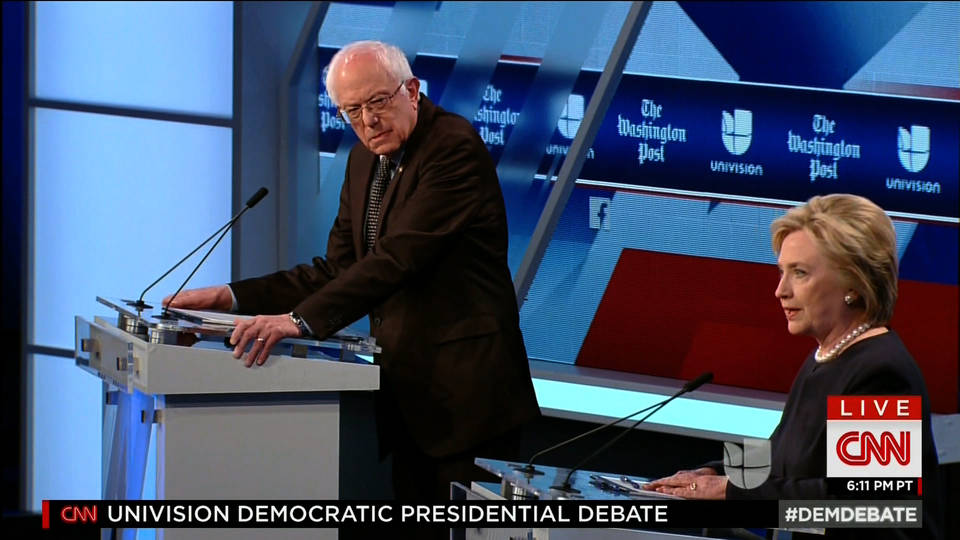
In the 2016 race for the White House, former Secretary of State Hillary Clinton and Vermont Senator Bernie Sanders squared off in a debate at Miami-Dade College in Florida Wednesday night sponsored by the Spanish-language network Univision. The two candidates clashed on issues including immigration, Latin America and healthcare. The debate comes one day after Sanders’ surprise victory in the Michigan primary. We’ll have more on the debate after headlines.
TOPICS:
2016 Election
Donald Trump: "I Think Islam Hates Us"
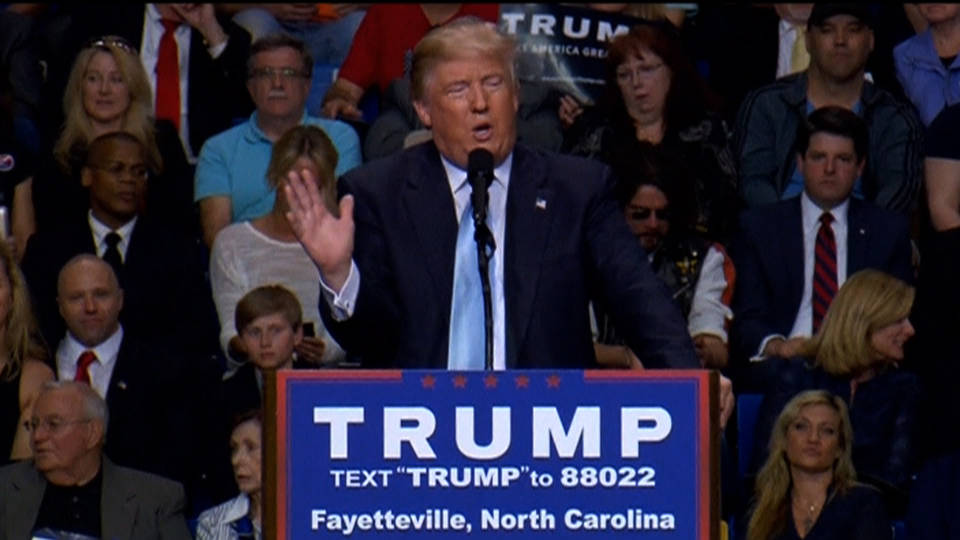
Meanwhile, on the Republican side, the four remaining presidential candidates are slated to square off for a debate at the University of Miami tonight. This comes as front-runner Donald Trump is saying that if he wins the Ohio and Florida primaries next week, "it’s over." Meanwhile, during an interview on CNN, Trump responded to Anderson Cooper’s question of whether Islam is at war with the West.
Donald Trump: "I think Islam hates us. There’s something—there’s something there that—there’s a tremendous hatred there. There’s a tremendous hatred. We have to get to the bottom of it."
TOPICS:
Donald Trump
2016 Election
Protesters Slam DNC Chair for Fighting Payday Lending Regulation
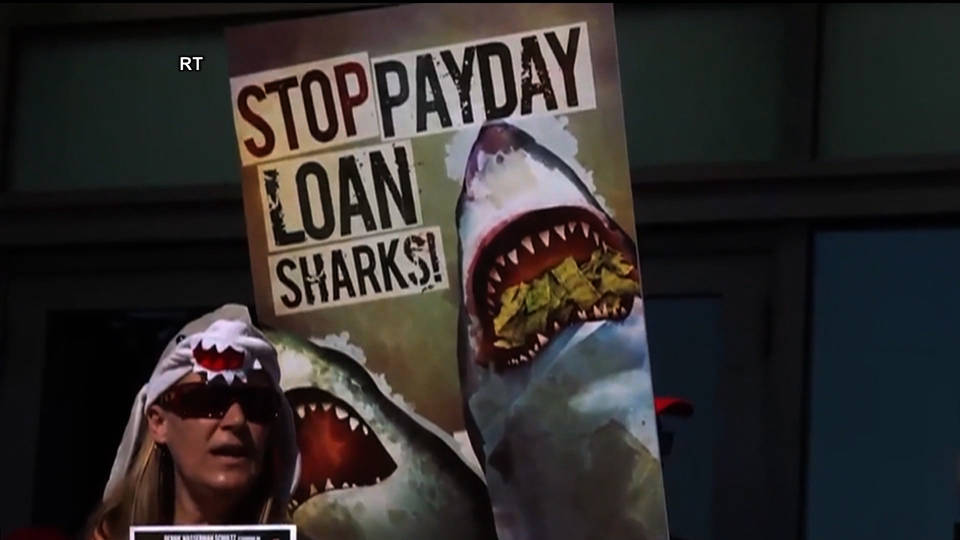
Meanwhile, in Washington, D.C., more than 100 people descended on the Democratic National Committee headquarters Wednesday to protest DNC Chair Florida Congressmember Debbie Wasserman Schultz’s support for a new bill that would gut proposed regulations for payday lenders. The Consumer Financial Protection Bureau is slated to introduce new rules to rein in the notoriously unregulated world of payday lending. But Schultz and other lawmakers are instead sponsoring legislation that would weaken the rules and delay their implementation for more than two years. On Wednesday, a protester spoke out about the predatory nature of the industry.
Protester: "I made my payments, and they offered me to reborrow, and that sent me into a cycle of debt. And that was a trap, because I had to go from one loan place to another to pay off the original loan. And for two to three years I was trapped in this cycle, which is designed purposely by the payday lending companies to keep people coming in for payments. They thrive off of 50 percent defaults of people. They want you to not be able to pay."
TOPICS:
Debt
Iraq: Pentagon Says U.S. Captured ISIL Chemical Weapons Specialist

The Pentagon says it launched two airstrikes last week targeting ISIL’s chemical weapons capabilities, after a captured ISIL chemical weapons specialist reportedly gave the U.S. information about the program. The Iraqi specialist was reportedly captured by U.S. special operations forces in northern Iraq three weeks ago. Unnamed military officials say that the specialist worked for Saddam Hussein’s now-dissolved Military Industrialization Authority before joining ISIL. U.S. officials say he also provided information about how ISIL has used mustard gas during attacks.
TOPICS:
Iraq
Somalia: U.S. Special Operations Raid Kills 19
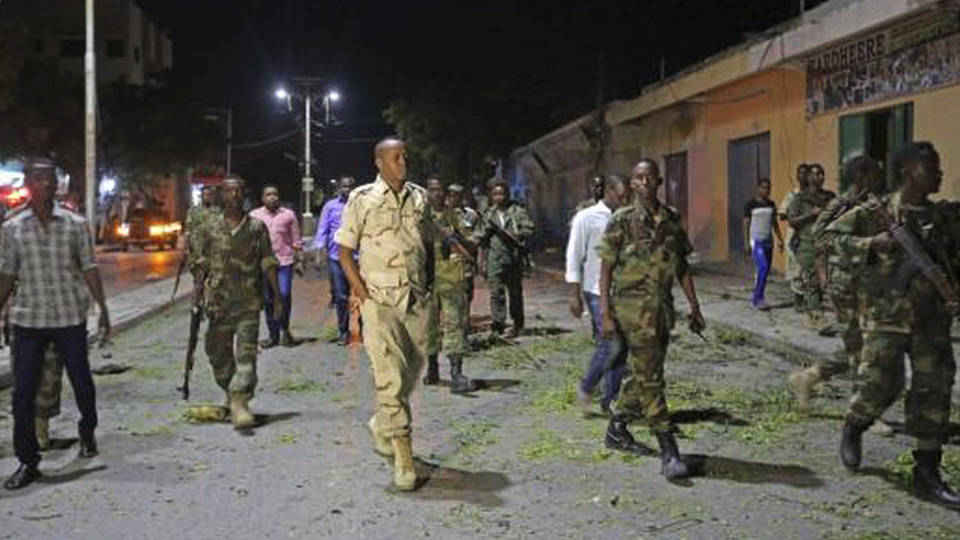
Unnamed officials say U.S. special operations forces and Somali troops carried out another raid at an al-Shabab training camp in Somalia, killing 19 militants. This comes only days after U.S. airstrikes in Somalia killed more than 150 people identified as militants at an al-Shabab training camp, marking one of the deadliest U.S. attacks to date in the so-called war on terror.
TOPICS:
Somalia
U.S. Volkswagen Head Resigns Amid Emissions Cheating Scandal

The U.S. head of Volkswagen has resigned amid the ongoing fallout from the auto giant’s emissions cheating scandal. Michael Horn served as the U.S. chief executive since 2014. This comes about six months after the global head of Volkswagen, Martin Winterkorn, also resigned. The Justice Department has sued German automaker Volkswagen after accusing it of installing devices in its vehicles to skirt U.S. emissions regulations. U.S. regulators say Volkswagen vehicles were emitting up to 40 times more pollution than U.S. standards allow.
TOPICS:
Climate Change
Corporate Power
Balkan Countries Close Their Borders to Refugees
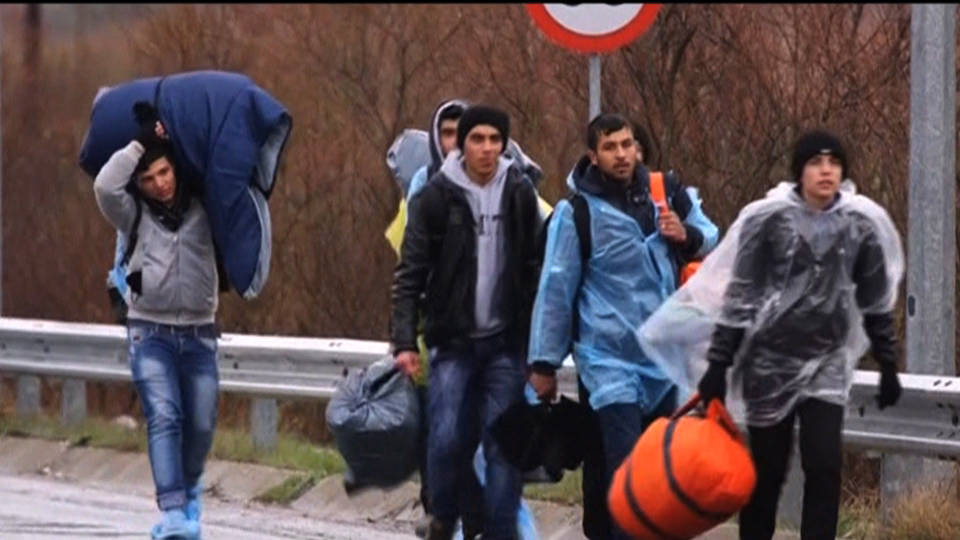
In news from Europe, Macedonia has announced it is closing its border with Greece, only one day after Slovenia announced it was also closing its borders to refugees fleeing violence in the Middle East and North Africa. Croatia and Serbia have said they, too, will block refugees from entering their countries. The series of border crackdowns effectively seals off the Balkan route, which refugees have been using to reach northern European countries such as Germany. German Chancellor Angela Merkel has condemned the border crackdowns.
TOPICS:
Refugees
Venezuela Recalls Top Diplomat in U.S. over Sanctions

Venezuela says it is recalling its top diplomat to the United States following the White House’s decision to extend an executive order imposing sanctions on top Venezuelan officials. The executive order also declares Venezuela a national security threat. The U.S. and Venezuela have not had ambassadorial relations for years.
TOPICS:
Venezuela
Brazil: Former President Lula Indicted on Corruption Charges
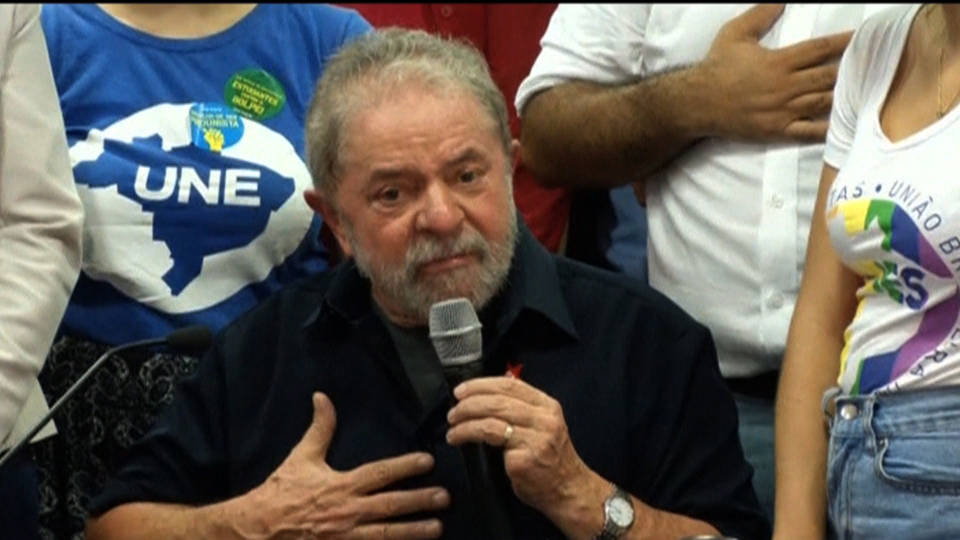
In more news from South America, Brazilian prosecutors have indicted former President Luiz Inácio Lula da Silva as part of an investigation into corruption at the state oil company Petrobras. The growing allegations of a corruption scandal also threaten Lula’s successor, current President Dilma Rousseff, who is fighting off an impeachment attempt related to other charges. Lula says the charges are politically motivated.
TOPICS:
Brazil
France: Thousands Protest Proposed Labor Reforms
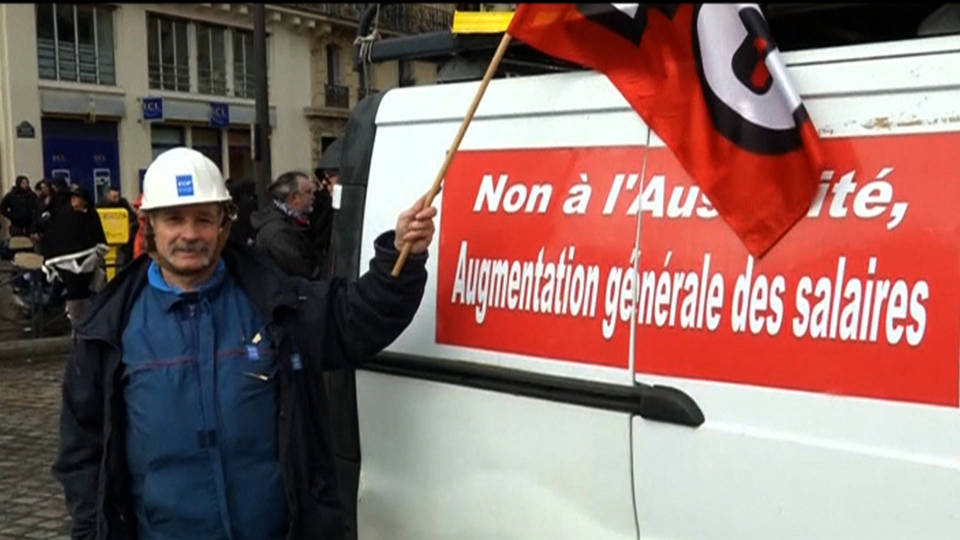
In France, thousands of people took to the streets to protest the French government’s proposed labor reforms, which would lengthen the French work week and make it easier for bosses to fire employees. Despite heavy rain, students and unions flooded Paris’ streets Wednesday. Students also barricaded dozens of schools. The protest coincided with a rail strike, which shut down two-thirds of all trains. Student Juba Zemoul spoke out.
Juba Zemoul: "Already today, we want to make it clear to all students that we are against this law, and show them why we’re against this law. And we want especially to demonstrate to show the government that we are against it and that students, young people, we are all rallying against this law so it does not pass."
TOPICS:
France
Nigeria: Oil Workers Strike amid Fears of Mass Layoffs

Meanwhile, in Nigeria, oil workers staged a nationwide strike Wednesday after the Nigerian government announced plans to restructure the state oil company without having consulted the workers. Nigeria is the largest oil producer in Africa. The proposed restructuring calls for dividing the Nigerian National Petroleum Corporation into multiple parts. Workers say they fear the plan could lead to mass layoffs.
TOPICS:
Nigeria
WSJ: $50 Billion of Fines Paid by Big Banks for Homeowners Pocketed by Fed. Govt.

And The Wall Street Journal has exposed that nearly half of the $110 billion Wall Street banks have paid in settlements in recent years has been pocketed by the federal government—and has not been paid out to homeowners. In recent years, the United States’ largest banks, including Bank of America, Wells Fargo, JPMorgan Chase and Citigroup, have paid billions of dollars to settle charges of financial crimes in the mortgage market in the years leading up to the 2008 housing crisis. Top regulators have lauded the record fines extracted in these settlements by saying the money would help homeowners struggling with their mortgages. Yet The Wall Street Journal’s new investigation shows that while about $45 billion did go to homeowner relief, even more of the settlement money, about $50 billion in total, has been simply pocketed by the federal government itself, with almost no disclosure of how the money is being spent.
Donate today:
Follow:




WEB EXCLUSIVE

The Life and Legacy of Berta Cáceres
COLUMN

"How About an Election Without Polls?" by Amy Goodman and Denis Moynihan
Sen. Bernie Sanders won the Democratic presidential primary in Michigan, defeating Hillary Clinton ... and all the pollsters. Election statistician Nate Silver wrote that Sanders’ Michigan victory “will count as among the greatest polling errors in primary history.” Imagine if we had an election season without polls. Instead, the energy, investigation and money should be spent delving into candidates’ records, whether they’re a businessman like Donald Trump or they’re politicians like Hillary Clinton or Bernie Sanders. This will lead to a better informed, more engaged electorate.
Why should it matter who our neighbors are voting for, or people who live across the state? Let each person make his or her decision on how to vote not on polling numbers, but on the actual positions staked out by the candidates. Primaries, caucuses and Election Day are the ultimate polls. These are the reliable numbers, hard data, on how actual, hopefully well-informed citizens voted. Then the pundits, rather than speculating on how imaginary voters might act, can discuss reality.
It is astounding that Bernie Sanders is where he is today. Look at the Tyndall Report’s summary of Campaign 2016 coverage. Andrew Tyndall has offered an independent daily analysis of the flagship evening news programs on CBS, NBC and ABC since the late 1980s. For the calendar year 2015, Tyndall writes, these networks produced more than 17 hours of reporting on the presidential campaigns. That’s over 1,000 minutes of national broadcast television airtime. Donald Trump received 327 minutes, or close to one-third of all the campaign coverage.
Bernie Sanders received just 20 minutes. Hillary Clinton got 121 minutes of campaign coverage, six times the amount Sanders received. In one striking example of the disparate coverage, “ABC World News Tonight” aired 81 minutes of reports on Donald Trump, compared with just 20 seconds for Sanders.
The commercial networks have an inherent conflict of interest as well. Hundreds of millions of dollars are spent by the campaigns and by countless super PACs, buying advertising time to promote their candidate or issue. The more reporting the networks do, the less the candidates will feel the need to buy ad time to inform potential supporters of their positions. Since television remains the primary source of news for most Americans, this conflict of interest creates a major barrier to an informed public.
The primaries determine the candidates of the two major parties. Put aside for the moment that the almost absolute blackout on reporting on third parties all but guarantees that these candidates, whether from the Green Party or from the Libertarian Party, for example, will have almost no traction in the national elections. Voter turnout in this year’s primary elections has been historically high but, in a real sense, dismally low. The Pew Research Center reports that, in this year’s first 12 primaries, Republicans have turned out 17.3 percent of eligible voters, while Democrats have turned out 11.7 percent. These are record-high numbers, according to Pew, but consider just how low they are: More than 82 percent of Republicans and more than 88 percent of Democrats didn’t vote.
Certainly, new impediments to voting, like requirements to have specific forms of photo identification, decrease participation. Indeed, some argue, many new laws were designed specifically to deter participation of poor people and people of color in the electoral process, thus favoring Republican candidates. “We always do well when the voter turnout is high,” Sanders said at a large campaign rally on Tuesday night in Miami, before learning of his victory in Michigan, “and we do poorly when the voter turnout is low.”
Networks generally have a policy of not releasing exit-polling data until polls close in order not to discourage voters from participating. Exit polls might indicate that a candidate is trailing or far ahead, and people might then feel that their vote wouldn’t make a difference. We should extend this policy to the entire election.
We need a vigorous debate in the country about war and peace, the growing inequality between the rich and the rest of us, about immigration, education, mass incarceration, racism and so much more. And we need an engaged electorate, empowered by information and enabled to vote. Our democracy demands no less.
WORK WITH DN!
Broadcast Engineer
Director of Finance and Operations
Director of Development
---------------------
Democracy Now! Daily Digest: A Daily Independent Global News Hour with Amy Goodman & Juan González for Wednesday, March 9, 2016
democracynow.org
Stories:

Bernie or Hillary? Cornel West & Dolores Huerta Debate After Sanders' Upset Win in Michigan
In the most shocking upset of the 2016 presidential campaign to date, Vermont Senator Bernie Sanders defeated Hillary Clinton in the Michigan primary. Sanders won 50 percent of the vote to Clinton’s 48. During the campaign, Sanders focused heavily on his opposition to what he called "disastrous" trade deals like NAFTA which have hurt Michigan’s manufacturing sector. Opinion polls had projected Clinton would easily win the state by as much as 20 percent. We speak to professor Cornel West, who backs Sanders, and legendary civil rights activist and labor organizer Dolores Huerta, who backs Clinton.
TRANSCRIPT
This is a rush transcript. Copy may not be in its final form.
JUAN GONZÁLEZ: In the most stunning upset of the presidential campaign to date, Vermont Senator Bernie Sanders defeated Hillary Clinton in the Michigan primary. Sanders won 50 percent of the vote to Clinton’s 48 percent. During the campaign, Sanders focused heavily on his opposition to what he called "disastrous" trade deals like NAFTA which have hurt Michigan’s manufacturing sector.
Opinion polls had projected Clinton would easily win the state by as much as 20 percent. On Tuesday afternoon, Nate Silver’s popular polling site FiveThirtyEight.com predicted Clinton had a greater than 99 percent chance of winning the Michigan primary. But late last night, Silver wrote that Michigan would, quote, "count as among the greatest polling errors in primary history."
AMY GOODMAN: Despite Bernie Sanders’ upset in Michigan, Hillary Clinton ended up winning more delegates Tuesday thanks to a lopsided win in Mississippi, where she won 83 percent of the vote. Clinton now has 760 pledged delegates to Sanders’ 546. In addition, Clinton has secured support from an overwhelming number of unelected superdelegates made up from the party establishment, though they could change their allegiance at any point. Sanders gave an impromptu news conference outside a hotel in Miami last night, before he learned of the results in Michigan.
SEN. BERNIE SANDERS: I just want to take this opportunity to thank the people of Michigan, who kind of repudiated the polls that had us 20, 25 points down a few days ago, who repudiated the pundits who said that Bernie Sanders was not going anywhere. ... And what tonight means is that the Bernie Sanders campaign, the people’s—the revolution, people’s revolution that we are talking about, the political revolution that we are talking about, is strong in every part of the country. And frankly, we believe that our strongest areas are yet to happen. We’re going to do very, very well on the West Coast and other parts of this country.
What the American people are saying is they are tired of a corrupt campaign finance system and super PACs funded by Wall Street and the billionaire class. They are tired of a rigged economy in which people in Michigan, people in Illinois, people in Ohio are working longer hours for low wages, worried to death about the future of their kids, and yet almost all new income and wealth is going to the top 1 percent. And the people of America are tired of a broken criminal justice system, in which we have more people in jail, largely African-American, Latino, Native American—more people in jail than any other major country on Earth.
So, we started this campaign, as many will remember, 10 months ago. We were 60 or 70 points down in the polls. And yet we have—what we have seen is, in poll after poll, state after state, what we have done is created the kind of momentum that we need to win.
JUAN GONZÁLEZ: Hillary Clinton spent the evening in Ohio, which also holds a primary on Tuesday. She addressed supporters before the results of Michigan came in.
HILLARY CLINTON: I want to talk about what working families are up against across the country. I want to talk about how we have a new bargain, so you can get ahead and stay ahead in every—in every industrial city, small town, farm country, Indian country, every community that’s been hollowed out by lost jobs and lost hopes. Don’t let anybody tell you we can’t make it in America anymore. We can, we are, and we will. But in order to do that, we can’t be talking about building walls or turning the clock back. We have to build on what made America great in the first place: our energy and optimism, our openness and creativity.
AMY GOODMAN: We’re now joined by three guests.
Here in New York, Cornel West, professor at Union Theological Seminary, has endorsed Bernie Sanders for president last summer. He’s author of a number of books, most recently, Black Prophetic Fire.
Dolores Huerta joins us from San Diego, California, civil rights activist, co-founder of the United Farm Workers of America with Cesar Chavez, president of the Dolores Huerta Foundation for community organizing. Dolores Huerta has endorsed Hillary Clinton for president.
And in Los Angeles, we’re joined by Melina Abdullah, an organizer with Black Lives Matter, which has not endorsed any presidential candidate. She is also a professor and chair of Pan-African Studies at California State University in Los Angeles.
We welcome you all to Democracy Now! Well, Dr. Cornel West, we’re going to begin with you, because, at least for the pollsters, this is a stunning upset.
CORNEL WEST: Yes.
AMY GOODMAN: I have to say, I think even Bernie Sanders was surprised. I have never seen him alone like that, just standing against a wall holding a news conference for the press, spoke for a few minutes. He didn’t yet know the primary results. It seemed to be coming a few minutes later. You were with him in Michigan this weekend.
CORNEL WEST: No, it’s true, we had no idea that we would have this kind of upset. We knew that we were going to fight based on integrity, based on principle. We know that we’re in a moment where we’ve got a neofascist in the making with Trump; we’re trying to bring neoliberalism to a close; we’ve got a neopopulist, a genuine populist, in Sanders; and Hillary Clinton is a neoliberal, but she poses as a progressive. And so there’s a sense in which we know that Bernie Sanders is the one to beat Trump. And that’s crucial, because we’re at a very, very deep moment in this country.
And I want to salute you all, because the corporate media has produced Trump, in a fundamental way—every minute he’s covered, every second he’s covered. Bernie Sanders hardly gets covered at all, but he has the same number of people following. Hillary Clinton gets covered more than Bernie but not as much as Trump. So, in that sense, I think we’ve got some real work ahead.
AMY GOODMAN: Last night, Trump—
CORNEL WEST: But I’ve got a smile on my face.
AMY GOODMAN: CNN and MSNBC—I’m not talking about Fox—
CORNEL WEST: Yes.
AMY GOODMAN: CNN and MSNBC both ran the entire extended news conference that Donald Trump held.
CORNEL WEST: It’s a shame. They’re making money. They want to make money.
AMY GOODMAN: Now, Hillary Clinton actually spoke midway through Trump speaking. Usually, they switch from one to another.
CORNEL WEST: Right.
AMY GOODMAN: Here they held the tape of Hillary Clinton to run the entire extended news conference of Trump in Florida.
CORNEL WEST: No, I mean, I think it’s a very sad affair. But I’m also very sad that black America is not waking up in the way in which we should. We’ve got a spiritual rot and a moral cowardice in our neoliberal black political class and our neoliberal black intelligentsia, who don’t want to tell the truth about the underside of the Hillary Clinton campaign. And the underside really has to do with not just the Clinton machine and all of its corruptions and so forth, but, more importantly, the policies, the trade policies, the prison—the mass incarceration regime, the deregulating of the banks and so forth. But Brother Bernie is hitting this head on. It’s difficult for Hillary to somehow act as if she’s such a populist, when she’s been a centrist for so long.
JUAN GONZÁLEZ: And, Cornel, one of the things about the Michigan primary, in particular, was that since it was an open primary, that meant that independents could vote, not just Democrats.
CORNEL WEST: Yes, that’s right.
JUAN GONZÁLEZ: And some of the speculation is that at the last moment a lot of independents decided, "Well, let me go into the Democratic primary and vote for Bernie"—
CORNEL WEST: I think that’s true.
JUAN GONZÁLEZ: —which is a sort of an indication of where—because the electorate in the United States is pretty much divided one-third Democrat, one-third independent, one-third Republican.
CORNEL WEST: That’s true. That’s true.
JUAN GONZÁLEZ: Where the independents are going?
CORNEL WEST: But I think given the class issues that Brother Bernie and all of us are trying to push, in Michigan, the class issues make a big difference. It’s generational, and it’s ideological. And it’s a beautiful thing to see.
JUAN GONZÁLEZ: Well, I’d like to bring in Dolores Huerta, longtime civil rights activist, co-founder of the United Farm Workers of America. Your sense of what happened yesterday in these primaries and why you think it’s so important for Democrats and others to vote for Hillary Clinton?
DOLORES HUERTA: Well, I think one thing is that we seem to put a lot of blame on Hillary for things that Bill Clinton did in the Clinton administration, which I don’t think is right. I think the other thing, too, is that I know that Bernie’s got a very strong message—I respect him very much for his message that he’s bringing about the inequality in our economic system—but Bernie knows, as he’s been in the Congress for 26 years, that we also have to have a Congress to be able to bring to fruition some of the great ideas that he’s put forth. I do believe that Hillary Clinton—I do have a lot of faith in her, and I think she’s got the skills, she’s got the wisdom. You know, she’s got the experience to make things happen. When we compare the records of the two candidates, we see that Hillary Clinton’s record is much, much stronger than Bernie Sanders’ is. And I do believe that what Bernie is saying and what he wants to happen—and I believe in many, many of the ideas that he’s put forth, but I think it will take time, and we’ve got to really elect a good Congress. You know, people forget—and I—the Affordable Care Act, that when that passed the Congress, it only passed with four or five votes, even though we had a 25 Democratic majority at that time.
And I have to say that in terms of the Latino community, we are completely in support of Hillary, simply because Bernie just hasn’t been there for the Latino community. You know, he had a really good opportunity in 2007, when Senator Ted Kennedy, Hillary Clinton, Senator Durbin from Illinois—when they proposed a good immigration reform bill. And we had all of the momentum behind us at that time, because we had had all of these marches all over the country for immigration reform. And Bernie, unfortunately, came out against that bill. And that was very sad that he did that. And what he has said repeatedly is that he came out against the bill because it had the guest worker program in it. Well, wait a minute. When we passed the amnesty bill in 1986, we had guest workers in that bill, with protections—protections for the farmworkers, protections for the domestic workers. The bill that he voted on in 2013 also had the guest worker program in it. So I think he just wasn’t paying attention at that time, and I think we lost a great opportunity.
So, again, I believe in Bernie’s message, and I think we can make it happen. I think it’s going to have to be an evolution rather than a revolution. And I think all of us that are on the left and working people are going to be able to make it happen.
The other thing I want to point out, when we look at Hillary’s victories, especially in the South, they’re like 70 to 30, 70 percent to 30 percent. But we see the places that she has—where she has lost to Bernie Sanders, it’s in single digits, whereas where she is winning, where Bernie’s at, it’s actually two to one. So, I do have a lot of faith in Hillary Clinton. And I do believe that she will make a very, very strong president, because she is a very strong woman.
JUAN GONZÁLEZ: And, Cornel, I want to go to what Dolores mentioned about this issue of revolution, because, really, given the nature of Washington today with these huge Republican majorities in the House and the Senate, isn’t Bernie Sanders, to some degree, selling the idea of revolution, that he cannot deliver unless there’s a fundamental change in the Congress, as well?
CORNEL WEST: Well, Juan, I just salute Sister Dolores. She’s my dear sister. I just think she’s wrong. I think that it’s very difficult to have faith in a Hillary Clinton when she receives money from the GEO, which sustained the detention centers for precious immigrants, incarcerated them unjustly. I don’t see how one could make the case that somehow you’ve got a candidate that has the kind of integrity that we want. There is no doubt indeed that Bernie Sanders can win, because he recognizes he’s a politician that needs a social movement behind him. He is a thermostat: He shapes the climate. Hillary is a thermometer: She just registers and reflects the climate. We need somebody who’s shaping, the way that Occupy shaped the discourse around wealth inequality, the way Black Lives Matter has shaped the discourse around the vicious legacy of the white supremacy as it related to the repressive apparatus of the nation-state in regard to this trigger-happy policing going on with our precious young brothers and sisters.
DOLORES HUERTA: Well, I believe that Hillary has already come out for prison reform, and I think that she actually could help make that happen. And I think a lot of us that are out there, including yourself, Cornel, my dear brother—
CORNEL WEST: My dear sister.
DOLORES HUERTA: —whom I love dearly—I love you dearly.
CORNEL WEST: And I love you dearly, too, my sister, indeed, indeed.
DOLORES HUERTA: —we will be out there. You know, we will be out there organizing to make sure that some of these reforms will happen. I think we have—you know, when we compare our Democratic candidates to our Republican candidates, I think we can be so grateful that we have intelligent people that are running for the presidency. And I know—whichever of them wins, I know we’re going to have a good presidency. The one other thing I want to point out is that we have the Republicans that are putting a lot of money into Bernie’s campaign, to his independent campaigns, to make sure that they can defeat Hillary Clinton, because they figure that it will be easier to defeat Bernie than it will be to defeat Hillary Clinton in November.
CORNEL WEST: No, no. The polls say Bernie does better against Trump than Hillary does. But I know you want to get—
DOLORES HUERTA: Well, we’ll see.
CORNEL WEST: We’re going to get our other sister in here. We want to get our other sister in here.
WATCH MORE OF CORNEL WEST & DOLORES HUERTA
Bernie, Hillary or Revolution in the Streets? Cornel West, Dolores Huerta & Black Lives Matter Debate

"We Are Pushing Real Revolution": Black Lives Matter on Why They Don't Have Faith in Any Candidate
Black Lives Matter activists have helped make racial injustice and police brutality key issues in the 2016 presidential campaign. But Black Lives Matter has decided not to endorse any presidential candidate. We speak with Black Lives Matter organizer Melina Abdullah. "We’re not telling people not to vote, we’re simply not endorsing any presidential candidate," Abdullah says. "We’re pushing the real revolution. We know that the revolution won’t come at the ballot box."
TRANSCRIPT
This is a rush transcript. Copy may not be in its final form.
AMY GOODMAN: Professor Melina Abdullah, you are—you are one of the founding members of the Black Lives Matter movement. The movement has decided not to endorse any presidential candidate. Why not?
MELINA ABDULLAH: So I think there’s three reasons why we’re not endorsing any candidate. The first is that neither Bernie Sanders or Hillary Clinton have a strong command of the particular issues related to race in the specificity of black oppression. Neither have been willing to really invest the time or energy to develop plans that really get black folks free. So, we don’t have a whole lot of faith in either of the Democratic candidates. And absolutely, we don’t have any faith in Donald Trump, or Drumpf or whoever he is. So, it’s the candidates.
But then the second thing is the confines of the two-party system. We recognize that both the Democratic Party and the Republican Party are controlled by monied interests. And as much as Bernie Sanders and, to a lesser degree, Hillary Clinton have kind of pushed back against that idea that they’re controlled by money, and Bernie Sanders has kind of identified with socialism, still we know that the Democratic Party and the Republican Party are built to entrench themselves. So no matter what the candidates attempt to do, being controlled by the two-party system is hugely problematic and is disempowering and oppressive to black people.
And then the third reason is, when we think about what democracy is, democracy being rule by the people, we need to really kind of redefine what that means and break away from this notion that the only way of being democratic is engaging in electoral politics. And we’re not telling people not to vote, we’re simply not endorsing any presidential candidate, recognizing that where we want to put our time and energy is in the development of people to act in their own interests and on their own behalf. And so, we are pushing the real revolution. We know that the revolution won’t come at the ballot box and the revolution won’t be televised. The revolution will be on the ground, when the people rise up and demand something better, something more imaginative and something more visionary.
AMY GOODMAN: Professor Melina Abdullah, Dr. Cornel West and civil rights leader Dolores Huerta, we’re going break, come back to this debate. And at the end of the broadcast, we’ll go to Washington to speak with a reporter who covered the secret Sea Island meeting. That’s the Georgia meeting of high-tech CEOs like the head of Google, like the head of Apple, Karl Rove and others, as well as the publisher of The New York Times, gathering together to talk about how Trump can be stopped. Stay with us.
[break]
AMY GOODMAN: That’s Fannie Lou Hamer, "This Little Light of Mine." This is Democracy Now!, democracynow.org, The War and Peace Report. I’m Amy Goodman, with Juan González. Our guests to debate the Democratic side of this presidential race are the legendary farmworker leader Dolores Huerta, joining us from San Diego—she’s about to get on a plane; Professor Melina Abdullah of California State, representing the Black Lives Matter movement; and Professor Cornel West, now of the Union Theological Seminary, before that, Princeton, before that, Harvard, before that, Princeton—a very interesting trajectory of his life—author of many books. He’s representing Bernie Sanders. Juan?
JUAN GONZÁLEZ: Yeah, I wanted to turn to a comment that Senator Bernie Sanders made at Sunday’s debate in Flint, Michigan, when he was asked about his racial blind spots.
SEN. BERNIE SANDERS: When you’re white, you don’t know what it’s like to be living in a ghetto, you don’t know what it’s like to be poor, you don’t know what it’s like to be hassled when you walk down the street or you get dragged out of a car. And I believe that as a nation in the year 2016, we must be firm in making it clear: We will end institutional racism and reform a broken criminal justice system.
JUAN GONZÁLEZ: Melina Abdullah, I’d like to ask you about this, because it seems to me that what we’re seeing here among the Democratic candidates is a replay of a long-standing battle in the left or progressive movement in America that the—if you address the class struggle, racial conflicts will be dealt with, which seems to be a lot of the direction of Bernie Sanders. But there’s another perspective in the left that has always said, no, there’s a national—or, racial and class struggle, and they may be connected, but you’ve got to address the specificity of racial and class—racial oppression in the United States, separate and apart from the class struggle. I’m wondering your response to Bernie Sanders’s comments?
MELINA ABDULLAH: Right, absolutely. So, there are intersections between race and class. And, you know, Professor West writes extensively about this. Manning Marable wrote extensively about these intersections. And so, we absolutely need to address questions of class, questions of the economic system. At the same time, when we think about the specificity of blackness, black folks wind up at the bottom of every single economic measure, from employability to household income to wealth. And so, we need a plan. We need our candidates and we need our leaders to have specific plans that deal with race, on a whole, and the specifics of blackness.
And so, I think that there was some clumsiness with what Bernie Sanders had to say. I think that it’s clear that he’s being pushed, and I think some of the push is probably coming from someone I respect a great deal, Dr. West. Some of the push is also coming from the folks on the ground. So when we think about Black Lives Matter activists as interrupting and engaging Senator Sanders, I think that we see some push happening. At the same time, we see him not being there yet. And so, we need to develop a plan that really deals with the specifics of blackness—black jobs, black employability, moving forward black wealth. I know Senator Sanders also has had some questions around reparations posed, where he didn’t have what we see to be a satisfactory answer.
AMY GOODMAN: Your response to that, Professor?
CORNEL WEST: No, I think my dear sister is very fair, and I’m going to be with her in the streets, and I’m going to be with her when we go to jail, because there’s a social movement side of this thing, and then there’s electoral politics, on the other hand. But I think the important thing to keep in mind is there will be no black freedom unless there is economic equality, unless Wall Street has some regulation, unless there’s a redistribution of wealth downward.

Tech CEOs & Republican Leaders Met Last Weekend to Plot to Stop Donald Trump
As Donald Trump won three out of four states on Tuesday, Republican efforts to derail his candidacy are increasing. The Huffington Post has revealed leading establishment Republican political figures met with top GOP donors at a secretive meeting this past weekend at the American Enterprise Institute’s annual World Forum on a private island resort off the coast of Georgia. Attendees of the event included Apple CEO Tim Cook, Google co-founder Larry Page and Facebook investor Sean Parker, as well as Senate Majority Leader Mitch McConnell, political operative Karl Rove and House Speaker Paul Ryan. The main topic of the weekend retreat: How to stop Trump. We speak to Nick Baumann, senior enterprise editor at The Huffington Post.
TRANSCRIPT
This is a rush transcript. Copy may not be in its final form.
JUAN GONZÁLEZ: In the Republican race, Donald Trump won three more states on Tuesday: Michigan, Mississippi and Hawaii. Texas Senator Ted Cruz won Idaho. In the Michigan race, Trump won 37 percent of the vote, Cruz placed second with 25 percent, Ohio’s John Kasich placed third with 24 percent. Florida Senator Marco Rubio placed no better than third in any race yesterday and ended the day without gaining a single delegate. Donald Trump spoke last night at the Trump National Golf Club in Jupiter, Florida.
DONALD TRUMP: Many people have called it a movement. And part of that movement is what I said before. I mean, it’s the people want to be involved. So when Chris called and when Sarah Palin called and when Jerry Falwell Jr. called and when Joe Arpaio called—I mean, you know when Joe Arpaio of Arizona calls, that Trump is tough on the border. OK?
AMY GOODMAN: That was Donald Trump in Jupiter. His three victories on Tuesday come as the mainstream Republican establishment is increasingly organizing to try to thwart him from winning the party nomination. The Huffington Post has revealed leading establishment Republican political figures met with top GOP donors at a secretive meeting this past weekend at the American Enterprise Institute’s annual World Forum on a private island resort off the coast of Georgia. Attendees of the event included Apple CEO Tim Cook, Google co-founder Larry Page, Facebook investor Sean Parker, as well as Senate Majority Leader Mitch McConnell, political operative Karl Rove and House Speaker Paul Ryan. The main topic of the weekend retreat? How to stop Trump.
For more on the secretive gathering, we’re joined by the man who reported it, Nick Baumann, senior enterprise editor at The Huffington Post. His latest piece is headlined "At Secretive Meeting, Tech CEOs and Top Republicans Commiserate, Plot to Stop Trump." This comes as a leading establishment Republican political figures—so, we’re going to turn right now to Nick Baumann.
Nick, talk about the significance of what happened yesterday—Donald Trump won three of the four primaries and caucuses, Ted Cruz won one—and what happened at Sea Island.
NICK BAUMANN: So, Donald Trump continues to rack up delegates, and that’s sort of at the heart of the race for the Republican nomination. Marco Rubio, who’s, you know, a favorite of the establishment at this point, out of the remaining candidates, may not win any delegates from last night’s contest. And I think the establishment is having this sort of confused moment where they’re partially trying to come to terms with Trump being the nominee and they’re also trying to figure out if there’s a way that they can get out of making Trump the nominee.
And so, Sea Island, this is an annual conference that the American Enterprise Institute, a conservative think tank, holds. It’s been at Sea Island for the past few years, but it’s been going on for decades. It was actually started by former President Gerald Ford, or conceived by him. And this year, like in past years, it attracts, you know, the very elite members of the Republican establishment, also big economic names from the Democratic political establishment—Larry Summers was there—and CEOs—
AMY GOODMAN: Wasn’t the publisher of The New York Times there, Nick?
NICK BAUMANN: Yeah, Arthur Sulzberger was there.
JUAN GONZÁLEZ: And also, you reported Lawrence Lessig of Harvard University was also there?
NICK BAUMANN: And Lawrence Lessig was there. He was involved in a presentation. And, you know, this is one of those conferences where there are a bunch of different topics discussed, but our reporting suggests that the main—the main focus of the weekend and what was on the tip of everyone’s tongue was, you know, what’s going on with Trump, and how do we stop him? I’m not sure that they really came up with a good way to do that, but it’s certainly something that was—that people were really discussing and worried about.
AMY GOODMAN: You followed the planes that came in and out. These are the private planes. Talk about how you pieced together who was there and their significance.
NICK BAUMANN: Yeah, so part of our reporting was talking to people who were there or people who talked to people who were there, both of those things, and then part of it was looking at Federal Aviation Administration records. Sea Island is pretty inaccessible. It’s about 80 miles from Jacksonville and 80 miles from Savannah, Georgia. It’s not near any major airports or major cities, but there are two small airports near there. And there were 54 private jets or private planes that took off from a small airport near the island on Sunday alone. That’s about four times as many as took off the previous weekend. So you really have some very wealthy and influential people coming to this conference.
AMY GOODMAN: Role of Karl Rove, Nick? The role of Karl Rove?
NICK BAUMANN: Yeah, so Karl Rove was there, and he actually gave a closing—a closing session at the conference. We now have the agenda available on our website. And he gave a closing session that was focused on—the agenda doesn’t actually reveal the details of it, but it does reveal the title, which is—it’s about William McKinley. And McKinley, of course, defeated a populist presidential challenger. And so we thought that was pretty interesting that that was the focus.
JUAN GONZÁLEZ: And I’d like to ask Cornel West, your reaction—we’ve got about a minute and a half left—to this secretive meeting just this past weekend of key members of the American ruling class about what to do about this election?
CORNEL WEST: I think it’s embarrassing when you have a neofascist as the public face of your major party, the Republican Party. But it’s a party that’s been captive to big banks and big corporations. It’s been a party that has condoned and permitted xenophobia against precious Mexicans, precious Muslims, gays and lesbians, black people. And you have hawkish foreign policies. When you get all three together, Trump is a culmination. He just happens to have this narcissistic personality out of control, and the media loves it, corporate media, because they make big money on it.
But the response can’t be milquetoast neoliberal Hillary Clinton. She doesn’t have what it takes to deal with the enthusiasm of a Donald Trump. You have to have the enthusiasm of a genuine populist. And keep in mind, I’m a democratic socialist. My brother Bernie, he’s a genuine populist. He’s not calling for the nationalizing of industries. He’s not calling for the curtailing of private property. He is a genuine populist. He can win.
AMY GOODMAN: Do you see the Democratic establishment dealing in any way with Sanders in a similar way?
CORNEL WEST: Well, they’re running scared now as a result of Michigan. That’s why I got a smile on my face.
AMY GOODMAN: Where are you heading off to campaign with him next?
CORNEL WEST: I’m headed off to Chicago. We’re going to follow him all the way to the White House. When we get to the White House, we’re going to say, "We’ve got a president tied to the people." The people continue to put pressure, because he’s got corporate interests coming at him. He’s going to hit white supremacy, male supremacy, homophobia. And most importantly, he’s going to call into question some of the American imperial policies, the issues of empire.
AMY GOODMAN: We’re going to leave it there. I want to thank Nick Baumann, senior enterprise editor at The Huffington Post. We’ll link to your piece, "At Secretive Meeting, Tech CEOs and Top Republicans Commiserate, Plot to Stop Trump." And Professor Cornel West of Union Theological Seminary.
That does it for our broadcast. We have three job openings at Democracy Now!; check our website, democracynow.org: broadcast engineer, director of finance and operations and director of development.

Bernie, Hillary or Revolution in the Streets? Cornel West, Dolores Huerta & Black Lives Matter Debate
We continue our conversation on the 2016 race with a discussion between Dolores Huerta (a backer of Hillary Clinton), Cornel West (a backer of Bernie Sanders) and Melina Abdullah of Black Lives Matter. We talk about the candidates’ stances on Israel, campaign finance, “superpredators,” trade policy and more.
TRANSCRIPT
This is a rush transcript. Copy may not be in its final form.
CORNEL WEST: So the class issue is fundamental, but it doesn’t fully grasp not just race, not just gender, not just sexual orientation, but also empire. You see, when I hear Hillary Clinton say that she—she loves children, and you’ve got 550 Palestinian children killed in 51 years, and she—51 days, and she can’t say a mumbling word. Bernie Sanders gave a speech. He said, "The Israeli Defense Forces went too far. I stand on this, and I’m not going to meet with the Israeli prime minister." Now, he’s saying this as a Jewish brother. That takes courage in the face of the powerful forces coming at him. Hillary Clinton, she’s hawkish, she’s right-wing, she’s imperial in her orientation. That’s very important.
AMY GOODMAN: Dolores Huerta, your response?
DOLORES HUERTA: Well, I have to say that Hillary Clinton stood up to Netanyahu when they were going to be extending some of the housing in the West Bank. So, I believe that Hillary is very strong. And I really don’t believe she’s all those things that Cornel just that. Excuse me to differ with you on that, brother.
CORNEL WEST: No, that’s fine, my sister.
DOLORES HUERTA: But the other thing, too, about Hillary, you know, Hillary came down into the Rio Grande Valley of Texas when she got out of law school. She could have gone to some corporation. She went down there into South Texas, with the poorest people of Mexican descent down there, to register voters door to door. I first met Hillary Clinton when she invited me to the White House when she was the first lady—myself and a group of women of color. And she said, "I want to know what the issues are in your community." She has been down there. This is why we’ve got so much respect for her. And Bernie hasn’t been there. He hasn’t been there. Hillary has—
CORNEL WEST: But so, Dolores—but, you know, at the same time—at the same time—
DOLORES HUERTA: But as—well, let me finish. Let me finish. Let me finish.
CORNEL WEST: Yes, yes, yes. Yes, yes. Yes, yes.
DOLORES HUERTA: OK, let me finish. So, I think that the one thing that we’re kind of leaving out of this conversation is: How did we get here? You know, when we have a system right now where the corporations have unlimited amounts of money to put into election campaigns—
CORNEL WEST: That’s right.
DOLORES HUERTA: —my own son has just—my own son is going to run for Congress. He has been recruited to run for Congress. He is a public interest attorney. We have no money; we’re not wealthy. He worked with the Cesar Chavez Foundation for 17 years before he became his own—it’s his own private practice. How do we raise the money to help get him elected, when you’ve got a limit of $5,400 that anybody can give, any one individual can give, but the super PACs have unlimited amounts of money? So when we’re talking about changing the system, we’ve got to start with public campaign financing. In order to do that, we’ve got to have a good Congress. And please, Black Lives Matter, please vote, because we’ve got to get good—we’ve got to get people like Karen Bass, you know, who represents Los Angeles, people like her. We’ve got to get people like her in the Congress, people like Raúl Grijalva, Ruben Gallego and, hopefully, my son, Emilio Huerta. You know? We’ve got to get good people in the Congress who can change the system.
AMY GOODMAN: Well, Dolores Huerta, you mentioned Black Lives Matter. I wanted to go to that fundraiser in Charleston, South Carolina, where a Black Lives Matter activist named Ashley Williams held a banner up. She had gotten into the meeting. And the banner quoted Hillary Clinton; it said, "We have to bring them to heel." That was the controversial statements that Clinton made in 1996 about some youth whom she called, quote, "superpredators." Williams then confronted Clinton, saying, quote, "I am not a superpredator."
ASHLEY WILLIAMS: I’m not a superpredator, Hillary Clinton.
HILLARY CLINTON: OK, fine. We’ll talk about it.
ASHLEY WILLIAMS: Can you apologize to black people for mass incarceration?
HILLARY CLINTON: Well, can I talk? OK, and then maybe you can listen to what I say.
ASHLEY WILLIAMS: Yes, yes, absolutely.
HILLARY CLINTON: OK, fine. Thank you very much. There’s a lot of issues, a lot of issues in this campaign. [...]
ASHLEY WILLIAMS: I know that you called black youth superpredators in 1994. Please explain your record. Explain it to us. You owe black people an apology.
HILLARY CLINTON: Well, I’ll tell you what, if you will give me a chance to talk, I’ll—I’ll tell you something. You know what? Nobody’s ever asked me before. You’re the first person to ask me, and I’m happy to address it, but you are the first person to ask me, dear. Um, OK, back to the issues.
AMY GOODMAN: That’s Hillary Clinton saying to Black Lives Matter activist Ashley Williams, "You’re the first one to ask me about this," Williams confronting Hillary Clinton at this private fundraiser right before the South Carolina primary. Ashley was then escorted away. Williams says a friend contributed $500 so she could attend the private event. The protest was in response to these comments that Hillary Clinton made while speaking at Keene College in New Hampshire in 1996.
HILLARY CLINTON: They are often the kinds of kids that are called superpredators—no conscience, no empathy. We can talk about why they ended up that way, but first we have to bring them to heel.
AMY GOODMAN: That was—that was Hillary Clinton in 1996. Dolores Huerta, your response?
DOLORES HUERTA: Well, I can say this, that we—when we see how African Americans are voting for Hillary Clinton in overwhelming numbers—we saw that in Mississippi, we saw this in South Carolina, so obviously there are people in the African-American community that respect Hillary Clinton and, like myself, have a lot of faith in what she will be able to accomplish. I think she is a doer. She’s not just a talker; she’s a doer.
And I do believe that she has compassion. I mean, you know, she showed that—she had the first conference for children of color in the United States of America, worried about their health, when she passed the program that got over 8 million children covered under a health program. And this is before Obamacare. So, Hillary is a person that does care about people and about children.
You know, I can say, with my own life, I was a—came up very middle-class, but I went down to Delano to work with farmworkers, you know, went to jail, got beaten up by the police. And you have to kind of sometimes get into people’s shoes to understand what they’re doing. I am with Cornel—you know, five of my grandchildren are Mexican-Afro-American children.
CORNEL WEST: Yeah.
DOLORES HUERTA: And I know what my grandchildren have also had the same experiences of harassment by police, etc.
CORNEL WEST: Absolutely.
DOLORES HUERTA: And so, I know what we’re all living through. And it’s got to change, but it’s going to take all of us to change it.
CORNEL WEST: But, Sister Dolores—
DOLORES HUERTA: And we have to—we have to look at the record of accomplishment. Bernie’s been in Congress for 26 years. And really, we have to think about, during that period of time, I know he passed one bill on veterans, which is kind of like motherhood. But, you know, compare his accomplishments with Hillary Clinton’s.
CORNEL WEST: Number one—
DOLORES HUERTA: Bernie has a really good line, and Hillary is the one that can make it happen.
CORNEL WEST: But, Sister Dolores, Dolores—but, Sister Dolores, you know that that kind of language against precious black youth is not just vicious, it justified the expansion of an ugly prison system, those families that were broken, those folk who they brought in, incarcerated, their lives often destroyed. So it is not just a matter of speech and having a conference; we’re talking about a language tied to actual policy. Same is true with welfare in 1996. We were there together. They pulled the rug from under poor people. That was Hillary giving speeches for that, too. And they had what? A black woman, when Clinton’s signing the bill, doing what? Falling right into the demonizing and vilification of black women. And you say, "Well, black people are voting for them." But black people often vote against their interests following a "misleadership class"—the wonderful language of Glen Ford and the others.
So we have to be honest, just at the level of morality and spirituality, since we’re both—we’re both religious, too. And that’s why I can’t see Hillary having the kind of integrity and conviction Bernie Sanders, one of the reasons why he has trouble in Congress is, Congress is site of legalized bribery and normalized corruption. So you don’t have integrity in Congress. That’s why you’ve got 8 percent of Americans who approve of Congress. They don’t have the truth telling. They don’t have the justice witnessing that one would want. Bernie Sanders does. He cuts against that grain.
And now that we’ve won in Michigan, we’re going to turn this corner. We’re going to bring the neoliberal era to a close, my sister. We’re going to fight the neofascism of Trump in the name of neopopulism. And we’re going to invite you to get on the Bernie Sanders love train.
JUAN GONZÁLEZ: Well, but before we get on the love train, I have to say that if Bernie—if Bernie gets nominated, we’ll get to see the real attacks that will come—
CORNEL WEST: And we are ready. We are ready, I’m telling you.
JUAN GONZÁLEZ: —that will come against him. At this point—at this point, the attacks have concentrated mostly on Trump right now.
CORNEL WEST: Yeah, well, that’s true.
JUAN GONZÁLEZ: But there will be a whole different situation starting in September. But I’d like to bring Melina Abdullah into this conversation.
CORNEL WEST: Yes.
JUAN GONZÁLEZ: In terms of the appeal that Dolores Huerta has made to Black Lives Matter to please get involved in voting, if not—even if not at the presidential level, there’s also all of this congressional and Senate races that are up and coming, that will really determine what any president will be able to do. Your response to Dolores Huerta?
MELINA ABDULLAH: So, I think we have a great deal of respect, of course, for Dolores Huerta, as well as Dr. West. It’s really important that we understand what Black Lives Matter is saying. We’re saying that no candidate deserves our endorsement. That does not mean that we’re telling people to stay home. And so, it’s really kind of a personal decision. Some people will go to the polls and vote for something else. Maybe they won’t vote for the president. Maybe they won’t vote for a Democrat or a Republican for president.
The most important thing for us, though, is not to overinvest in the electoral system. And I think that the dismissal at the end of that engagement that Hillary Clinton had for Ashley Williams, when she said, "Go run for something," I think is indicative of an overinvestment in an electoral system that simply does not work for us. Real change, transformative change, the kind of fundamental change that will undo a prison-industrial complex, that will undo an educational system that keeps us miseducated and undereducated, that will undo a system of policing that brutalizes and occupies black and brown neighborhoods, will come from people engaging on a street level.
And so, yes, we have to push elected officials. We have to absolutely engage the system that is. We have to disrupt the system that is. And then we have to fiercely love our own communities and understand our own power, understand that the kind of change that freed us from slavery, that brought about civil rights, that brought black power, that brought ethnic studies, which is now under attack, came from people organizing themselves. The kind of change that Dolores Huerta was involved in with the farmworkers movement—right?—was about getting farmworkers to understand their own power. So we’re not telling people to stay home. And much more so, we’re telling people to do more than vote, to get out into the streets, to join us, to do what Kwame Ture said: "Organize! Organize! Organize!" And remember that you can’t just go to the polls. We have to be out in the streets.
AMY GOODMAN: Interestingly, most people are staying home. Now, I hate to rain on anyone’s parade, but even with all of the attention, looking at Pew Research on who’s coming out to vote, through the first 12 primaries of 2016, combined Republican turnout has been 17.3 percent of eligible voters, and that’s the highest number since any—of any year since 1980. Only 17.3 percent of the eligible voters. Democratic turnout so far is 11.7 percent. That means, you know, close to 90 percent are not participating, the highest since 1992 with the notable exception of the extraordinarily high turnout in 2008. Now, in Michigan, Democratic vote was up, and certainly Republican vote was up. But that shows you how low it has been. Most countries, vast majority of people vote in the industrialized world. In the United States, if we have half the people voting—and these numbers are 17 percent of Republicans, 11 percent of Democrats.
CORNEL WEST: No, it’s a sign of the democracy that’s anemic. It’s a sign that people just know the system is rigged. It’s a sign that they know big money dictates and shapes the destiny of the government and the society. Unfortunately, the dominant response is one of staying away rather than trying to participate and reshape it. So we can understand, in a certain sense, the apathy, but the apathy is in no way justified. We’ve got to participate, not just in the ballot box, but, as Sister Melina says, we’ve got to hit the streets. We’ve got—we have to have organizing and mobilizing and have to be willing to go to jail. And some of us, actually, have to be willing to die.
JUAN GONZÁLEZ: I want to go back to Sunday evening’s presidential debate in Flint, Michigan.
HILLARY CLINTON: We’re going to stop this kind of job exporting, and we’re going to start importing and growing jobs again in our country.
ANDERSON COOPER: Senator—Senator Sanders, I’ll let you—
SEN. BERNIE SANDERS: Well, I’ll—let me answer that question.
ANDERSON COOPER: I’ll let you—yeah.
SEN. BERNIE SANDERS: I am very glad, Anderson, that Secretary Clinton has discovered religion on this issue. But it’s a little bit too late. Secretary Clinton supported virtually every one of these disastrous trade agreements written by corporate America.
JUAN GONZÁLEZ: That was an exchange over trade policy. Dolores Huerta, what about this issue of NAFTA and many of the other trade bills, free trade bills, that not only Secretary Clinton, but obviously her husband, Bill Clinton, was very much instrumental with?
DOLORES HUERTA: Yeah, I think, again, that they’re putting a lot of Bill’s, you know, the things that he did, on Hillary. And actually, she did oppose the other trade agreement that came after NAFTA. And I don’t think that she was in Congress when NAFTA was passed originally. That was Bill Clinton that did that. And she’s come out against the TPP.
But I just—I want to say one more thing about the voting, because I think it is so crucial. I mean, in the farmworkers movement, the only way that we were able to change things was by people voting. And, you know, we were able to pass laws to protect farmworkers, like unemployment insurance, the right to organize, the amnesty bill of 1986, because we were able to elect people to Congress that supported us. And we’ve got to take the power. And my organization, the Dolores Huerta Foundation, this is what we do. Eleven of our people—these are ordinary construction workers, farmworkers, people that work in hotels—have gotten themselves elected to office. Kamala Harris is running in California for the—
AMY GOODMAN: We just lost Dolores Huerta. But you were saying?
CORNEL WEST: No, the problem is that Hillary Clinton, on 30 occasions, has said positive things about the TPP. She said it was the gold standard for trade. When she started to run, she flip-flopped. That’s what happens when you have a Wall Street Democrat that has strong flip-flop proclivities. That’s not integrity.
JUAN GONZÁLEZ: Well, in the debate, her claim was that she had not seen the final version of it. It was only then that she decided to oppose it, after seeing the final version. Your—
CORNEL WEST: Brother, I was born at night, but not last night.
AMY GOODMAN: Melina Abdullah, where do you plan to go, I mean, with the Black Lives Matter movement, the whole group? And, of course, it’s not just you, a professor at California State. Clearly, the Black Lives Matter movement has massively shaped this campaign. I mean, when you look at the interruptions of—well, back with Martin O’Malley and with Bernie Sanders and now with Hillary Clinton, and the pressure on Bernie Sanders and the pressure then he puts on Hillary Clinton, can you—did you ever dream you would have this level of success?
MELINA ABDULLAH: I mean, I think that what we did do when we birthed Black Lives Matter two-and-a-half years ago is recognize that transformative change comes when we adopt what Ella Baker calls a group-centered leadership model. And so, the reason that we’ve been successful in kind of lifting up the issues, the reason that we’ve been successful in illuminating—I think that what Dolores Huerta was saying about some black elected officials and the black middle class, especially, kind of supporting Hillary Clinton, kind of the entrenched black leadership supporting Hillary Clinton, I think even for some of them, many of them didn’t know about the "superpredator" comments, about where she stood on the prison-industrial complex, where she stood on questions around black young people. And I think that the reason that those have been lifted up is because we have many, many voices.
And so, what we started two-and-a-half years ago in kind of engaging in Black Lives Matter has turned into a mass movement that includes tens of thousands of leaders. And so, we have Ashley Williams, we have Tia Oso, we have so many—Daunasia Yancey—so many other folks who are engaging in ways that are disrupting the existing system and forcing the system to actually hear us and engage us, or suffer continuous disruptions. And so, I think that as a student of history, as a student of political history, we’re remembering that that is really our power. Our power comes with not simply investing in the systems and the mechanisms that they tell us we must invest in, but saying, no, there’s ways in which we have to disrupt, because this system wasn’t created for us.
AMY GOODMAN: Professor Abdullah—
MELINA ABDULLAH: And so, we have to shift narratives—
AMY GOODMAN: —what is your take on Black Lives Matter activists now running for office, like DeRay Mckesson in Baltimore running for mayor?
MELINA ABDULLAH: Well, I think it’s important that we understand the distinction between the Black Lives Matter network and the Movement for Black Lives. So, DeRay Mckesson has absolutely been vocal on issues of police brutality and engaged. He, I think, launched Campaign Zero. But he’s a different organizer than the organizers through the Black Lives Matter network. So, we’re, again, saying that we’re not telling anybody not to engage in electoral politics. And, in fact, you know, some electoral politics and some elected officials have been friends of the Black Lives Matter network especially. So, if we think about like Mayor Ras Baraka in Newark, New Jersey, having the courage and vision to say, "Let’s redefine what public safety means," and inviting Black Lives Matter and other visionary leaders like Aqeela Sherrills in to say, you know, "Maybe we don’t invest so heavily in policing; let’s invest in things that actually work, like prevention and intervention programs"—
AMY GOODMAN: We’re going to have—
MELINA ABDULLAH: —"like education, like after-school programs."I think those are the kinds of engagements with electoral politics that we’re most willing to have.
AMY GOODMAN: We’re going to have to leave it there. I want to thank you, Professor Melina Abdullah, for joining us, organizer with Black Lives Matter, hasn’t endorsed any presidential candidate—again, as she said, doesn’t mean she’s not going out to vote—also professor and chair of Pan-African Studies at California State University, Los Angeles; and Dolores Huerta, legendary civil rights activist, farmworker organizer. Cornel West, we’d like to ask you to stay with us in this last segment. Professor Cornel West, author of many books, a professor now at Union Theological Seminary, endorsed Bernie Sanders for president. Dolores Huerta endorsed Hillary Rodham Clinton.
When we come back, what happened at Sea Island? What was this summit that took place? Stay with us.
Headlines:Sanders Wins Michigan Primary, Shocking the Pollsters
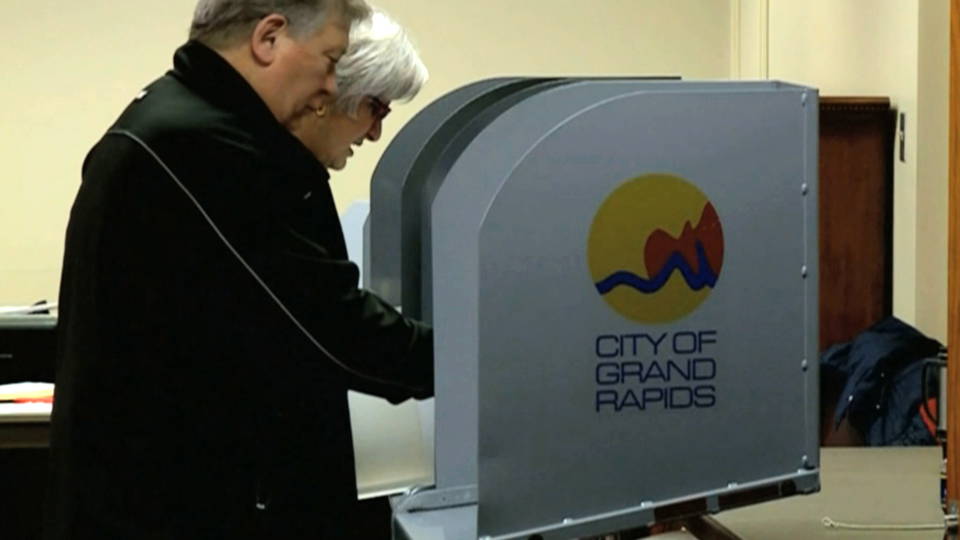
In the most shocking upset of the presidential campaign to date, Vermont Senator Bernie Sanders defeated former Secretary of State Hillary Clinton in the Michigan primary. Sanders won 50 percent of the vote to Clinton’s 48. Opinion polls had projected Clinton would easily win the state by as much as 20 percent. Late last night, pollster Nate Silver wrote that Michigan would "count as among the greatest polling errors in primary history." Despite Sanders’ win in Michigan, Clinton ended up winning more delegates on Tuesday thanks to a lopsided win in Mississippi, where she won 83 percent of the vote. Sanders gave an impromptu news conference outside a hotel in Miami last night.
Sen. Bernie Sanders: "And what tonight means is that the Bernie Sanders campaign, the people’s—the revolution, people’s revolution that we are talking about, the political revolution that we are talking about, is strong in every part of the country. And frankly, we believe that our strongest areas are yet to happen."
TOPICS:
2016 Election
Bernie Sanders
Hillary Clinton
Democratic Party
Donald Trump Wins 3 States; Ted Cruz Takes Idaho
On the Republican side, Donald Trump claimed Hawaii, Michigan and Mississippi, while Texas Senator Ted Cruz won Idaho. Florida Senator Marco Rubio did not pick up any delegates. We’ll have more on the races later in the broadcast.
TOPICS:
2016 Election
Republican Party
Report: Pentagon Gives White House Plan to Bomb ISIL in Libya

The Pentagon has reportedly presented the White House with the most detailed outline to date for possible military action against ISIL in Libya. The New York Times, citing anonymous officials, said the options include airstrikes against as many as 40 targets across four areas of Libya. Libya has been engulfed in fighting after a U.S.-backed military intervention ousted longtime dictator Muammar Gaddafi in 2011.Click here to see our segment on then-Secretary of State Hillary Clinton’s role in the Libya intervention.
TOPICS:
Libya
U.S. Student Killed Amid Series of Attacks During Biden Visit to Israel

Israeli authorities say they have shot dead two Palestinians they accused of opening fire at cars in Jerusalem and wounding one person. Separately in the occupied West Bank, Israeli soldiers shot and killed a Palestinian they said tried to stab them. The attacks came a day after a Palestinian allegedly went on a stabbing spree near the city of Jaffa, killing a U.S. student, Taylor Force. The attacks coincided with a visit by Vice President Joe Biden over a possible increase in U.S. military aid to Israel.
TOPICS:
Israel & Palestine
Israel
Officials Say Police Killing of Militia Member Justified; FBI Agents Scrutinized

In Oregon, local officials say police were justified in fatally shooting armed right-wing militia spokesperson LaVoy Finicum in a standoff in January. Video shows Finicum screaming, "You back down, or you kill me now!" But the local sheriff said FBI agents involved in the shooting are under investigation for firing two shots at Finicum and then not disclosing the shots to investigators.
TOPICS:
Oregon
Right-wing Militias
Police
Court Orders Baltimore Officer to Testify Against Peers in Freddie Gray Case
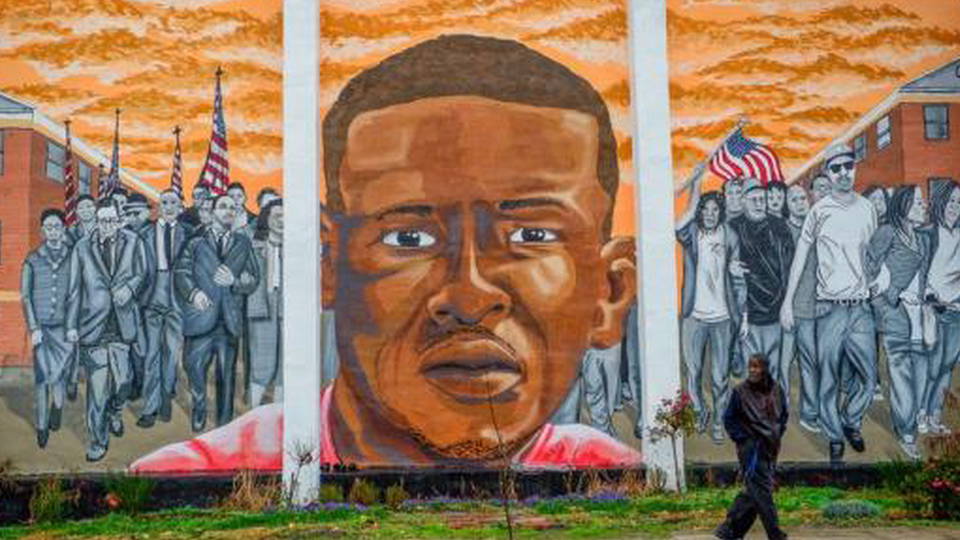
Maryland’s highest court has ordered Baltimore police officer William Porter to testify against five fellow officers at their trials over the fatal arrest of African American Freddie Gray. Gray’s family attorney said his spine was "80 percent severed at his neck." Officer Porter’s trial ended in a hung jury in December; he faces a retrial. Tuesday’s decision allows the officers’ trials to resume. The next one is set to begin April 13, one year and one day after Gray’s fatal arrest.
TOPICS:
Police
Police Brutality
Freddie Gray
No U.S. Charges for Officer Who Killed Ramarley Graham in His NYC Home
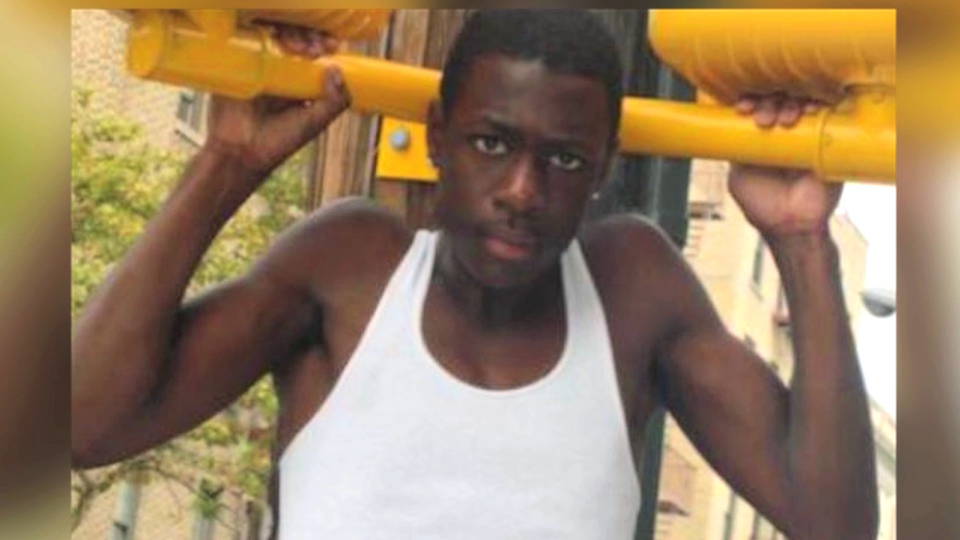
In New York, the police officer who fatally shot unarmed African-American teenager Ramarley Graham in the bathroom of his own home four years ago will not face criminal charges. Manhattan U.S. Attorney Preet Bharara’s office said there is not enough evidence to support civil rights charges against officer Richard Haste, who shot Graham in the chest in front of his grandmother and six-year-old brother as the teen attempted to flush a bag of marijuana down the toilet. Police had pursued Graham into his own home without a warrant. Haste was initially indicted for manslaughter, but the case was later dismissed over a prosecutor’s error and a new grand jury declined to indict him.
TOPICS:
New York
Police
Police Brutality
Ohio: Officer Fired for Calling Suicide of Black Lives Matter Activist a "Happy Ending"

In Ohio, a police officer has been fired after referring to the suicide of a Black Lives Matter activist as a "happy ending." Fairborn police officer Lee Cyr posted the comment after MarShawn McCarrel fatally shot himself on the steps of the Ohio State House in Columbus. Click here to see our interview with friends of MarShawn McCarrel.
TOPICS:
Ohio
Black Lives Matter
Women Rally at U.N. to Demand Justice for Slain Honduran Environmentalist Berta Cáceres
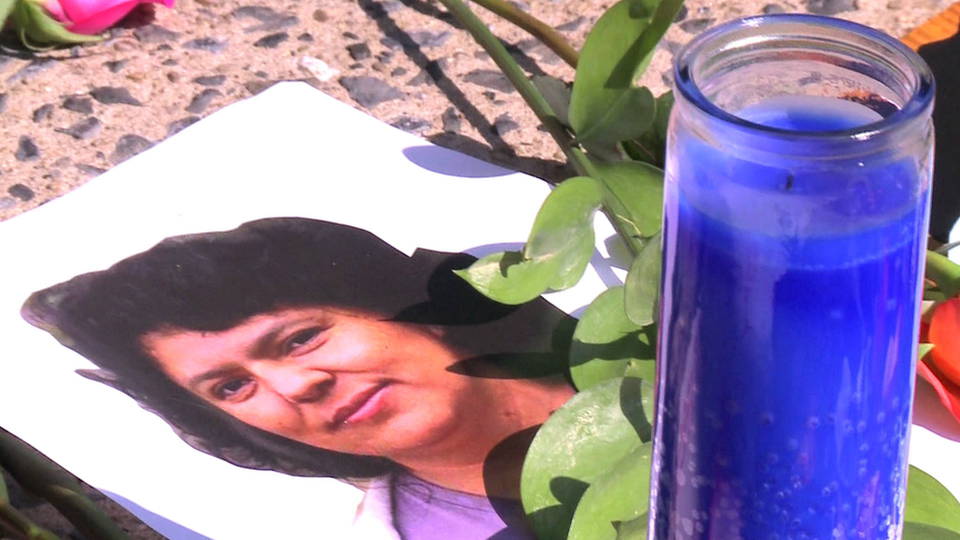
In New York City, dozens of women marked International Women’s Day by rallying outside the Honduras Mission to the United Nations to demand justice for the murder of Honduran environmental activist Berta Cáceres. She was gunned down in her home last week, less than a year after she won the prestigious Goldman Environmental Prize. The activists also demanded the release of Gustavo Castro Soto, another well-known environmental campaigner, who witnessed the shooting and was shot twice. Honduran authorities have barred him from returning to his native Mexico. He says his life may be in danger. Honduran activist Gregoria Flores spoke at Tuesday’s protest.
Gregoria Flores: "We came here today to look for the United Nations delegate from Honduras, but they told us she wasn’t here. We spoke with the person who reports to her, and we gave him a letter demanding clarifications about Berta’s case, freedom for Gustavo, security for the family of Berta Cáceres, and security for all of the activists in Honduras and around the world, as well. One more time: Freedom for Gustavo, freedom for Gustavo. We need Gustavo to be in Mexico. We need Gustavo to be with his family. We need an assurance of the safety of Gustavo’s life. We want the whole world to say, 'Freedom for Gustavo, freedom for Gustavo, and justice for all the defenders of human rights.'"
TOPICS:
United Nations
Honduras
Peru: Indigenous Villagers Release Officials Held Hostage over Oil Spill

In the Peruvian Amazon, an indigenous village has reportedly released at least eight officials it had taken hostage to demand action over an oil spill on its lands. The village had been excluded from an emergency response plan after the spill. On Sunday, villagers seized a grounded military helicopter, capturing officials, including representatives of the state-owned energy company Petroperú, which operates the pipeline. Petroperú said the hostages were freed after the firm agreed to provide aid, including help with electrical and phone service.
TOPICS:
Peru
Dr. Quentin Young, Advocate for Single Payer & Physician to Obama, Dies at 92
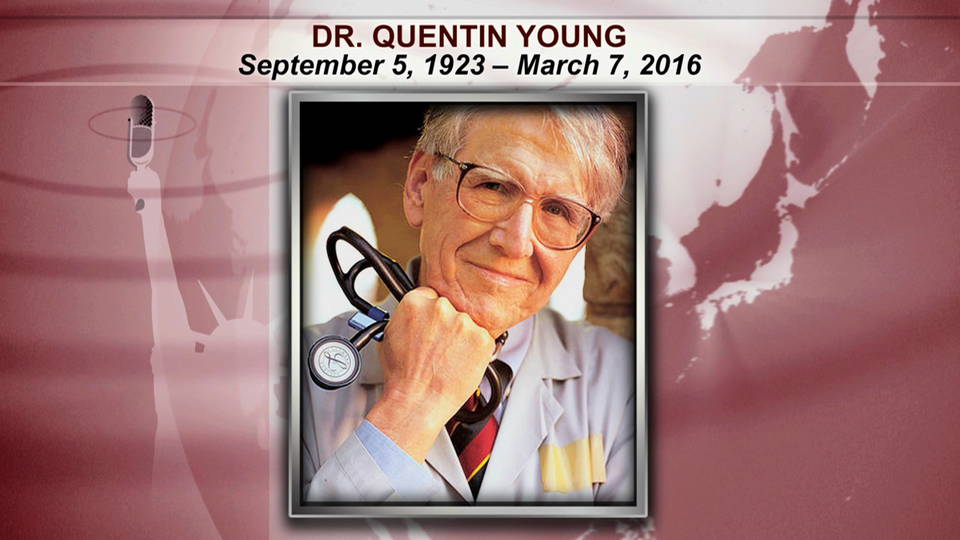
And Dr. Quentin Young, whose patients included Dr. Martin Luther King Jr. and a young Barack Obama, has died at the age of 92. Young was one of the nation’s leading advocates for single-payer healthcare. Speaking on Democracy Now! in 2009, as President Obama laid out his plans for what would become known as Obamacare, Dr. Quentin Young criticized his former patient and longtime friend, saying Obama’s plan didn’t go far enough.
Dr. Quentin Young: "The problem is the diagnosis here. America’s difficulties, indeed the crisis in healthcare, is due to one big thing: the multi-payer and private insurance companies. Everybody knows that. Obama knows that. He said he was for single payer not that many years ago, and if he was starting from scratch, was the way he put it, he would go with it. Well, he is starting from scratch, and the failure to grasp the nettle and really give America the kind of healthcare reform system it deserves is very painful and very dangerous."
Dr. Quentin Young died Monday at his daughter’s home in Berkeley, California. He was 92.
TOPICS:
Healthcare
Donate today:
Follow:
On the Republican side, Donald Trump claimed Hawaii, Michigan and Mississippi, while Texas Senator Ted Cruz won Idaho. Florida Senator Marco Rubio did not pick up any delegates. We’ll have more on the races later in the broadcast.
TOPICS:
2016 Election
Republican Party
Report: Pentagon Gives White House Plan to Bomb ISIL in Libya

The Pentagon has reportedly presented the White House with the most detailed outline to date for possible military action against ISIL in Libya. The New York Times, citing anonymous officials, said the options include airstrikes against as many as 40 targets across four areas of Libya. Libya has been engulfed in fighting after a U.S.-backed military intervention ousted longtime dictator Muammar Gaddafi in 2011.Click here to see our segment on then-Secretary of State Hillary Clinton’s role in the Libya intervention.
TOPICS:
Libya
U.S. Student Killed Amid Series of Attacks During Biden Visit to Israel

Israeli authorities say they have shot dead two Palestinians they accused of opening fire at cars in Jerusalem and wounding one person. Separately in the occupied West Bank, Israeli soldiers shot and killed a Palestinian they said tried to stab them. The attacks came a day after a Palestinian allegedly went on a stabbing spree near the city of Jaffa, killing a U.S. student, Taylor Force. The attacks coincided with a visit by Vice President Joe Biden over a possible increase in U.S. military aid to Israel.
TOPICS:
Israel & Palestine
Israel
Officials Say Police Killing of Militia Member Justified; FBI Agents Scrutinized

In Oregon, local officials say police were justified in fatally shooting armed right-wing militia spokesperson LaVoy Finicum in a standoff in January. Video shows Finicum screaming, "You back down, or you kill me now!" But the local sheriff said FBI agents involved in the shooting are under investigation for firing two shots at Finicum and then not disclosing the shots to investigators.
TOPICS:
Oregon
Right-wing Militias
Police
Court Orders Baltimore Officer to Testify Against Peers in Freddie Gray Case

Maryland’s highest court has ordered Baltimore police officer William Porter to testify against five fellow officers at their trials over the fatal arrest of African American Freddie Gray. Gray’s family attorney said his spine was "80 percent severed at his neck." Officer Porter’s trial ended in a hung jury in December; he faces a retrial. Tuesday’s decision allows the officers’ trials to resume. The next one is set to begin April 13, one year and one day after Gray’s fatal arrest.
TOPICS:
Police
Police Brutality
Freddie Gray
No U.S. Charges for Officer Who Killed Ramarley Graham in His NYC Home

In New York, the police officer who fatally shot unarmed African-American teenager Ramarley Graham in the bathroom of his own home four years ago will not face criminal charges. Manhattan U.S. Attorney Preet Bharara’s office said there is not enough evidence to support civil rights charges against officer Richard Haste, who shot Graham in the chest in front of his grandmother and six-year-old brother as the teen attempted to flush a bag of marijuana down the toilet. Police had pursued Graham into his own home without a warrant. Haste was initially indicted for manslaughter, but the case was later dismissed over a prosecutor’s error and a new grand jury declined to indict him.
TOPICS:
New York
Police
Police Brutality
Ohio: Officer Fired for Calling Suicide of Black Lives Matter Activist a "Happy Ending"

In Ohio, a police officer has been fired after referring to the suicide of a Black Lives Matter activist as a "happy ending." Fairborn police officer Lee Cyr posted the comment after MarShawn McCarrel fatally shot himself on the steps of the Ohio State House in Columbus. Click here to see our interview with friends of MarShawn McCarrel.
TOPICS:
Ohio
Black Lives Matter
Women Rally at U.N. to Demand Justice for Slain Honduran Environmentalist Berta Cáceres

In New York City, dozens of women marked International Women’s Day by rallying outside the Honduras Mission to the United Nations to demand justice for the murder of Honduran environmental activist Berta Cáceres. She was gunned down in her home last week, less than a year after she won the prestigious Goldman Environmental Prize. The activists also demanded the release of Gustavo Castro Soto, another well-known environmental campaigner, who witnessed the shooting and was shot twice. Honduran authorities have barred him from returning to his native Mexico. He says his life may be in danger. Honduran activist Gregoria Flores spoke at Tuesday’s protest.
Gregoria Flores: "We came here today to look for the United Nations delegate from Honduras, but they told us she wasn’t here. We spoke with the person who reports to her, and we gave him a letter demanding clarifications about Berta’s case, freedom for Gustavo, security for the family of Berta Cáceres, and security for all of the activists in Honduras and around the world, as well. One more time: Freedom for Gustavo, freedom for Gustavo. We need Gustavo to be in Mexico. We need Gustavo to be with his family. We need an assurance of the safety of Gustavo’s life. We want the whole world to say, 'Freedom for Gustavo, freedom for Gustavo, and justice for all the defenders of human rights.'"
TOPICS:
United Nations
Honduras
Peru: Indigenous Villagers Release Officials Held Hostage over Oil Spill

In the Peruvian Amazon, an indigenous village has reportedly released at least eight officials it had taken hostage to demand action over an oil spill on its lands. The village had been excluded from an emergency response plan after the spill. On Sunday, villagers seized a grounded military helicopter, capturing officials, including representatives of the state-owned energy company Petroperú, which operates the pipeline. Petroperú said the hostages were freed after the firm agreed to provide aid, including help with electrical and phone service.
TOPICS:
Peru
Dr. Quentin Young, Advocate for Single Payer & Physician to Obama, Dies at 92

And Dr. Quentin Young, whose patients included Dr. Martin Luther King Jr. and a young Barack Obama, has died at the age of 92. Young was one of the nation’s leading advocates for single-payer healthcare. Speaking on Democracy Now! in 2009, as President Obama laid out his plans for what would become known as Obamacare, Dr. Quentin Young criticized his former patient and longtime friend, saying Obama’s plan didn’t go far enough.
Dr. Quentin Young: "The problem is the diagnosis here. America’s difficulties, indeed the crisis in healthcare, is due to one big thing: the multi-payer and private insurance companies. Everybody knows that. Obama knows that. He said he was for single payer not that many years ago, and if he was starting from scratch, was the way he put it, he would go with it. Well, he is starting from scratch, and the failure to grasp the nettle and really give America the kind of healthcare reform system it deserves is very painful and very dangerous."
Dr. Quentin Young died Monday at his daughter’s home in Berkeley, California. He was 92.
TOPICS:
Healthcare
Donate today:
Follow:




SPECIAL REPORT

"Thirsty for Democracy: The Poisoning of an American City": Complete Democracy Now! Special on Flint
COLUMN

Race and the Crime of Felony Disenfranchisement
WORK WITH DN!

Broadcast Engineer
Director of Finance and Operations
Director of Development
---------------------
Democracy Now! Daily Digest: A Daily Independent Global News Hour with Amy Goodman & Juan González for Tuesday, March 8, 2016
democracynow.org
Stories:

Here's to Flint: An Unprecedented Look at the Battle for Clean Water in Flint From the ACLU
Image Credit: Kate Levy
As voters head to the polls in four states today, with Michigan seen as the top prize, the ongoing Flint water crisis has become a major campaign issue for Democrats. The crisis began when an unelected emergency manager appointed by Michigan Governor Rick Snyder switched the source of Flint’s water to the corrosive Flint River in an apparent bid to save money. Today, in a Democracy Now! exclusive, we broadcast the ACLU of Michigan documentary "Here’s to Flint," produced by Michigan Journalist of the Year Curt Guyette and filmmaker Kate Levy. The film tells the inside story of how local residents, journalists and scientists organized to uncover the water contamination crisis that has sparked congressional hearings, the resignations of public officials and a national debate about the impacts of austerity and infrastructure decline in the United States.
TRANSCRIPT
This is a rush transcript. Copy may not be in its final form.
AMY GOODMAN: In the race for the White House, voters head to the polls in four states today, with Michigan seen as the top prize. Republicans also vote in Hawaii, Idaho and Mississippi; Democrats vote only in Michigan and Mississippi.
On the Democratic side, the ongoing water crisis in Flint, Michigan, has become a major campaign issue. The crisis began when an unelected emergency manager appointed by Michigan’s Republican Governor Rick Snyder switched the source of Flint’s water to the corrosive Flint River in an apparent bid to save money. The river water corroded the city’s pipes and poisoned the water with lead. On Monday, seven Flint families filed a class action lawsuit accusing Snyder of gross negligence for allowing Flint’s water to be contaminated by lead. In a debate on Sunday in Flint, both Hillary Clinton and Bernie Sanders called for Snyder’s resignation.
SEN. BERNIE SANDERS: I had the opportunity to meet with a number of residents of Flint at a town meeting in Flint. And I have to tell you, what I heard and what I saw literally shattered me, and it was beyond belief that children in Flint, Michigan, in the United States of America, in the year 2016, are being poisoned. ... I believe the governor of this state should understand that his dereliction of duty was irresponsible. He should resign.
ANDERSON COOPER: Secretary Clinton?
HILLARY CLINTON: I’m very grateful that my request that we hold this debate be held here, so we can continue to shine a very bright spotlight on what has happened in this city. I agree: The governor should resign or be recalled. ... I know the state of Michigan has a rainy day fund for emergencies. What is more important than the health and well-being of the people, particularly children? It is raining lead in Flint, and the state is derelict in not coming forward with the money that is required.
AMY GOODMAN: Well, today, on the day of the Michigan primary, we bring you a Democracy Now! exclusive: the broadcast premiere of a new documentary that tells the inside story of how local residents, journalists and scientists organized to uncover the water contamination crisis that has sparked congressional hearings, the resignations of public officials and a national debate about the impacts of austerity and infrastructure decline in the United States. The film draws on months of filming by Kate Levy and more than a year of investigative work by Curt Guyette, who has just been named Michigan Journalist of the Year. It’s called Here’s to Flint.
JERRY AMBROSE: We chose to use the Flint River for a short period of time.
FLINT RESIDENT 1: Look, Jerry, it’s working.
JERRY AMBROSE: It would make sense—
FLINT RESIDENT 1: It’s working, Jerry. Look at that ball of hair!
JERRY AMBROSE: It would make sense—
FLINT RESIDENT 1: Look at that work, Jerry. It’s working.
JERRY AMBROSE: Excuse me.
UNIDENTIFIED: Sir.
FLINT RESIDENT 1: You’re killing us!
UNIDENTIFIED: Sir, please.
JERRY AMBROSE: I’m not killing anybody.
UNIDENTIFIED: We have an agenda here.
DARRELL DAWSEY: Under Michigan Public Act 436, a law championed by Governor Rick Snyder, the state can take over financially struggling cities by handing complete authority to an appointed emergency manager. Emergency managers can break collective bargaining agreements, create new ordinances, abolish existing laws, sell off assets and take away healthcare benefits from retirees. There’s only one thing the law prohibits them from doing.
CLAIRE McCLINTON: My name is Claire McClinton. I’m a member of the Flint Democracy Defense League Water Task Force. It’s interesting to note, in Public Act 436, the emergency manager cannot void a contract with bondholders. That’s off limits. Bondholders are sacred. They cannot be touched. People are not sacred.
DARRELL DAWSEY: Nearly every city and school district that has had its democracy suspended under emergency management is a community like Flint—majority African-American and saddled with high poverty rates. What these communities also have in common is that severe cuts in state funding have helped push them into financial distress. Emergency managers completely usurp the authority of locally elected officials.
FLINT RESIDENT 2: How is this democracy?
MAYOR DAYNE WALLING: Well, it’s as much as we have for now.
REV. ALFRED HARRIS: My name is Pastor Alfred L. Harris Sr. of the Saints of God Church in Flint, Michigan. Basically, the mayor has no power, authority; the City Council has no power or authority—who were elected by the people. There’s something wrong with that. And all of us need checks and balances, because none of us make the best decision all the time.
CLAIRE McCLINTON: We knew that this law was undemocratic. We knew it was dictatorial. We knew it was unprecedented. But we never dreamed that we would be faced with not being able to use our municipal water.
DARRELL DAWSEY: While Flint was under state control, the city’s long-term water source was switched, from Detroit’s regional system to the newly created Karegnondi Water Authority. While the pipeline was under construction, the state forced the people of Flint to use the highly corrosive Flint River as the source of their drinking water. It was a cost-cutting move, designed to save no more than $5 million.
MELISSA MAYS: When we heard it on the news that we might be drinking Flint water, might be going to that, we all thought it was a joke, because everybody knows how gross the Flint River is.
MAYOR DAYNE WALLING: Here’s to Flint!
UNIDENTIFIED: Here’s to Flint!
UNIDENTIFIED: Here! Here!
DAUGHERTY JOHNSON: Average resident won’t notice any difference.
DARRELL DAWSEY: But there was a drastic difference. Almost immediately, people began to complain about water that looked bad, smelled bad and tasted bad.
CLAIRE McCLINTON: And it’s just been one debacle after another. We’ve had three or four boil water advisories.
MELISSA MAYS: My name is Melissa Mays. I’ve had all sorts of things happen, with the rashes, the hair loss, the muscle stiffness, the soreness.
REV. ALFRED HARRIS: For instance, right now, we don’t baptize. If we baptize, we have to go outside of the city of Flint.
CLAIRE McCLINTON: It’s almost like we’re living in a nightmare.
DARRELL DAWSEY: While Flint residents were forced to continue to drink the river water, General Motors was allowed to switch back to the Detroit system, because the highly corrosive Flint River was causing engine parts to rust. While many of the problems with the river water quickly became apparent to residents, other dangers remained hidden. For nine months, they were subjected to high levels of TTHMs, a carcinogenic byproduct of chlorine. The state kept that information secret until January 2015. After that information was finally disclosed in a letter to the residents, officials met with an angry public in an attempt to assure them that everything was under control.
HOWARD CROFT: If there is disruption, the police are prepared to remove the disruption, and then we will go on with the meeting.
FLINT RESIDENT 3: This letter spoke about cancer. It spoke about nervous problems and people with weak immune systems. You spoke about that, Doctor. And I think people feel that their bodies and their lives and their well-being is being compromised.
FLINT RESIDENT 4: Yeah!
FLINT RESIDENT 3: So please, elaborate.
JOAN B. ROSE: So the study of water and disease has been going on since, you know, early Egyptian times. We have evidence of studies—
FLINT RESIDENT 5: [bleep]!
JOAN B. ROSE: —United States since the 1900s.
DARRELL DAWSEY: The TTHMs weren’t the only concern. Flint residents were also at the meeting to express outrage over being forced to use water so foul you wouldn’t give it to an animal.
JOAN B. ROSE: I’m a tester. What do I do? I test water. I do it all.
FLINT RESIDENT 6: You drink it?
JOAN B. ROSE: Wholesome water is important. And you don’t want to drink water that doesn’t taste good, that doesn’t smell good and is cloudy.
FLINT RESIDENT 7: And that’s what we’re doing.
JOAN B. ROSE: And so I understand that.
DARRELL DAWSEY: One of the people at that meeting was LeeAnne Walters, a mother of four. That meeting is where she met Jerry Ambrose, the fourth emergency manager who was appointed by the governor to run Flint.
LEEANNE WALTERS: My first encounter with the emergency manager, he called me a liar and called me stupid. I went up to him with bottles from my tap, and I’m like, "Well, this is my water." He’s like, "No, it’s not." He’s like, "I don’t believe that’s your water."
DARRELL DAWSEY: In late February, after LeeAnne Walters had demanded that the city test her water, the results showed the water Walters’s family was using had lead levels seven times higher than the federal action level. Walters shared the startling information with the U.S. Environmental Protection Agency, which reacted with alarm. In an email to the Michigan Department of Environmental Quality, an EPA official wrote, "Wow!!!! Did he find the LEAD! ... She has 2 children under the age of 3. ... Big worries here." Those high levels prompted EPA water expert Miguel Del Toral to ask what kind of corrosion control the city was using. "Flint must have Optimal Corrosion Control Treatment—is it Phosphates?" The MDEQ responded to the EPA by saying it had an optimized corrosion control program in place, but offered no specific details. By March, residents were increasingly calling for a return to the Detroit system. Pastor Alfred Harris helped lead this effort.
REV. ALFRED HARRIS: Our goal is to return Flint to the purest water source, and that is the Detroit source. In the interim, we want an injunction for that. We’re not worried about long range right now; that still has to come to fruition. But immediately, we want to go back to Detroit. I haven’t talked anyone in the state, city, anywhere, that does not agree that the purest water source for the people of Flint is the Detroit source.
AL MOONEY: So, in answer to the second question, Detroit water—can we hook up again to the Detroit water? Great question! Everybody’s asking, "Can we hook up?" We can if we have a money tree. We don’t have a money tree. And you guys would be sorry. So you’d be sorry if we hooked up on that. So that’s the answer to that question.
FLINT RESIDENT 8: Do you live in Flint?
CLAIRE McCLINTON: The emergency manager on through to the Treasurer’s Office and on to Lansing, the Governor’s Mansion, have shown a total disregard for the human needs of the people.
DARRELL DAWSEY: As public anger grew, what would become a persistent lie took root. Throughout the crisis, city and state officials repeatedly claimed they were forced use the Flint River after Detroit canceled a long-term contract. And here’s emergency manager Ambrose.
JERRY AMBROSE: It was Detroit that sent us a letter that said, "We’re canceling your contract. Go find your water someplace else." All right?
FLINT RESIDENT 9: That is a lie.
JERRY AMBROSE: Now, we looked at that, and we said—
FLINT RESIDENT 10: That’s not true.
FLINT RESIDENT 9: I’m not sure that’s true.
FLINT RESIDENT 10: It’s not.
JERRY AMBROSE: "Well, we have the Flint River."
DARRELL DAWSEY: What those same officials didn’t say was that Detroit had tried to enter into a new agreement. Darnell Earley, the city’s third emergency manager, flatly rejected this offer in a letter to Detroit just before the switch.
JERRY AMBROSE: We chose to use the Flint River.
FLINT RESIDENT 1: It’s working, Jerry. Look at that ball of hair!
JERRY AMBROSE: It would make sense—
FLINT RESIDENT 1: Look at that work, Jerry. It’s working.
JERRY AMBROSE: Excuse me.
UNIDENTIFIED: Sir.
FLINT RESIDENT 1: You’re killing us!
UNIDENTIFIED: Sir, please.
JERRY AMBROSE: I’m not killing anybody.
DARRELL DAWSEY: Faced with public outrage, the Flint City Council voted to return to the Detroit water system.
COUNCILMEMBER KERRY NELSON: Let us go back to Detroit, give the people good-quality, clean drinking water, until this KWA come.
DARRELL DAWSEY: Emergency manager Jerry Ambrose overruled that vote. Citizens like Melissa Mays were enraged to see their democratically elected officials silenced and their health sacrificed for a dollar amount.
MELISSA MAYS: The City Council voted and followed and did what the people asked. The next day, he put out a press release saying, "This is incomprehensible."
DARRELL DAWSEY: Emergency manager Ambrose insisted the change back to the Detroit system was unnecessary because Flint’s water was perfectly fine. But Claire McClinton saw through this.
CLAIRE McCLINTON: The narrative that they’re using to get us to sit down and be comfortable with this situation is that the water is safe.
DARRELL DAWSEY: But the water was not safe.
LEEANNE WALTERS: In April, beginning of April, we found out my child had lead poisoning.
DARRELL DAWSEY: Lead is a powerful neurotoxin. Childhood exposure to lead results in IQ loss, behavioral problems and learning disability, all of which can push young kids into the school-to-prison pipeline. For children and adults alike, lead can cause extensive harm to almost every organ or system in the body, especially the central nervous system. Perhaps most disturbing of all is that the impact of lead exposure can be passed from one generation to the next.
LEEANNE WALTERS: I’m terrified of what, you know, the outcome of this, the aftermath of this, could be, neurologically, for my children.
DARRELL DAWSEY: Remember that claim from the Michigan Department of Environmental Quality that corrosion control was in place? LeeAnne Walters found out on her own from a water plant employee that, in fact, no corrosion control was being used.
LEEANNE WALTERS: On Detroit water, we were using a corrosive control, phosphate. The city is not using that control. Pipes are eating themselves from the inside out, and everything that’s built up into them is now coming through our homes because these things are not in place.
DARRELL DAWSEY: She shared that information with the EPA’s Del Toral, who was able to verify it. In an April 2015 email, Del Toral wrote, "Pat Cook has confirmed that following the disconnection from Detroit, Flint has not been operating any corrosion control treatment, which is very concerning given the amount of lead service lines in the city." The state had made a catastrophic decision to not treat the corrosive river water with the mandatory corrosion control. People’s water was discolored because it was leaching rust from the city’s old iron infrastructure. What was not visible were lead particles being leached from lead service lines and lead plumbing.
LEEANNE WALTERS: I’ve reached out to the health department, with no answers—City Hall, Ambrose. I’ve written to Governor Snyder. I’ve called his office, with no results.
Our water is discolored, and my lead is at 397. The maximum is 15. People with discolored water are at a greater risk for having lead or copper in your water. Everybody needs to get it tested, but especially anybody with discolored water.
REV. ALFRED HARRIS: I’m Pastor Harris, Concerned Pastors for Social Action, pastor at Saints of God Church here in Flint, Michigan. The powers that be may not be listening to us. I believe that if we keep on talking and if we keep on screaming and if we keep on shouting, sooner or later something is going to happen.
FLINT RESIDENT 11: We need the federal government in here.
DARRELL DAWSEY: In May 2015, Governor Rick Snyder declared Flint’s financial emergency to be over. The city’s fourth emergency manager vacated his position with one final order: He forbade Flint’s elected officials from overturning any previous EM orders, including the switch to the river, for at least one year.
GERTRUDE MARSHALL: And when it gets to the point where you feel like it don’t matter what I say or do, they’re going to do what they want to do anyway, that’s a sad day for America.
AMY GOODMAN: That was Flint resident Gertrude Marshall. We’ll be back in a minute with more of Here’s to Flint.
[break]
AMY GOODMAN: "Canción para mi América," "Song for My America," by Mercedes Sosa. We’ll have more on the assassination of Berta Cáceres, the Honduran indigenous land rights activist, later in the broadcast. This is Democracy Now!, democracynow.org, The War and Peace Report. I’m Amy Goodman, as we continue with the broadcast premiere of Here’s to Flint, a new documentary produced by the ACLU of Michigan, by Michigan Journalist of the Year Curt Guyette and filmmaker Kate Levy.
DARRELL DAWSEY: Distrustful of the city and the state, LeeAnne Walters, with the help of the EPA’s Del Toral, connected with Virginia Tech professor Marc Edwards. Edwards helped Walters and Del Toral conduct a full analysis of the water flowing into her home. Here’s Marc Edwards.
MARC EDWARDS: They were the worst results we have seen in 25 years, so bad, at first, we didn’t believe it. The levels got as high as 13,500 parts per billion, which is about 10,000 times higher than recommended levels, the maximum levels, two-and-a-half times hazardous waste levels of lead. It’s not even corrosion 101 to realize that water is going to cause this problem. If anyone had looked at this who was reasonably competent for five minutes, they would have predicted that this would have occurred.
PROTESTERS: Our water!
PROTESTER: Whose water is it?
PROTESTERS: Our water!
PROTESTER: Whose water is it?
PROTESTERS: Our water!
PROTESTER: All right!
DARRELL DAWSEY: By the middle of June, the city was wrapping up federally mandated drinking water sampling. Flint was very much in danger of exceeding federal safe water standards. The Michigan Department of Environmental Quality, which analyzes those samples, began warning Flint officials that its water supply was in danger of violating lead and copper standards. State MDEQ officials wrote, "We hope you have 61 more lead/copper samples collected and sent to the lab ... and that they will be below the action level for lead. As of now, with 39 Results, Flint’s ... over the AL for lead." If any more high-lead samples were collected, the city would be out of compliance, forcing it to start spending millions of dollars to replace lead service lines throughout Flint. Given that warning, the city focused on testing homes it knew would produce low lead results. Consequently, all of the remaining home sample came in below the action level for lead.
Also in June, based on test results from LeeAnne Walters’s home, the EPA’s Del Toral wrote an internal memo sounding the alarm about lead in Flint’s water, warning that it should be a "major concern from a public health standpoint." Feeling a sense of urgency to make the issue public, Del Toral broke EPA protocol by giving a copy of the memo to Walters. She shared it with the ACLU of Michigan, which published the memo in early July. In response, the Michigan Department of Environmental Quality completely denied there was any problem with lead in Flint’s drinking water, even though all the warning signs were clear and evidence of contamination was mounting.
BRAD WURFEL: Anyone who is concerned about lead in the drinking water in Flint can relax. There is no broad problem right now that we’ve seen with lead in the drinking water in Flint.
DARRELL DAWSEY: But the person who sounded the warning, the EPA’s Del Toral, was no longer available for comment. And here’s Edwards.
MARC EDWARDS: MDEQ told Ms. Walters that Mr. Del Toral had been handled and that he would no longer be able to work on the Flint water situation. So when I heard that, I grew quite concerned, because scientifically, you know, there’s—it wasn’t just smoke here, there was fire here.
DARRELL DAWSEY: Early July, Flint residents and clean water activists from across the state tried to take their concerns directly to the governor.
KIM REDIGAN: My name is Kim Redigan, and I’m a member of the People’s Water Board coalition. In July, a group of us attempted to take our concerns about the water situation in Flint and beyond directly to the Governor’s Office.
JOHN BYRD: I mean, what did you do?
KIM REDIGAN: We sent a registered letter—
JOHN BYRD: OK.
KIM REDIGAN: —asking for the governor to come to Flint. We have people from all over the state of Michigan here. We’re representing several cities.
PEOPLE’S WATER BOARD MEMBER: No, we have people from all over the country here.
KIM REDIGAN: And we got a terse—a terse response two weeks later simply saying, "The governor’s busy and cannot meet with you." So we’re going to be persistent 'til we do have a meeting. And it would be very good to talk to the person who handles the governor's calendar.
JOHN BYRD: OK, because I—really, to follow and do what we were supposed to—we’re supposed to have a request. That was denied. You have come in. I have come out and tried to speak to you people. And I—
PEOPLE’S WATER BOARD MEMBERS: "You people"?
JOHN BYRD: Excuse me, yoooouuu people. So with that being said, I am more than happy to accept what you would like to give to the governor, and I’ll be more than happy to get it to him.
DARRELL DAWSEY: In the face of official denials, the question became how to get to the truth. The answer was to conduct an independent, scientifically rigorous and citizen-led study of Flint’s water. Marc Edwards applied for an emergency grant from the National Science Foundation. Test kits were sent to Flint in August. On the ground in Flint were the ACLU of Michigan and Flint’s Coalition for Clean Water, a diverse, grassroots group of organizations that had come together in the spring of 2015. Operating from the basement of the Saints of God Church, they began the work of distributing and collecting water samples from 300 homes.
NAYYIRAH SHARIFF: My name is Nayyirah Shariff. I am the coordinator for the Flint Democracy Defense League. This week we’re going to get these kits out to the community, and they can test, and we’ll know for sure what’s in our water.
DARRELL DAWSEY: Citizens ensured the most scientifically valid and geographically broad sampling was conducted.
MARC EDWARDS: You know, scientifically, we couldn’t have done it any better ourselves. They implemented training procedures that I think the city and EPA should be using around the country.
FLINT DEMOCRACY DEFENSE LEAGUE MEMBER: So, after 45 seconds, you’re going to fill up the medium-sized bottle. And then, when that’s full, you’re going to take the bottle out and then wait for two minutes with the water still flowing.
MARC EDWARDS: They also implemented procedures to prevent tampering with the samples, because they knew that that might be raised as a possible concern. And they were right.
MELISSA MAYS: We want to have zero reason for anyone to question what we’ve done here.
LEEANNE WALTERS: What we did when we picked up samples from people, we had them initial near the seam, and then we taped up everything in front of them, so the initials are under the tape, so that the resident would know that their sample hasn’t been touched by anybody but them. And Virginia Tech also knows that.
MARC EDWARDS: I thought no one would claim people would put lead in the water samples to fake that there was high lead in water. But state—people from the state said that to me.
DARRELL DAWSEY: In addition to supplying and analyzing test kits for the citizen-led study, Edwards also loaded up a minivan with students and drove to Flint for two days of additional on-site testing. As Edwards conducted tests at various homes, new concerns were raised.
MARC EDWARDS: So that’s chlorine. So there’s just none in the water here. So there’s no disinfectant.
HEATHER BEACH: Which I was questioning the Legionnaires’ disease. Is that a possibility with the water? Is it only in—
MARC EDWARDS: It’s a—Legionnaires’ disease can sometimes come from water. People do sometimes get it in their showers.
HEATHER BEACH: I mean, we have to bathe in it. We do cook with it. We have this one here who got sores all over his body. He’s on antibiotic—antibiotic ointment right now. They all have just gone through pneumonia in the middle of summer, which, according to the hospital, is extremely rare.
MARC EDWARDS: We haven’t found—I haven’t sampled at a house that has any chlorine yet.
DARRELL DAWSEY: Five months later, the state disclosed, for the first time, that the number of Legionnaires’ cases in and around Flint began spiking dramatically in the months after the switch to the river. Since June 2014, 87 people have contracted the rare pneumonia-like disease. Ten have died.
As soon as the first sample kits began arriving back at Virginia Tech, their analysis showed alarming levels of lead. Feeling morally compelled to immediately address an apparent public health crisis, Edwards and his team began contacting residents with the results and posting information on a newly created website. As the results were revealed, the state continued to publicly claim that the water was safe. For example, Brad Wurfel told Michigan Radio, "The samples don’t match the testing that we’ve been doing in the same kind of neighborhoods all over the city for the past year." But at the same time, the Governor’s Office secretly arranged for an unnamed donor to purchase 1,500 water filters that were handed out to Flint families on September 1st. In a city with a majority African-American population, a poverty rate of 40 percent and average water bills of $150 a month, people had few options.
As Virginia Tech continued to analyze samples and post results, state officials responded by attacking the credibility of Edwards and his team. In an email to a Flint Journal reporter, the MDEQ’s Brad Wurfel claimed, "This group specializes in looking for high lead problems. They pull that rabbit out of that hat everywhere they go. ... They’ve just arrived in town ... fanning political flames irresponsibly. Residents of Flint concerned about the health of their community don’t need more of that."
On September 15th, members of the Coalition for Clean Water, which led the effort to collect sample kits throughout the city, held a press conference to discuss Virginia Tech’s analysis of water from 277 Flint homes—four times as many homes tested by the city and state in the previous six months.
MARC EDWARDS: We estimate that the water in about 5,000 Flint homes is over standards set by the World Health Organization for lead in water, because the water is too corrosive, it has too much salt in it, and there was no plan to control the corrosion. Flint is the only city in America that I’m aware of who does not have a corrosion control plan in place.
DARRELL DAWSEY: Shortly after Edwards raised that issue at the press conference, Howard Croft, then Flint’s director of public works, encountered a citizen visibly upset by the corrosion control issue.
MARIJOYCE CAMPBELL: Why didn’t you think that was important in the first place, the—about a corrosion? Why didn’t you think that was important in the first place? I am angry that I am doing this stuff and drinking this water and doing this stuff, and I could die before my time. Why didn’t you all think about that? Answer that point-blank question!
HOWARD CROFT: I think I will be the one asking the DEQ that. I will be the one asking, "Why did you believe, with the engineering team there?" because that’s—that’s—we followed their guidance.
NAYYIRAH SHARIFF: My name is Nayyirah Shariff, with the Coalition for Clean Water and the Flint Democracy Defense League. The MDEQ did nothing to ensure that treatment was properly planned, approved or started when the switch took place. Because of this negligent act, there is a serious lead problem in the water in the city of Flint. We are in a public health crisis.
CURT GUYETTE: My name is Curt Guyette. I’m an investigative reporter for the ACLU of Michigan. What we found is that the city and state did a number of things that skewed the results.
On the day of that press conference, I also confronted Flint Public Works Director Howard Croft when he attempted to repeat the lie that Detroit kicked Flint off of its water system.
HOWARD CROFT: There was a determination made by DWSD.
CURT GUYETTE: Right, right. I have a letter from Darnell Earley saying they had the option to enter into a new agreement, and they chose not to enter into that new agreement.
HOWARD CROFT: They were—
CURT GUYETTE: Correct? Is that correct?
HOWARD CROFT: I think there were negotiations on what it would look like. And I think those negotiations were not anything that would have benefited the city.
CURT GUYETTE: So the city chose not to stay with Detroit.
HOWARD CROFT: Well, again, once the contract was terminated, I think evaluations were going on all the way up to the state level on what the best course of action would be for the city of Flint, and that was the determination.
CURT GUYETTE: All the way to the Governor’s Office?
HOWARD CROFT: All the way to the Governor’s Office.
DARRELL DAWSEY: Croft’s assertion was the first time the Governor’s Office was implicated in the decision to switch to the Flint River.
After Virginia Tech released its results, state officials continued to claim that the water was safe overall. But they began to talk about the issue of the aging infrastructure. For example, on September 21st, the MDEQ’s Brad Wurfel told MLive Flint’s water supply "presently meets all state and federal water quality standards," but added that "homes with lead service connections and lead plumbing always have been imparting some part-per-billion of lead, which is a concern." Focusing attention on infrastructure was a way to avoid addressing the root of the crisis, which was the state’s fateful decision to switch to the Flint River and its subsequent move to not use corrosion control, a $100-per-day expense. But those supposed savings led to unimaginable costs.
On September 24th, a pediatrician from Flint’s Hurley Medical Center, Dr. Hanna-Attisha, released a study of thousands of health records. The study showed there was a direct link between the switch to the Flint River and the elevated blood lead levels of Flint children.
DR. MONA HANNA-ATTISHA: We looked at all children under the age of five years. We looked at their lead levels pre-switch, and then we looked at blood lead levels post-switch. For children five years and below, the percentage of children with elevated blood lead levels in Flint was 2.1 percent, and then post-switch the percentage was 4. So, a doubling. And that was statistically significant.
DARRELL DAWSEY: Confronted with that evidence, the state launched yet another attack. A spokeswoman for Governor Rick Snyder wrote in an email that the Hurley data had been "spliced and diced." The Michigan Department of Health and Human Services also jumped in, saying the state’s data was "not in line" with Dr. Hanna-Attisha’s results. Those attempts to discredit Dr. Hanna-Attisha’s work quickly fell apart. The Detroit Free Press compared the state’s data with Dr. Hanna-Attisha’s results and found that the state’s own data showed that there was a higher percentage of kids in Flint with elevated lead levels in their blood after the switch. In fact, according to records obtained by Virginia Tech’s Professor Edwards, the state Department of Health and Human Services had detected a significant spike in the lead blood levels of Flint children in the months immediately following the changeover.
PROTESTERS: Lead-free water now! Lead-free water now! Lead-free water now! Lead-free water now!
DARRELL DAWSEY: Finally forced to take some action, the state held a press conference—one that Flint residents weren’t allowed to attend. EPA warnings weren’t enough. The Virginia Tech study wasn’t enough. The Hurley study wasn’t enough. State officials continued to deny the river’s role in Flint’s lead crisis.
DAN WYANT: Now, from my standpoint as director of the DEQ and our responsibility, whether the water comes from Detroit or whether the water comes from the Flint River, we still have the same issue.
DARRELL DAWSEY: Wrong. On October 7th, a panel of experts, formed earlier in the year by Flint’s former mayor and a previous emergency manager, held just its third meeting. In a small conference room crowded with media, the experts recommended that Flint switch back to the Detroit system, in order to protect its residents from further harm. On October 8th, six months after LeeAnne Walters learned that her child had lead poisoning, eight months after the EPA began raising concerns, and 16 months after the river water began causing massive infrastructure damage and irreparable physical harm to residents, Governor Rick Snyder finally announced that he would allow Flint to return to the Detroit system. The governor also insisted that there was no reason to assign blame to the completely avoidable man-made disaster.
GOV. RICK SNYDER: Again, this isn’t about blaming anyone. Right now I want to stay focused in on the solutions and taking action to solve the problems.
DARRELL DAWSEY: After the press conference, Snyder spokesperson Sara Wurfel provided a rambling response to a direct question: Was the Governor’s Office involved in the decision to use the river in the first place?
SARA WURFEL: Can you—
CURT GUYETTE: OK.
SARA WURFEL: Can you guys hang on a second? Because I’ve got two more—
CURT GUYETTE: Just one more question. Howard Croft, the director—
AIDE: Sara, can I see you for one second?
CURT GUYETTE: One more question. Howard Croft, the director of public works for Flint, in a recent interview, said the decision to switch to the Flint River came out of the Governor’s Office.
SARA WURFEL: I can’t address that at all, in fact, because at the time—you’ll go back to the history of this, of the community very much wanting to switch to a new water authority, making the switch—the Detroit Water and Sewerage Department at the time, back last spring, saying, "Hey, we’re going to cut you off."
UNIDENTIFIED: That’s a lie.
SARA WURFEL: There were certain steps at the time that I can’t speak to with all that history. But I can’t address that—
CURT GUYETTE: So, you can’t—you cannot—so you’re saying this decision did not emanate from the Governor’s Office?
SARA WURFEL: You’re saying that the Governor’s Office was directly involved. I can’t address that at all. No.
CURT GUYETTE: Why not?
SARA WURFEL: As far as I know—because that’s not accurate.
CURT GUYETTE: But you’re a spokesman for the governor, correct?
SARA WURFEL: Yes, I am.
CURT GUYETTE: So—
SARA WURFEL: That’s why I’m talking to you right now.
CURT GUYETTE: Right. So—
SARA WURFEL: Thank you for your time.
CURT GUYETTE: So, that’s a yes-or-no question.
DARRELL DAWSEY: Snyder wasn’t the only official saying there was no need to place blame. Darnell Earley, now the emergency manager over Detroit Public Schools and the man who signed the letter rejecting Detroit’s offer to keep selling water to Flint, echoed the governor’s words.
DARNELL EARLEY: But I don’t want to focus on what happened back in 2013. I think it’s important that we mobilize all resources that we can to fix the problem.
DARRELL DAWSEY: But all resources weren’t being mobilized, prompting newly elected Flint Mayor Karen Weaver to declare a state of emergency.
MAYOR KAREN WEAVER: I’m looking for help from the state, and we’re looking for help from the federal government. I feel like we have no other option but to reach out and ask for help.
DARRELL DAWSEY: The Flint water crisis began to draw broad national and international media attention. On December 29th, a task force, that Snyder had appointed in response to mounting pressure, reported its initial findings from its investigation into the state’s handling of the crisis. "What is disturbing about [the] MDEQ’s responses," the letter read, "is their persistent tone of scorn and derision. In fact," the letter continued, "the MDEQ seems to have been more determined to discredit the work of others, who ultimately proved to be right, than to pursue its own oversight responsibility." On the day that letter was issued, MDEQ Director Dan Wyant and his chief spokesperson, Brad Wurfel, both resigned.
Three weeks after Mayor Weaver’s state of emergency declaration, Governor Rick Snyder issued his own, on January 5th, 2016, at last opening up the door to federal relief. By the time of the governor’s State of the State address in January 2016, the people of Flint had been drinking water contaminated with lead for nearly two years. People in the city still couldn’t drink the water.
ANNOUNCER: Members of the joint convention, the governor of the state of Michigan, Rick Snyder.
GOV. RICK SNYDER: Tonight, I will address the crisis in Flint, first and in depth. Let me walk you through the facts. Tonight I’m releasing a comprehensive timeline of the steps we’ve taken and the actions underway to solve this crisis. First, this crisis began in the spring of 2013, when the Flint City Council voted seven to one to buy water from the Karegnondi Water Authority, the KWA.
DARRELL DAWSEY: That vote had nothing to do with the decision to use the Flint River as the temporary water source for a city of 100,000 people.
GOV. RICK SNYDER: Detroit Water and Sewer Department provided notice of termination, effective one year later, and on April 25th, 2014, Flint began to use water from the Flint River as an interim source.
DARRELL DAWSEY: What the governor leaves out is the fact that Detroit wanted to keep selling clean, safe water to Flint. The governor’s comprehensive timeline also omits the fact that when the Flint City Council voted to return to the Detroit system in March 2015, Snyder’s emergency manager overruled that vote, forcing the people of Flint to continue using poisonous water.
GOV. RICK SNYDER: On September 28th, 2015, I was first briefed on the potential scope and magnitude of the crisis. You deserve to know the truth, and I have a responsibility to tell the truth.
DARRELL DAWSEY: Governor Snyder has not yet testified under oath. But on February 3rd, 2016, LeeAnne Walters didn’t hesitate to raise her hand and swear to tell the truth.
REP. JASON CHAFFETZ: Do you solemnly swear, affirm that the testimony you will give will be the truth, the whole truth and nothing but the truth? Let the record reflect that all witnesses answered in the affirmative.
LEEANNE WALTERS: In 2014, in a city with no democracy, forced under an emergency manager handpicked by Governor Snyder, a decision was made to switch the water source without the proper testing and enforcement of regulation. The citizens in Flint were assured for 18 months that the water was safe. We fought the city and the state, saying there was something wrong, and we were dismissed. We conducted citizen-based samplings. We educated and distributed 300 samples equally throughout the city. We collected back 277 samples. All of this was done in a three-week turnaround. There are people in Flint today still not being assisted during this crisis—immigrants, disabled and shut-ins. Broken policy and procedures are smothering the outcry of an entire community suffering financially, physically, mentally and emotionally. I urge you to help restore some of the trust lost by never allowing this to happen again.
AMY GOODMAN: As of today, 23 months after the switch to the Flint River, though it’s been switched back, five officials have resigned and one has been fired because of their roles in the water crisis. The U.S. Department of Justice, the FBI and the Michigan Attorney General’s Office have all launched criminal investigations. Congress continues to hold hearings.
The ACLU of Michigan documentary, Here’s to Flint, was produced by Kate Levy and Curt Guyette. The film was narrated by Darrell Dawsey of the ACLU. Special thanks to Melissa Mays, Jenn Teed, LeeAnne Walters, Antonio Cosme, Kayla Fenner, Notown the movie, Spectacle TV and All Points TV. If you’d like a copy of today’s show, go to democracynow.org.
When we come back, after the Honduran environmentalist Berta Cáceres was assassinated in Honduras last week, what’s happened to the sole survivor and eyewitness? Stay with us.

Honduran Activist Berta Cáceres Died in Gustavo Castro Soto's Arms; Now His Life is in Danger
Honduras is still reeling from last week’s assassination of Berta Cáceres, one of the country’s most well-known environmental and indigenous leaders. She was gunned down in her home early Thursday, less than a year after she won the prestigious Goldman Environmental Prize. Cáceres is at least the 110th environmental or land defender to be killed in Honduras since 2010 in the wake of a U.S.-supported coup. At the time of her assassination, Cáceres was with Gustavo Castro Soto, another well-known environmental campaigner and coordinator of Friends of the Earth Mexico. He witnessed the shooting and sustained two bullet wounds. Now, human rights activists say the Honduran government is detaining Castro without cause and refusing him permission to return to his native Mexico. We speak with Beverly Bell, longtime colleague of both Castro and Cáceres and coordinator of Other Worlds, a social and economic justice organization.
TRANSCRIPT
This is a rush transcript. Copy may not be in its final form.
AMY GOODMAN: Today is International Women’s Day. And a shout-out to the students at P.S. 128 in Washington Heights, who have come to watch Democracy Now! today in our studios. This is Democracy Now!, democracynow.org, The War and Peace Report. I’m Amy Goodman, as we turn now to Honduras, which is still reeling from last week’s assassination of Berta Cáceres, one of the country’s most well-known indigenous environmental leaders. She was gunned down in her home early Thursday, less than a year after she won the prestigious Goldman Environmental Prize. She is at least the 110th environmental or land defender to be killed in Honduras since 2010 in the wake of a U.S.-supported coup. Her death has sparked protests across the Americas. A demonstration is scheduled today outside the United Nations.
At the time of her assassination, Berta was with another well-known environmental campaigner, Gustavo Castro Soto, coordinator of Friends of the Earth Mexico. He was shot twice in the attack. Over the weekend, Castro attempted to leave Honduras, but authorities blocked his exit, even though he was accompanied by the Mexican ambassador. Castro was eventually ordered to return to the town of La Esperanza, where Berta Cáceres had been gunned down. Castro has been held there ever since for additional questioning, the Honduran government says.
Well, for more, we’re giong to Albuquerque, New Mexico, where we’re joined by Beverly Bell, longtime friend of both Gustavo and Berta. She’s currently the coordinator of Other Worlds, a social and economic justice organization. Bell is an associate fellow at the Institute for Policy Studies.
Welcome back to Democracy Now!, Beverly Bell. What is happening right now in the wake and the horror of the Berta Cáceres assassination? What’s happening to Gustavo Castro Soto?
BEVERLY BELL: Well, the first thing to point out is that Gustavo is not only the sole witness, he also was a target for assassination. He was, as you mentioned, Amy, shot twice. And in the one letter that he has been able to get out to a few of us, he said, "They tried to assassinate me, and they are still trying to assassinate me." Gustavo feigned death after having been shot twice. The death squads, who were sent, we are certain, by the Honduran government, thought that he was dead. They left. Berta died in Gustavo’s arms. He was then immediately picked up for questioning. He is now in his fifth day of questioning. It reads like the worst horror movie you could ever imagine. It’s just been crazy, where Gustavo was locked up in horrible conditions, horrible, denied food and drink and other things, which I have been asked not to report until he leaves the country, for his security.
He then, as you mentioned, was taken by the Mexican ambassador, was given safe haven in the Embassy of Mexico, because he’s a Mexican citizen, for one day. He was being escorted by the ambassador to the airport. He was on his way to pass customs. He had just hugged the ambassador goodbye, when suddenly this gang of Honduran authority thugs showed up and took him back. It was crazy. There has been this supposed diplomatic tug-of-war between Mexico and Honduras. I should say the Mexican government had absolutely no right to return him to the Honduran authorities.
He is now back in the little town where Berta lived, which was the headquarters of her organization, which is an indigenous grassroots organization. And he is now held again for questioning. We are certain that they want to keep Gustavo out of the way. He said that my life—quote, "My life is in extreme danger right now." And it absolutely is.
AMY GOODMAN: I want to go to—
BEVERLY BELL: The government of Honduras wants to pin Berta’s—
AMY GOODMAN: I want to go to—Bev, I want to go to Gustavo Castro Soto in his own words. He has long stood up to multinational mineral extraction companies in Mexico, where he’s involved with the M4 movement, or the Mesoamerican Movement Against the [Extractive] Mining Model. This was from last year.
GUSTAVO CASTRO SOTO: [translated] We are finding many challenges in Chiapas around dams, around the issues of climate change, mining, monoculture, exclusion of different sectors of farmers, of the indigenous. And I believe a very important part of this will be to see the young people themselves, and students of universities and social processes, involved in the struggle and resistance, but especially in the search for alternatives. Young people have much to contribute, and the academy also has to be linked to social struggles.
AMY GOODMAN: So that is Gustavo Castro Soto. He was speaking in his own words last year. So, Bev Bell, in these last minutes we have—he’s been shot twice. The Mexican ambassador tried to get him out of Honduras, after Berta Cáceres—and he witnessed this assassination—was assassinated, but he survived. He’s now been taken again back to La Esperanza, where he was shot and she was assassinated. What are you calling for now?
BEVERLY BELL: We are calling for his safe passage out of Honduras back to Mexico. We are also calling for an independent investigation of the assassination of Berta Cáceres, because so far it’s been grossly manipulated by the Honduran government, which is seeking to target and blame other members of Berta’s group, who themselves had been detained and are now being investigated and interrogated without lawyers being present. And we are also calling for the decriminalization of the indigenous and popular group, COPINH, that Berta led.
I want to say that this is not just a horrible human rights crisis happening in Honduras right now. It is also a battle for the future of Central America, which is the epicenter of extractive industries. So, on the one hand, you have multinational corporations that are in Honduras to take over forests, mines, waters, indigenous lands and intellectual property rights, which others call indigenous knowledge, and on the other hand, you have social movements, which in Central America have been led by Gustavo Castro and by Berta Cáceres for the protection of these indigenous lands, for rights and for participatory democracy.
AMY GOODMAN: Bev Bell, because this is International Women’s Day, I want to end with the words of Berta Cáceres when she won the 2015 Goldman Environmental Prize.
BERTA CÁCERES: [translated] Our Mother Earth, militarized, fenced-in, poisoned, a place where basic rights are systematically violated, demands that we take action.
AMY GOODMAN: Again, that was the assassinated Honduran indigenous environmentalist, Berta Cáceres. And I also will continue—we will continue to cover what is happening to Gustavo Castro Soto, though the Mexican ambassador tried to get him out of Honduras. He survived the assassination attempt on him, but he’s been shot twice. The Honduran authorities are continuing to keep him. Bev Bell, thanks so much for joining us from New Mexico.
And that does it for our broadcast. To see our full report on Berta Cáceres, you can go to democracynow.org.
Democracy Now! has three job openings. Go to democracynow.org.
Headlines:Pentagon: U.S. Strikes in Somalia Kill 150 People
The Pentagon says U.S. airstrikes in Somalia killed more than 150 people it identified as militants at an al-Shabab training camp, marking one of the deadliest U.S. attacks to date in the so-called war on terror. The strikes hit what officials said they believed was a graduation ceremony. Officials said they were unaware of any civilian casualties but were unable to independently verify that. The strikes, carried out by drones and manned aircraft, marked the deadliest attack on the militant group al-Shabab during the more than decade-long U.S. campaign against it. White House spokesperson Josh Earnest emphasized the targets posed an "imminent threat" to U.S. and African Union forces.
Josh Earnest: "The fighters, who were scheduled to depart the camp, pose an imminent threat to U.S. and African Union mission forces in Somalia. Their removal, the removal of those terrorist fighters, degrades al-Shabab’s ability to meet the group’s objectives in Somalia, including recruiting new members, establishing bases and planning attacks on U.S. and AMISOM (African Union Mission in Somalia) forces."
TOPICS:
Drone Attacks
Somalia
Obama Admin Vows to Release Data on Drone Killings

The Obama administration announced Monday it would for the first time release tallies of the number of people it believes it has killed in drone strikes in countries that lie outside of conventional war zones. Lisa Monaco, President Obama’s assistant for homeland security and counterterrorism, said the report would be released in the coming weeks.
Lisa Monaco: "I can announce today that in the coming weeks the administration will publicly release an assessment of combatant and noncombatant casualties resulting from strikes taken outside areas of active hostilities since 2009."
TOPICS:
Drone Attacks
Drones
Tunisia: 54 Killed in "Unprecedented" Attack Near Libyan Border
In Tunisia, more than 50 people have been killed in a militant attack, sparking fears the violence engulfing neighboring Libya is now spreading across the border. Dozens of attackers descended on a Tunisian town, attacking police and military stations. Tunisian President Beji Caid Essebsi called the attack "unprecedented" and blamed it on ISIL. Officials said at least 54 people were killed, including militants, security forces and civilians.
TOPICS:
Tunisia
Libya
Voters Head to Polls in 4 States, Michigan Seen as Key Prize
Voters head to the polls for caucuses and primaries in four states today, with Michigan seen as the top prize. Republicans are also voting in Hawaii, Idaho and Mississippi; Democrats vote only in Mississippi and Michigan.
TOPICS:
Michigan
2016 Election
Bloomberg Says He Won't Run for President, Fearing Trump Could Win
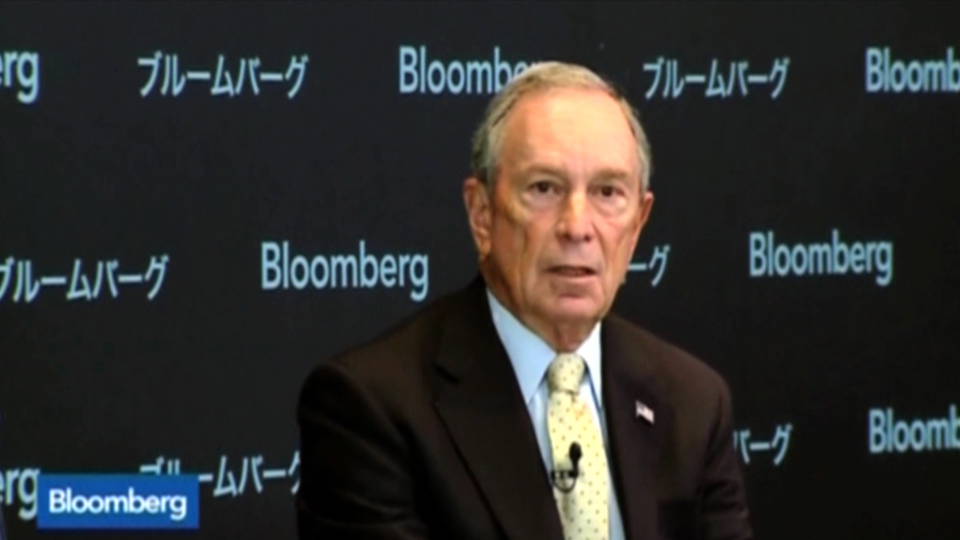
Ahead of today’s contests, former New York City mayor and billionaire Michael Bloomberg announced he would not run for president as an independent, saying he feared his entry into the race could help lead to the election of Donald Trump as president. Bloomberg said Trump is running "the most divisive and demagogic presidential campaign I can remember."
Mexican President Compares Trump's Rhetoric to Hitler
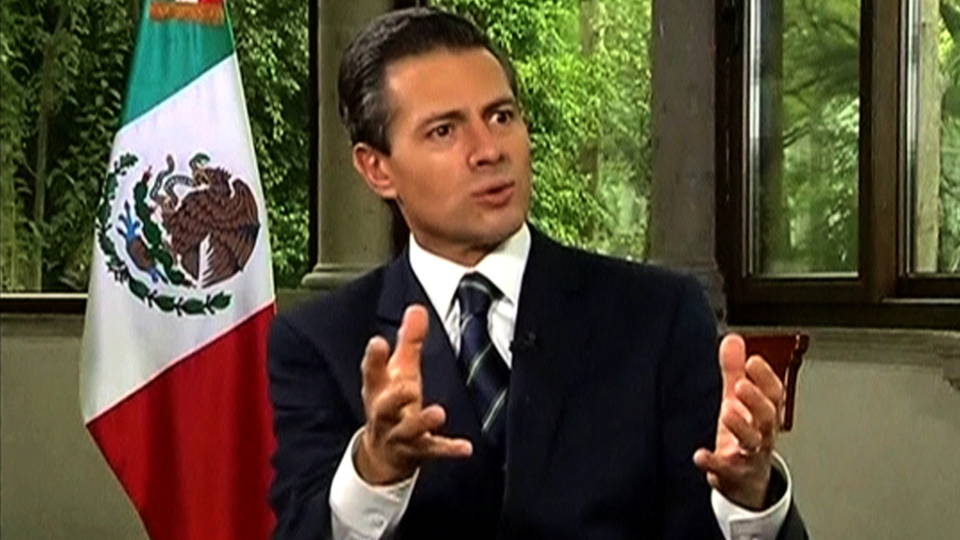
Meanwhile, Mexican President Enrique Peña Nieto has refused to pay for the wall Donald Trump has vowed to build between the United States and Mexico. Peña Nieto criticized Trump, invoking the fascist leaders Adolf Hitler and Benito Mussolini.
President Enrique Peña Nieto: "And there have been episodes in human history, unfortunately, where these expressions of this strident rhetoric have only led to very ominous situations in the history of humanity. That’s how Mussolini got in. That’s how Hitler got in. They took advantage of a situation, a problem perhaps, which humanity was going through at the time, after an economic crisis. And I think what (they) put forward ended up, at what we know today from history, in global conflagration."
TOPICS:
Mexico
2016 Election
Republican Party
Sanders, Clinton Discuss Abortion at Fox News Town Hall
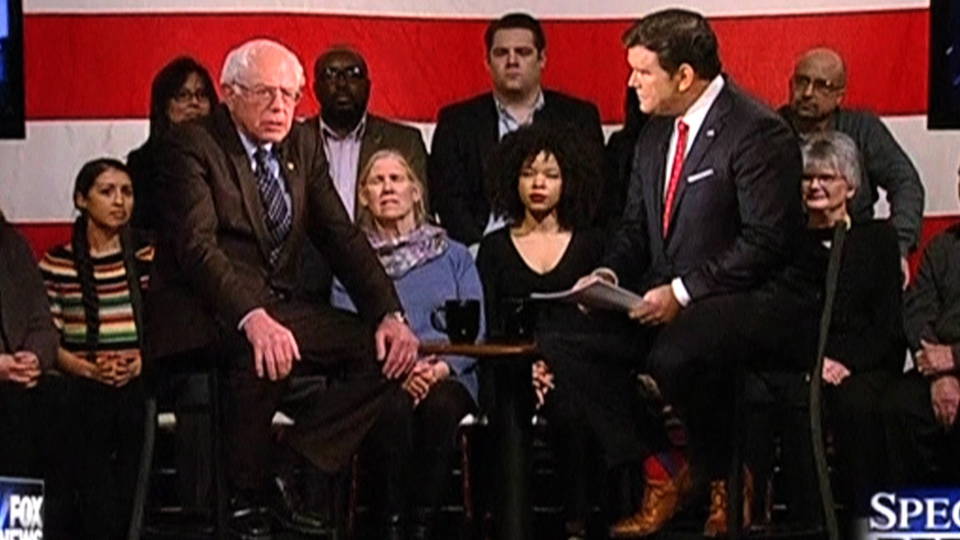
Vermont Senator Bernie Sanders and former Secretary of State Hillary Clinton were both asked about abortion rights at a Fox News town hall in Detroit, Michigan, Monday. There have been no questions about abortion in the seven Democratic debates so far. Both candidates strongly defended abortion rights. Clinton noted that she has supported some "late-pregnancy regulation that would have exceptions for the life and health of the mother."
TOPICS:
Abortion
2016 Election
Flint Families File Class Action Lawsuit over Poisoning of Water
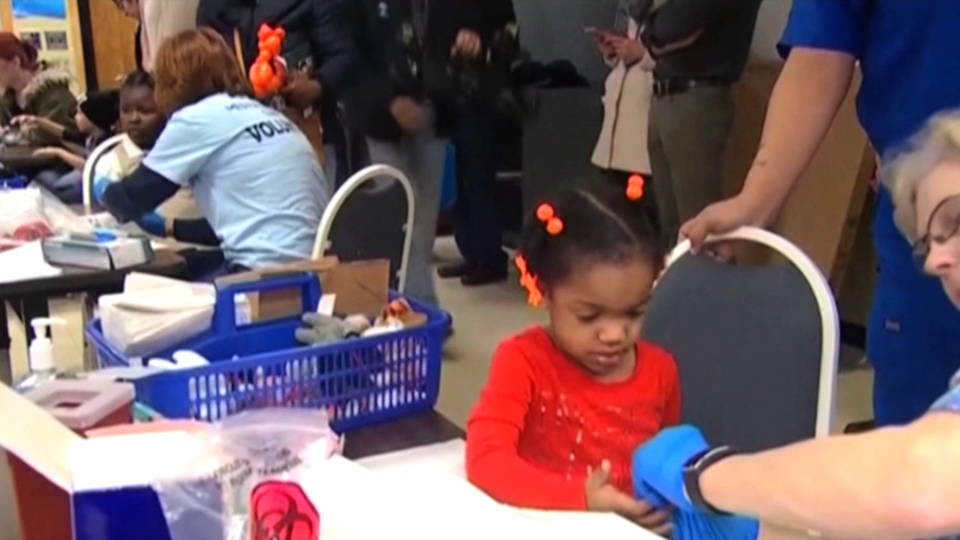
As Michigan is in the spotlight over the primary, seven families in Flint have filed a class action lawsuit accusing Michigan Governor Rick Snyder of gross negligence after the city’s water was contaminated by lead. The poisoning began when an unelected emergency manager appointed by Governor Snyder switched the city’s water to the corrosive Flint River, causing lead from the pipes to leach into water. Many are calling for Snyder’s resignation and even his arrest. We’ll have more on Flint after headlines.
TOPICS:
Michigan
Flint Water Crisis
Honduras: Activist Who Witnessed Assassination of Berta Cáceres Barred from Returning to Mexico
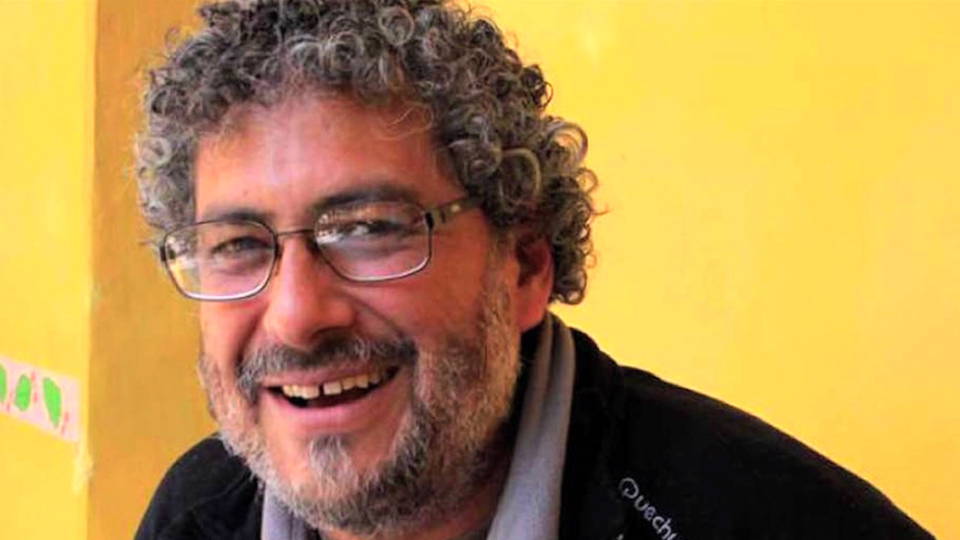
In Honduras, activists say the well-known environmental campaigner Gustavo Castro Soto, coordinator of Friends of the Earth Mexico, has been detained and denied permission to return to his native Mexico. Castro witnessed the fatal shooting of environmental leader Berta Cáceres in Honduras last Thursday, sustaining two bullet wounds. We’ll have more on his case later in the broadcast.
TOPICS:
Honduras
Environment
Venezuela: Authorities Probe Alleged Massacre of 28 Gold Miners
Venezuelan authorities say they are investigating an alleged massacre of 28 miners in the state of Bolívar. There are reports a gang killed and dismembered the miners in a bid to take over a wildcat gold mine.
TOPICS:
Venezuela
Thousands of Boston Public School Students Walk Out over Budget Cuts
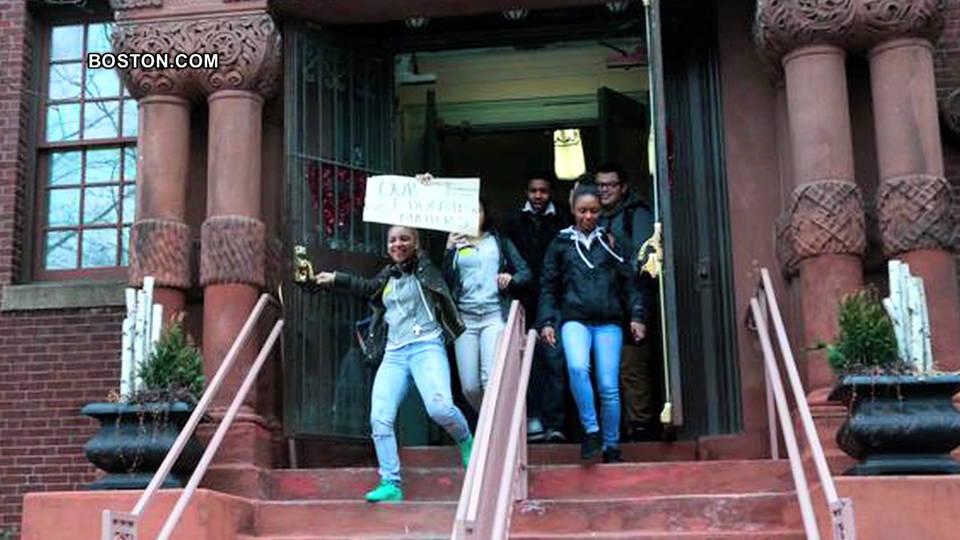
In Boston, Massachusetts, more than 2,000 public school students walked out of class Monday to protest planned budget cuts. Despite threats that they would be marked absent for leaving, the students rallied on Boston Common, at the State House and at Faneuil Hall, chanting, "They say cut back, we say fight back."
TOPICS:
Education
Oklahoma Limits Oil and Gas Waste Disposal After Surge in Earthquakes
Oklahoma authorities have set new limits for oil and gas companies after a vast increase in the number of earthquakes, including more than 6,000 last year alone. In 2010, Oklahoma saw just three earthquakes at or above magnitude three, but last year that number rose to more than 900. The quakes have been linked to the injection of oil and gas waste deep underground. On Monday, Oklahoma regulators asked companies in central Oklahoma to reduce the amount of waste they’re injecting by 40 percent. This follows a similar request last month for a northwest region.
TOPICS:
Fracking
Environment
New York: Bill McKibben Among 57 Arrested over Gas Storage at Seneca Lake
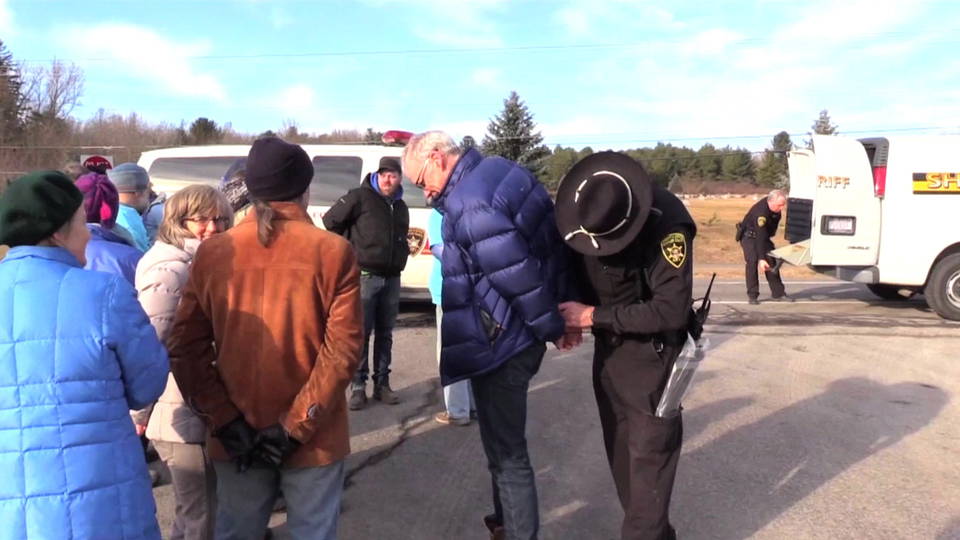
In upstate New York, environmentalist Bill McKibben and 56 other people have been arrested after blockading the driveway of the gas storage company Crestwood Midstream. In total, activists say more than 500 arrests have been carried out as part of a 17-month-long civil disobedience campaign against plans by the firm to expand storage of the potent greenhouse gas methane in abandoned salt caverns at Seneca Lake, a drinking water source for 100,000 people. McKibben spoke about the action.
Bill McKibben: "Today, now and every day, there are, someplace around the world, 10, 15, 20 places like this where people are standing up. After a hundred years of a free ride, the fossil fuel industry is now met at every turn by people saying, ’It’s a new world, the science is clear, we understand what has to happen.’"
TOPICS:
Environment
New York
Peace Activist Mary Anne Grady Flores Released from Jail After 49 Days
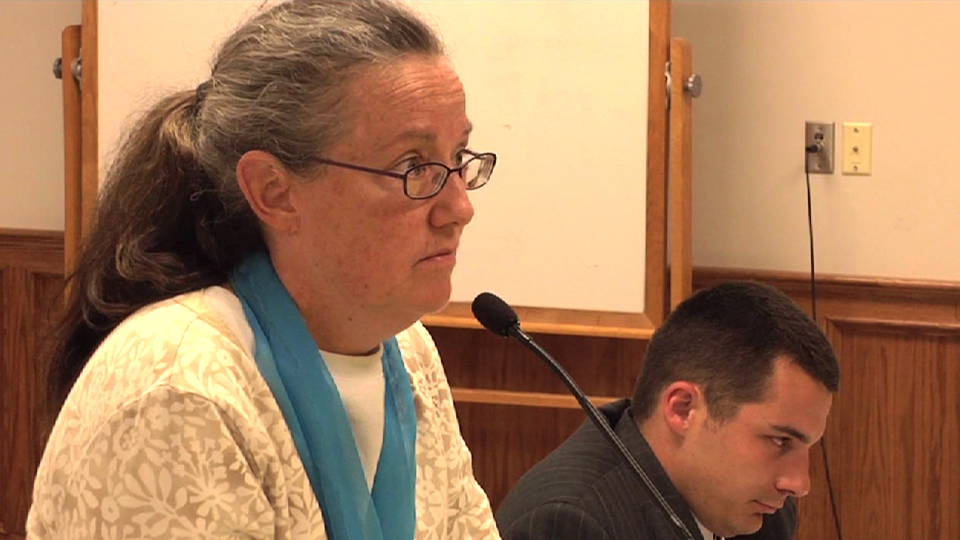
In other news from upstate New York, a peace activist and grandmother has been released on $5,000 bail after 49 days in jail for photographing a protest at Hancock air base, where drones are piloted remotely. Mary Anne Grady Flores began a six-month sentence in January but has been released pending an appeals court decision on whether to consider her case. Flores was accused of violating an order of protection aimed at keeping her away from the base after she participated in civil disobedience there. Click here to see our interview with Mary Anne Grady Flores.
TOPICS:
Drones
International Women's Day Marked Around the World
And events are taking place around the world today for International Women’s Day. This year’s theme is "Pledge for Parity."
TOPICS:
Women's Rights
Donate today:
Follow:




SPECIAL REPORT

"Thirsty for Democracy: The Poisoning of an American City": Complete Democracy Now! Special on Flint
FEATURED TOPIC

Honduras
WORK WITH DN!

Broadcast Engineer
Director of Finance and Operations
Director of Development
---------------------
Democracy Now! Daily Digest: A Daily Independent Global News Hour with Amy Goodman & Juan González for Monday, March 7, 2016
democracynow.org
Stories:

The Presidential Race & Environmental Racism: Flint Water Crisis Center Stage at Democratic Debate
The race for the Democratic nomination intensified this weekend as Vermont Senator Bernie Sanders beat Hillary Clinton at caucuses in Maine, Kansas and Nebraska, while Clinton easily won in Louisiana. On Sunday night, the candidates faced off in a debate in Flint, Michigan, which has been in the national spotlight over the poisoning of the city’s water. The crisis began in 2014, when an unelected emergency manager appointed by Michigan Governor Rick Snyder switched the source of the city’s drinking water from the Detroit system, which they’d been using for half a century, to the corrosive Flint River. Soon, residents began complaining of a range of physical maladies. At Sunday’s debate, both candidates condemned the devastation in Flint and laid out their plans for addressing the crisis. We play excerpts of the debate and speak with Democratic New York Congressmember Yvette Clarke, who has just returned from Flint as part of a Congressional Black Caucus delegation.
TRANSCRIPT
This is a rush transcript. Copy may not be in its final form.
AMY GOODMAN: On Sunday night, Hillary Clinton and Bernie Sanders squared off at a CNN debate in Flint, Michigan. Both used their opening statements to call for the resignation of Michigan Republican Governor Rick Snyder for his role in the poisoning of Flint’s water supply.
SEN. BERNIE SANDERS: I had the opportunity to meet with a number of residents of Flint at a town meeting in Flint. And I have to tell you, what I heard and what I saw literally shattered me, and it was beyond belief that children in Flint, Michigan, in the United States of America, in the year 2016, are being poisoned. ... I believe the governor of this state should understand that his dereliction of duty was irresponsible. He should resign.
ANDERSON COOPER: Secretary Clinton?
HILLARY CLINTON: I’m very grateful that my request that we hold this debate be held here, so we can continue to shine a very bright spotlight on what has happened in this city. I agree: The governor should resign or be recalled. ... I know the state of Michigan has a rainy day fund for emergencies. What is more important than the health and well-being of the people, particularly children? It is raining lead in Flint, and the state is derelict in not coming forward with the money that is required.
AMY GOODMAN: CNN moderator Anderson Cooper asked Hillary Clinton and Bernie Sanders what punitive measures should be taken against those responsible for the Flint water crisis.
ANDERSON COOPER: Secretary Clinton, you’ve—you’ve now both called for the governor to resign. I believe that’s new for you. Previously, you had not called for that, but you’re calling for that tonight. It’s easy to blame the Republican governor, Rick Snyder. But the federal government also dropped the ball here. ... The EPA knew for months and months, never warned the people of Flint not to drink the water. As president, would you fire the head of the EPA?
HILLARY CLINTON: Well, I think that the people here in the region, who knew about this and failed to follow, what you just said rightly, the law required, have been eliminated from the EPA. I don’t—
ANDERSON COOPER: So far, one person has resigned.
HILLARY CLINTON: Well, I don’t know how high it goes. I would certainly be launching an investigation. I think there is one.
ANDERSON COOPER: Right.
HILLARY CLINTON: I was told that, you know, some of the higher-ups were pushing to get changes that were not happening. So I would have a full investigation, determine who knew what, when. And yes, people should be fired. How far up it went, I don’t know. But as far as it goes, they should be relieved, because they failed this city.
But let me just add this, Anderson. This is not the only place where this kind of action is needed. We have a lot of communities right now in our country where the level of toxins in the water, including lead, are way above what anybody should tolerate. We have a higher rate of tested lead in people in Cleveland than in Flint. So I’m not satisfied with just doing everything we must do for Flint. I want to tackle this problem across the board. And if people know about it and they’re not acting and they’re in the government at any level, they should be forced to resign.
ANDERSON COOPER: Senator Sanders, would a President Sanders fire the head of the EPA?
SEN. BERNIE SANDERS: President Sanders would fire anybody who knew about what was happening and did not act appropriately. And President Sanders would make the point that: How does it happen in the wealthiest country in the history of the world? What are our priorities when, among others, Republicans today are fighting for hundreds of billions of dollars in tax breaks for the wealthiest people? How did we have so much money available to go to war in Iraq and spend trillions of dollars, but somehow not have enough money, not just for Flint—secretary is right, there are communities all over this country—it’s not just infrastructure, it is education. Detroit’s public school system is collapsing.
AMY GOODMAN: Joining us now in New York is New York Congressmember Yvette Clarke. She just returned from Flint, Michigan, where she took part in a Congressional Black Caucus delegation town hall and visit.
Welcome to Democracy Now! It’s great to have you with us.
REP. YVETTE CLARKE: Thank you for having me, Amy. It’s great being here.
AMY GOODMAN: Before we start commenting on the debate—and interestingly here, both Bernie Sanders and Secretary Hillary Clinton agreed on the issue, calling for the resignation—Hillary Clinton said, or the recall—of the governor, Rick Snyder. But what you found in Flint, what you were most surprised by?
REP. YVETTE CLARKE: Well, I mean, the breadth and depth of the devastation there, the people and their concerns about their well-being. I mean, you got a sense of it from just empathizing with a poisoned water system, but to be there, to see people with disabilities. We oftentimes speak of the children, but we don’t speak about people with compromised immune systems and what this may mean for them. There are concerns about other contaminants in the water. We hear mostly about lead, but the examination of just about every pollutant that was in the Flint River has not been thoroughly vetted as of yet, and so there remain a lot of questions for the people living there, and just the way of life that they’ve had to adjust to, whether it’s water filtration in their homes or receiving constant deliveries of bottled water. And what do you do with all the recycled bottles?
AMY GOODMAN: Well, Flint resident LeeAnne Walters raised a question about lead service lines throughout the United States to the Democratic presidential candidates.
LEEANNE WALTERS: After my family, the city of Flint and the children in D.C. were poisoned by lead, will you make a personal promise to me right now that, as president, in your first hundred days in office, you will make it a requirement that all public water systems must remove all lead service lines throughout the entire United States, and notification made to the citizens that have said service lines?
SEN. BERNIE SANDERS: I will make a personal promise to you that the EPA and the EPA director that I appoint will make sure that every water system in the United States of America is tested and that the people of those communities know the quality of the water that they are drinking and that we are going to have a plan to rebuild water systems in this country that are unsafe for drinking.
ANDERSON COOPER: Let me just point out for accuracy’s sake, there are 10 million lead service pipes delivering water to people all across this country tonight. Secretary Clinton?
HILLARY CLINTON: Well, I agree completely. I want to go further, though. I want us to have an absolute commitment to getting rid of lead wherever it is, because it’s not only in water systems, it’s also in soil, and it’s in lead paint that is found mostly in older homes. That’s why 500,000 children today have lead—lead in their bodies. So I want to do exactly what you said. We will commit to a priority to change the water systems, and we will commit within five years to remove lead from everywhere.
AMY GOODMAN: That was Hillary Clinton answering the question of LeeAnne Walters, one of the leading advocates for what has taken place in Flint and changing the situation there now. LeeAnne Walters’ own children have been poisoned by the lead in the water supply. She and her husband, who’s in the military, eventually moved to Virginia. It was actually Virginia Tech professor Marc Edwards who took a team from Virginia to Flint, Michigan, to test the water. And together with doctors and scientists in Flint, without the help of the Michigan government, proved that the people of Flint were being poisoned.
This is Democracy Now! When we come back, a quick trip to Flint and what we found when Democracy Now! went to the Michigan city. Stay with us.

"A Democracy Problem": As Debate Brings Attention to Flint, a Look at the Roots of the Water Crisis
The Democratic candidates for president faced off Sunday night in Flint, Michigan, which has been in the national spotlight over the poisoning of the city’s water. The crisis began in 2014, when an unelected emergency manager appointed by Michigan Governor Rick Snyder switched the source of the city’s drinking water from the Detroit system to the corrosive Flint River. Last month, Democracy Now! went to Flint and spoke to residents on the front lines of Michigan’s water wars. Lead contamination in the water supply has forced residents to drink, cook with and even bathe in bottled water, while still paying some of the highest water bills in the country. We then went from Flint to Mecosta County, Michigan, where Nestlé, the world’s largest water bottling company, is pumping millions of gallons of water from aquifers that feed Lake Michigan.
TRANSCRIPT
This is a rush transcript. Copy may not be in its final form.
AMY GOODMAN: We turn to an excerpt of our documentary, "Thirsty for Democracy: The Poisoning of an American City." Democracy Now! traveled to Flint, Michigan, last month.
AMY GOODMAN: I’m Amy Goodman. This is Democracy Now! We’re in Flint, Michigan, at the Golden Gate Restaurant. It’s a cold, snowy Saturday morning. Inside, the Flint Democracy Defense League is having breakfast and a meeting. I want to go in and talk to Claire McClinton. She’s one of the lead organizers for democracy in Flint against the poisoning of the Flint water. She’s been challenging the emergency managers for years. Let’s go inside.
CLAIRE McCLINTON: In 2011, this governor, Governor Snyder, signed into law a law called the emergency manager law. It enabled the governor to send an emergency manager, under the guise of being fiscally responsible, to cities and school districts that they deemed financially in fiscal crisis. It just so happened most of these places were majority African-American cities. Privatizing services and selling off assets, that’s their main purpose. Well, here in Flint, they’ve privatized our garbage collection. They’ve sold off our parks.
AMY GOODMAN: Was Santa Claus sold off?
CLAIRE McCLINTON: Yes, that’s how—that’s how low we’ve gotten. They sold Santa Claus, the Santa Claus that was mounted on top of City Hall every year.
AMY GOODMAN: Tell us what happened.
CLAIRE McCLINTON: There is a coordinated, aggressive effort to privatize our water system. And this is how we came to this poisoned water catastrophe.
AMY GOODMAN: How?
CLAIRE McCLINTON: We were being told that the Detroit water system, which we got our water from, was charging too much money, and "we’re going to build this new pipeline so you folks can have cheaper water. While we build the pipeline, why don’t we go to the river? You know, the one at General Motors dumped all that crap and stuff in, all the industrial toxins and stuff? We’ll go to that river in the interim." And this—these decisions were made by an emergency manager.
And that’s the untold story about the problem we have here. We don’t have just a water problem. We’ve got a democracy problem. We’ve got a dictatorship problem. We’ve got a problem of being stripped of our democracy as we’ve known it over the years. And for someone to come to our city, a proud city with a rich labor history.
AMY GOODMAN: You’re from an autoworker’s family. You have a long history here. Talk about how that influenced you.
CLAIRE McCLINTON: We had the first city of our size to elect an African-American mayor. We passed an open housing ordinance in the city of Flint, one of the first, very historic. We have such a rich history, the sitdown strike of 1937. We’re just not the type of people that’s used to being walked on.
AMY GOODMAN: That’s Claire McClinton of the Democracy Defense League. While she was conducting her breakfast meeting, a woman came in extremely upset, named Kawanne Armstrong. She said she needed to get clean water to her infant grandson. Another woman, a member of the meeting, Audrey Muhammad, said she had just bought water, and she would give it to Kawanne. So they went out into the parking lot to take the water from Audrey’s trunk and put it into Kawanne’s.
AMY GOODMAN: So, you came into this restaurant this morning, and you met with this woman who—you just bumped into her. And can you tell me your name?
AUDREY MUHAMMAD: It’s Audrey Muhammad.
AMY GOODMAN: And you heard that she’s trying to get some clean water for her infant grandson.
AUDREY MUHAMMAD: Yes, ma’am.
AMY GOODMAN: So why do you have this in your trunk?
AUDREY MUHAMMAD: Well, I went to the store the other day and purchased the water for myself, and I just hadn’t taken it out the car. So she can have it. I’ll go get some more. That’s not a problem. That’s not a problem at all.
KAWANNE ARMSTRONG: And I appreciate it. I appreciate it.
AUDREY MUHAMMAD: Yes, ma’am.
KAWANNE ARMSTRONG: I really do.
AUDREY MUHAMMAD: Yes, ma’am.
KAWANNE ARMSTRONG: I appreciate it.
AMY GOODMAN: What will you with this water?
KAWANNE ARMSTRONG: It’s for my grandson. It’s for my grandson, my first grandchild, and it’s a boy. It’s for my grandson. He was born February 6. That’s my concern, is my grandson. That’s my concern.
AUDREY MUHAMMAD: Yes, ma’am.
KAWANNE ARMSTRONG: And it’s a shame, this is 2016, and we’re living like this. And this man want us to pay for this.
AUDREY MUHAMMAD: Sorry it’s frozen below.
KAWANNE ARMSTRONG: It’s all right.
AMY GOODMAN: Do you have to pay for water? I mean, this—
KAWANNE ARMSTRONG: I’ve been buying water to drink forever, for the longest.
AMY GOODMAN: I mean, paying for the water in your tap?
KAWANNE ARMSTRONG: Oh, yeah. I just paid a shut-off notice January 6, $196.
AMY GOODMAN: Wait. They were going to shut your poisoned water off?
KAWANNE ARMSTRONG: I guess. They sent me a shut-off notice. I got the shut-off notice the day after Christmas, and it was for December 29. And I called down there, and they told me my water about to be shut off at any time. So, a friend of mine’s, while I was at work, she went down and paid my shut-off notice, $196.
AMY GOODMAN: How do you feel about paying for this contaminated water?
KAWANNE ARMSTRONG: I’m not comfortable with it at all, and I don’t think it’s fair. The cold water especially, in my kitchen, when I turned it on, it had this foul, raw egg smell.
AMY GOODMAN: This is when they first connected to the Flint River?
KAWANNE ARMSTRONG: Right. I went down there to the city, and I talked to Howard, because even my postman was complaining about the smell.
AMY GOODMAN: And Howard is the head of water in Flint?
KAWANNE ARMSTRONG: At that time—Public Works. At that time, he was. And because he—my postman parked his truck right there in front of my house, and there’s a drain there. And we thought it was something in the sewage, OK? But it got worse, especially the hot days when Flint was like 85, 90 degrees. When you turned the faucet on, it was just—it was dark brown. Then, as the water ran, it goes golden brown. So when Claire called me and told me about the gen tech was coming in to test the water, and the professor was doing it free, I volunteered. And they came to my house the first week of August, because I got my results back, and I tested positive for lead.
AUDREY MUHAMMAD: They’re still OK frozen, aren’t they?
KAWANNE ARMSTRONG: Sure. I’m going to use this for my grandbaby.
AUDREY MUHAMMAD: Yes, ma’am.
KAWANNE ARMSTRONG: But, you know, a thing I want to ask Governor Snyder, because he had the—he’s been having the town hall meetings during early in the day, and I’m at work—
AMY GOODMAN: Where do you work?
KAWANNE ARMSTRONG: At TRW Automotive in Tyrone Township. And I got a message on my phone telling me to hold the line. But when they called, it was like 10:30 in the morning. I have to be at work at 6:00. If it was his grandchild, would he want this? I don’t have the money he has. I respect him because he’s the governor of Michigan. But if it was his grandchild, would he want it?
AMY GOODMAN: So we’ve just come from the Golden Gate Restaurant in Flint, actually Flint Township. And this is very interesting. Where the Democracy Defense League was meeting over breakfast, that particular restaurant gets water from Flint Township, which is not the corrosive Flint River. But right across Flushing Road—you got it, Flushing Road—that’s where they’re linked up to the Flint River.
Right here at St. Michael’s Church, scores of people have gathered. They’re going to be canvassing houses, seeing what people need. And they’re also formulating demands for the governor.
PRIEST: Help us to re-establish good drinking water here in Flint on a regular basis, a safe basis that we can learn to trust again.
MELISSA MAYS: I’m Melissa Mays from Water You Fighting For? And it’s a play on words, so it’s "Water," W-A-T-E-R, "You Fighting For?"
AMY GOODMAN: Melissa, do you live in Flint?
MELISSA MAYS: I do live in Flint.
AMY GOODMAN: How have you been affected by the poisoned water?
MELISSA MAYS: Well, all three of my sons are anemic now. They have bone pain every single day. They miss a lot of school because they’re constantly sick. Their immune systems are compromised. Myself, I have seizures. I have diverticulosis now. I have to go in February 25th for a consultation on a liver biopsy. Almost every system of our bodies have been damaged. And I know that we’re not the only one. I’m getting calls from people that are so sick, and they don’t know what to do.
AMY GOODMAN: How old are your boys?
MELISSA MAYS: Eleven, 12 and 17. And they’re wonderful kids, that they put forth all this effort to get straight A’s, to get good grades. My oldest, it’s little things that he seems to forget, like pluses and minuses, different words he can’t—there’s a brain fog that’s settled on everybody.
AMY GOODMAN: Mayor Weaver has called for $55 million to replace the lead pipes. Is that happening?
MELISSA MAYS: It’s still—we’re still waiting. The governor said, "You can have $25 million of that." Fifty-five million is just a start, to get the lead service lines out, because the plumbers are also talking about how the copper lines need to go, as well as galvanized. Any kind of metal has been so corroded, and these byproducts are all neurotoxins. So you’ve got copper, lead, aluminum, tin, chromium—things that our bodies can’t handle. And these pipes need to go. And so, the $55 million is a start, to get to the most needed people—the pregnant, the elderly, the small children. And he, out of $55 million, said $25 million.
AMY GOODMAN: What should happen with Governor Snyder?
MELISSA MAYS: I feel that he’s in the way. He has been standing in the way of us getting the funding that we need to get these pipes replaced, to get crews in here to get going and get it started. So he needs to be removed from office. He just doesn’t show any real concern. He has not put any effort into actually making up for the failures of his agencies. So he just needs to go.
AMY GOODMAN: We’re in from New York, you know, from where 9/11 took place, the attacks on the World Trade Center, and in Washington, the Pentagon. The government said, after that, the biggest fear was an international terrorist would poison the water supply of a major city. Well, an international terrorist didn’t do this, but a major city’s water supply was poisoned—your city, Flint—the government, the Michigan government, the governor, Rick Snyder, involved with this. What are your thoughts?
MELISSA MAYS: Well, it’s bad enough—the Geneva Convention says, in an act of war, you cannot poison a city’s water supply. We’re not in war, but guess what. It kind of seems like it, because a whole city’s water supply was poisoned by our state government. And it allowed to continue. I mean, they knew in October of 2014, when General Motors said, "We cannot use this water anymore, because it’s corroding our parts," the water is bad. The city lost $400,000 in revenue. So that had to be signed off on by the emergency manager and the governor. They knew the water was bad then. And if it was not OK for car parts, how is it OK for citizens?
AMY GOODMAN: And the Democratic primary presidential debate is happening here on March 6th. Do you know where it’s happening? Are you going to be there? Hillary Clinton was here recently. We hear Bernie Sanders is coming in before the debate. What demands do you have of them?
MELISSA MAYS: I want to know what they’re going to do about this. I want to know that if they become president, if they’re elected, what are they going to do to stop this, because it’s not just happening in Flint. This is happening in other cities. And the environmental injustice needs to stop. They need to stop putting it off. They need to stop ignoring the problem and hoping that it will go away. So I want to hear strong statements and commitments by the presidential candidates that they’re not going to allow this to happen anywhere else.
AMY GOODMAN: I’m Amy Goodman. We’re in Flint, Michigan. It’s sunset at the Flint Water Plant. I’m standing in front of the Flint water tower. Just down the road is the GM engine plant. It was October of 2014 that GM recognized that the Flint water was corroding its engines. They got permission from the unelected emergency manager of Flint to disconnect from the Flint River and go back to the Detroit water. It would be another year before the people of Flint were finally allowed to disconnect from the corrosive Flint River as their water supply and hook up again with the Detroit water.
We’re going to go talk to a GM worker who works at the plant and worked there at the time that GM recognized—and the state acknowledged—that they could no longer use Flint water because it was destroying the engines.
RONALD JAMISON: My name is Ronald Jamison, known as Coach Hollywood.
AMY GOODMAN: And how long have you worked at the Flint engine plant?
RONALD JAMISON: For 39 years, going on 40 this year.
AMY GOODMAN: So you were working there when Flint hooked up with the Flint River and was disconnected from the Detroit water supply.
RONALD JAMISON: Yes.
AMY GOODMAN: What happened at the plant?
RONALD JAMISON: Well, from what I hear, it basically was saying that it was causing corrosion. And what that was causing, they were saying something to the fact that what they were putting in the water. And they were saying we got this stuff called rust inhibitor, that keeps engines from rusting while they’re waiting to have oil put on them. And they went, I guess, tested it and found out, I guess, we were putting too much chlorine in the water. And so they told Flint that we’re not—you’re causing us to lose engines, because we have to tear them down and get the rust out before we put them—send them back.
AMY GOODMAN: And so, the emergency manager gave you a waiver and said you can disconnect from the Flint River and go back to the Detroit water system?
RONALD JAMISON: Well, what they did, they made an agreement, from what I hear, that they could leave, but once we got our water back right, that they would come back.
AMY GOODMAN: And you never got your water right.
RONALD JAMISON: No.
AMY GOODMAN: So, how did you feel? I mean, you were a worker in the plant, but you’re also a Flint resident. And that very water that was causing rust in the engine, you were drinking here in Flint.
RONALD JAMISON: Matter of fact, they took all the water fountains out of the plant. We have all water coolers throughout the plant.
AMY GOODMAN: So, what do you think about this?
RONALD JAMISON: To be serious, I made a joke to one of the supervisors that I was going to sue them, because they knew something had to be wrong and they never said nothing. All they said was "We’re not going to use it."
AMY GOODMAN: This is Democracy Now! I’m Amy Goodman. We’re in Flint, Michigan, where yesterday, on Saturday, we spent the day following residents who were checking on their neighbors—Do they have water? Is their filter working? Do they have children in the house? Have they been tested for lead?—just being good neighbors, also making sure that they had bottled water. One of the astounding things we learned is that residents are still paying for their lead-poisoned water.
When we first pulled into Flint, Michigan, the other night, we came behind, well, right here, the municipal building in Flint. There, the National Guard was giving out water. Today, a sign: "Flint water distribution center." They gave us a case of Ice Mountain 100 percent natural spring water. It’s made by Nestlé.
Now, one of the things that a number of people were talking about is that Nestlé, which has a plant a couple hours north of here, a bottling plant, is sucking water out of Lake Michigan—for free. So, today we’re going to head north to Mecosta County, to the Nestlé bottling plant, to speak with a group of women who live in the area, who have been engaging in a legal battle against Nestlé for years. Let’s go.
AMY GOODMAN: I’m Amy Goodman. This is Democracy Now! We’re here in Stanwood, Michigan. It’s about three hours north of Detroit. And it’s here that Nestlé has its Ice Mountain bottled water plant. We’re joined right now by Peggy Case. She is the current president of Michigan Citizens for Water Conservation. Can you talk about this plant, Peggy?
PEGGY CASE: This is where the bottled water is being trucked out from Nestlé. It’s taking the water from our aquifers, and it’s shipping it all over the world, so...
AMY GOODMAN: We’re talking about 200 gallons per minute is being sucked out of the aquifer that feeds Lake Michigan?
PEGGY CASE: Yes. So, the water from this plant is coming from several wells, one in Mecosta and two in Everett. And they are now pumping 218 gallons per minute. They wanted to do 400.
AMY GOODMAN: But you stopped them, from a decade-long lawsuit.
PEGGY CASE: That’s true.
AMY GOODMAN: How much do they pay for the 200 gallons of water per minute that they’re sucking out of the aquifer that feeds Lake Michigan?
PEGGY CASE: As far as I know, they’re paying nothing.
AMY GOODMAN: AMY GOODMAN: Peggy Case of Michigan Citizens for Water Conservation in Mecosta County, Michigan. To see the whole documentary, you can go to democracynow.org. When we come back, we’ll play more clips from the debate last night in Flint, Michigan, between Hillary Clinton and Bernie Sanders, and then we’ll get response from a Hillary Clinton supporter, New York Congressmember Yvette Clarke, and a Bernie Sanders supporter, Arizona Congressmember Raúl Grijalva. Stay with us.

Progressive Lawmakers on Sanders vs. Clinton: Reps. Grijalva & Clarke Respond to Sunday'sDebate
The race for the Democratic nomination intensified this weekend as Vermont Senator Bernie Sanders beat Hillary Clinton at caucuses in Maine, Kansas and Nebraska, while Clinton easily won in Louisiana. So far Clinton has won 658 delegates to Sanders’ 471 during the first 19 primaries and caucuses. In addition, Clinton has secured support from an overwhelming number of unelected superdelegates made up from the party establishment. During last night’s debate in Flint, Michigan, heated exchanges focused on trade policy and bailouts, guns, healthcare and the 1994 crime bill, which was signed into law by Bill Clinton. We are joined by two members of the Congressional Progressive Caucus: New York Congressmember Yvette Clarke has endorsed Clinton for president; Arizona Congressmember Raúl Grijalva was the first member of Congress publicly to endorse Bernie Sanders for president.
TRANSCRIPT
This is a rush transcript. Copy may not be in its final form.
AMY GOODMAN: This is Democracy Now!, democracynow.org, The War and Peace Report. I’m Amy Goodman. The race for the Democratic nomination intensified this weekend as Vermont Senator Bernie Sanders beat Hillary Clinton at caucuses in Maine, Kansas and Nebraska, while Hillary Clinton easily won in Louisiana. So far, Clinton has one 658 delegates to Sanders’ 471 during the first 19 primaries and caucuses. In addition, Clinton has secured support from an overwhelming number of unelected superdelegates made up from the party establishment, though they could change their allegiance at any point. At last night’s debate in Flint, Michigan, one of the most heated exchanges focused on trade policy and bailouts.
HILLARY CLINTON: We need to do more to help create clean energy as a source of good jobs. But I’m also going to go after companies. You know, when a company decides to leave, like Nabisco is leaving, and they’ve gotten tax benefits from Chicago and Illinois to stay there, I’m going to claw back those benefits. They’re going to have to pay them back, if they’re leaving a place that actually invested in them. I’m also going to go after companies like Johnson Controls in Wisconsin. They came and got part of the bailout, because they were an auto parts supplier. Now they want to move some of their headquarters to Europe. They’re going to have to pay an exit fee.
ANDERSON COOPER: Thank you.
HILLARY CLINTON: We’re going to stop this kind of job exporting, and we’re going to start importing and growing jobs again in our country.
ANDERSON COOPER: Senator—Senator Sanders, I’ll let you—I’ll let you—
SEN. BERNIE SANDERS: Let me answer that question.
ANDERSON COOPER: Yeah, go ahead.
SEN. BERNIE SANDERS: I am very glad, Anderson, that Secretary Clinton has discovered religion on this issue. But it’s a little bit too late. Secretary Clinton supported virtually every one of these disastrous trade agreements written by corporate America. NAFTA—NAFTA, supported by the secretary, cost us 800,000 jobs nationwide, tens of thousands of jobs in the Midwest. Permanent normal trade relations with China cost us millions of jobs.
Look, I was on a picket line in the early 1990s against NAFTA, because you didn’t need a Ph.D. in economics to understand that American workers should not be forced to compete against people in Mexico making 25 cents an hour. And the reason that I was one of the first—not one of the last—to be in opposition to the TPP is that American workers should not be forced to compete against people in Vietnam today making a minimum wage of 65 cents an hour.
Look, what we have got to do is tell corporate America that they cannot continue to shut down. We’ve lost 60,000 factories since 2001. They’re going to start having to, if I’m president, invest in this country—not in China, not in Mexico.
ANDERSON COOPER: Secretary Clinton?
HILLARY CLINTON: Well—well, I’ll tell you something else that Senator Sanders was against. He was against the auto bailout. In January of 2009, President-elect Obama asked everybody in the Congress to vote for the bailout. The money was there and had to be released in order to save the American auto industry and 4 million jobs and to begin the restructuring. We just had the best year that the auto industry has had in a long time. I voted to save the auto industry. He voted against the money that ended up saving the auto industry. I think that is a pretty big difference.
SEN. BERNIE SANDERS: Well, I—if you are talking about the Wall Street bailout, where some of your friends destroyed this economy through—
HILLARY CLINTON: You know—
SEN. BERNIE SANDERS: Excuse me, I’m talking.
ANDERSON COOPER: Let him [inaudible].
HILLARY CLINTON: If you’re going to talk, tell the whole story, Senator Sanders.
SEN. BERNIE SANDERS: Well, let me tell my story. You tell yours.
HILLARY CLINTON: I will.
SEN. BERNIE SANDERS: Your story is for voting for every disastrous trade agreement and voting for corporate America. Did I vote against the Wall Street bailout? When billionaires on Wall Street destroyed this economy, they went to Congress, and they said, "Oh, please—we’ll be good boys—bail us out." You know what I said? I said, "Let the billionaires themselves bail out Wall Street. Shouldn’t be the middle class of this country."
HILLARY CLINTON: OK.
AMY GOODMAN: Bernie Sanders and Hillary Clinton also took jabs at their Republican counterparts.
HILLARY CLINTON: You know, we have our differences, and we get into vigorous debate about issues. But compare the substance of this debate with what you saw on the Republican stage last week.
ANDERSON COOPER: Senator Sanders?
SEN. BERNIE SANDERS: Well, let me make a couple of responses. Let me pick up on the last point the secretary made. You know, we are, if elected president, going to invest a lot of money into mental health. And when you watch these Republican debates, you know why we need to invest in that.
AMY GOODMAN: Bernie Sanders and Hillary Clinton in their debate last night in Flint, Michigan. The Michigan primary is Tuesday.
To talk more about the presidential race, we’re joined by two members of the Congressional Progressive Caucus. One supports Clinton; the other, Sanders. Here in our studio in New York, New York Congressmember Yvette Clarke. She has just returned from Flint, Michigan, as part of a Congressional Black Caucus delegation. She was—she endorsed Clinton for president. And with us from Tucson, Arizona, Congressmember Raúl Grijalva, co-chair of the Congressional Progressive Caucus. He was the first member of Congress to publicly endorse Bernie Sanders for president.
We welcome you both to Democracy Now! Why you’re supporting Hillary Clinton, Congressmember Clarke? What are the most important issues, and how did you think they were expressed in this debate?
REP. YVETTE CLARKE: Well, as a New Yorker, I have had the opportunity to work with Secretary Clinton when she was our senator, and I know that she has an in-depth knowledge of the challenges faced by the people that I represent in the 9th District of New York. Having said that, I think that Hillary represents a lot of the dreams and aspirations of the people that I represent in central Brooklyn. Whether it’s comprehensive immigration reform, whether it’s healthcare reform, whether it’s looking for opportunities for those who have been marginalized in our society, she’s been very vocal and outspoken, and has actually worked on legislation to make a difference in their lives.
AMY GOODMAN: Raúl Grijalva, thank you for joining us from Tucson.
REP. RAÚL GRIJALVA: Thank you.
AMY GOODMAN: You’re supporting Bernie Sanders. Can you talk about why, and why Congressmember—and why Senator Hillary Clinton does not—how former senator and former Secretary of State Hillary Clinton does not meet your goals for what you’d see the Democratic presidential nominee to meet?
REP. RAÚL GRIJALVA: Thank you, Amy. Well, you know, 2016 has indeed become a watershed year. And one of the reasons that I’m supporting Bernie, I know him, he’s a friend. That aside, I really think that the envelope for our democracy needs to be pushed further than it’s been pushed. And the fact that Bernie has, very forthrightly and in a very strong way, spoken to, I think, the ideals and, quite frankly, the aspirations and frustrations of the American people, in terms of the economy, in terms of the injustice that we see economically and socially in this country, and in terms of saying we can do better and that the constant drumbeat—and a necessary drumbeat—that Senator Sanders has brought into this election about the concentration of power and wealth, the role of Wall Street in making decisions for the rest of us and the fact that that needs to be broken up, I think, has been the primary reasons why I’m there.
I also think that setting the bar high is, I think, the important point with the American people right now. The two steps forward, one step back kind of status quo politics is not going to work anymore. And part of the frustration that you see in this election year is the fact that the American people are searching for something that is of a higher value than what they’re used to. And for me, that was Bernie, and that’s why I’m supporting him.
AMY GOODMAN: You live along the border.
REP. RAÚL GRIJALVA: Yes.
AMY GOODMAN: The trade agreements, from NAFTA on—of course, NAFTA, a very—what President Clinton considered one of his finest achievements at the time. The effects of these trade agreements, up through TPP?
REP. RAÚL GRIJALVA: Well, the borderlands is now a militarized zone, for—since 9/11. And beyond that, economically, if you were to take the 100-mile strip along the southern border of this country, it would be the poorest state in the country with every indices being at the lowest—unemployment the highest, infant mortality the highest, communicable disease the highest, unemployment the highest. And that is directly attributed to trade policies that shifted jobs and also shifted the attention of the American people from building an economic base in these borderlands to beginning to treat it as a barrier and a wall and a security issue only. The effect that free trade and NAFTA, in particular, and CAFTA and the other ones coming down the pipe have had on the borderlands and on the Rust Belt of this nation, the manufacturing backbone of this nation, has been devastating, millions of jobs lost. And the fact that we are speaking directly to that—Bernie Sanders’ campaign—and saying these are failed policies, I think, is important. And I think the American people realize that the race to the bottom began with NAFTA.
AMY GOODMAN: Congressmember Yvette Clarke, where you stand on these trade agreements?
REP. YVETTE CLARKE: Well, I have been against the trade agreements, as well, leading up to the TPP. However, I think that it’s not totally fair to attribute NAFTA to Secretary Clinton. Certainly, that was her husband’s policy. And I think that we have seen, as she has gotten around throughout this nation, really drilled down and taken a look at what these trade agreements have done, in terms of the gutting of U.S. manufacturing, U.S. jobs, she has had a change of heart. And she is moving forward to look at alternatives and ways in which we can keep manufacturing in the United States. She spoke about some of the penalties she would look at levying against those companies that accept our incentives to be in the United States and then make a decision later to leave. So, it’s not that there’s not a level of understanding of what this means to the United States. I think that Secretary Clinton is well informed and ready to do what needs to be done to help the United States’ manufacturing sector.
AMY GOODMAN: How do you respond to Bernie Sanders saying, yes, but she comes late to all of these issues, after making the wrong decision, he says, whether you’re talking about the trade agreements or the Iraq War, and that late can cost thousands of lives?
REP. YVETTE CLARKE: Absolutely, I agree with him. But I would say he’s late on the gun issue. They have a lot of issues. As representatives, you know, we have to weigh a whole host of issues, and depending on where we represent in the nation. For him, Vermont is a hunting area. So, you know, I think that hypocrisy is enough for everyone.
AMY GOODMAN: Congressmember Raúl Grijalva, on the gun issue, Bernie Sanders says he got a D-minus rating from the NRA. Certainly in Tucson, it has brought—was brought home fiercely to you in the last years with the shooting and almost killing of Congressmember Gabby Giffords, this terrible—
REP. RAÚL GRIJALVA: Yes.
AMY GOODMAN: —the horror of what took place there. Your assessment of Bernie Sanders’ record on guns?
REP. RAÚL GRIJALVA: I think that Bernie—and he said it before, that this is an issue, as my friend Yvette just said, that people evolve into. And his position, for many of us, needed to be stronger than it was. But the fact remains that central to this whole—the whole discussion for this presidential election, on both sides, is the economy of this nation, the structure, the systemic issues that continue to affect us every day, affect working folk every day, issues of minimum wage. Those cut across every line and every sector of American society, and those are the central issues to that. And to say that, you know, what happened in Flint, the discrimination, the racism that we’ve seen in Flint in terms of denial and neglect, it’s also systematic to a system that is controlled at the top by a very few, and wealth dominates the policy direction of our states and our communities, and those that are marginalized continue to be even worse marginalized. There’s a systemic reason. There’s a root cause. And the root cause is this imbalance, imbalance in power and wealth that we have in this country.
AMY GOODMAN: Last night’s debate, both candidates were asked about their position on fracking.
HILLARY CLINTON: You know, I don’t support it when any locality or any state is against it, number one. I don’t support it when the release of methane or contamination of water is present. I don’t support it, number three, unless we can require that anybody who fracks has to tell us exactly what chemicals they are using. So by the time we get through all of my conditions, I do not think there will be many places in America where fracking will continue to take place. And I think that’s the best approach, because right now there are places where fracking is going on that are not sufficiently regulated. So, first, we’ve got to regulate everything that is currently underway, and we have to have a system in place that prevents further fracking unless conditions like the ones that I just mentioned are met.
ANDERSON COOPER: Senator Sanders, you—
SEN. BERNIE SANDERS: My answer—my answer is a lot shorter: No, I do not support fracking.
AMY GOODMAN: And there you have a difference. You, Congressmember Clarke, are from New York, where the governor, Cuomo, has enforced a moratorium on fracking because of the tremendous popular revolt against it.
REP. YVETTE CLARKE: Absolutely. And I agree that there shouldn’t be fracking. We have crossed a Rubicon into renewable energy, which is where we should be investing right now.
AMY GOODMAN: And Congressmember Grijalva?
REP. RAÚL GRIJALVA: Yeah, I agree with the position, no. You know, look, you have an instance like Oklahoma. If you leave it to the states to decide, with the earthquakes and the danger being posed to aquifer contamination, the earthquakes that are going on that have not occurred historically in that state, in that part of the state where fracking is occurring, and the state continues to do nothing about it in a regulatory way, then what is supposed to happen?
AMY GOODMAN: I want to—
REP. RAÚL GRIJALVA: I think it has to be a general policy of no.
AMY GOODMAN: I want to end with Congressmember Clarke. You’re from the same city not only Hillary Clinton represented, but Donald Trump is from. And his waffling on the Ku Klux Klan?
REP. YVETTE CLARKE: Well, it’s unbelievable that in the 21st century that we’d have a presidential candidate that has to waffle on the issue of the Ku Klux Klan, of racial discrimination and bigotry. And it’s really unfortunate that Donald Trump is using his presidency—his candidacy to—
AMY GOODMAN: We’re going to have to leave it there.
REP. YVETTE CLARKE: Sure.
AMY GOODMAN: Yvette Clarke, Raúl Grijalva, thanks so much.
REP. YVETTE CLARKE: Thank you.
AMY GOODMAN: I’m Amy Goodman. Thanks for joining us.
Headlines:Sanders Wins 3 of 4 States in Weekend Contests; Clinton Still Has More Delegates
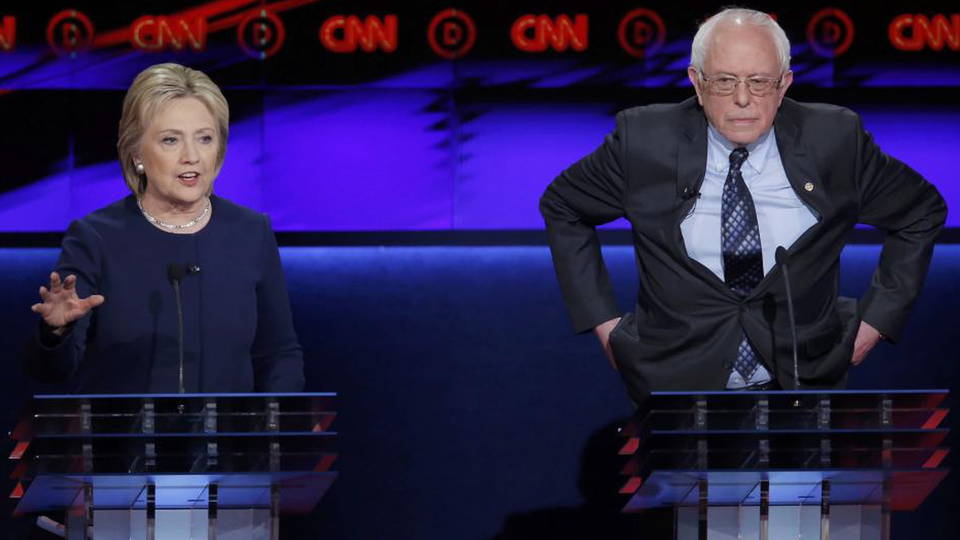
The race for the Democratic nomination intensified this weekend as Vermont Senator Bernie Sanders beat Hillary Clinton at caucuses in Maine, Kansas and Nebraska. But Clinton easily won in Louisiana. So far Clinton has won 658 delegates to Sanders’ 471 during the first 19 primaries and caucuses. In addition, Clinton has secured an overwhelming number of unelected superdelegates made up from the party establishment. Clinton and Sanders sparred during a debate in Flint, Michigan, Sunday night; we’ll have excerpts after headlines.
TOPICS:
2016 Election
Democratic Party
Ted Cruz Wins Kansas, Maine; Trump Takes Louisiana, Kentucky
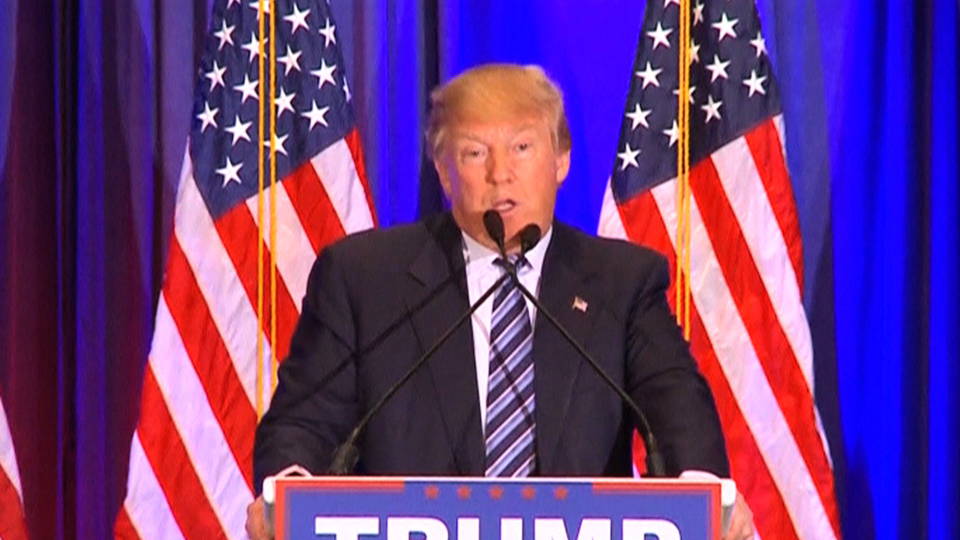
On the Republican side, Texas Senator Ted Cruz defeated front-runner Donald Trump in the Kansas and Maine caucuses, while Trump won in Louisiana and Kentucky. Trump called for Florida Senator Marco Rubio to drop out of the race, saying he wanted to take on Cruz one on one. But Rubio won the primary in Puerto Rico, sweeping all 23 delegates. Retired neurosurgeon Ben Carson meanwhile has suspended his campaign. And Ohio Governor John Kasich has picked up the endorsement of actor and former California Governor Arnold Schwarzenegger, who is set to replace Donald Trump on the reality TV show "The Apprentice." As the Republican establishment seeks to block Trump from taking the nomination, one possible strategy is for Rubio and Kasich to remain in the race, dividing the delegates in the hopes of producing a brokered convention. Meanwhile, outside groups are reportedly gearing up to spend millions of dollars on anti-Trump attack adds in Florida and Illinois ahead of key contests there.
TOPICS:
2016 Election
Republican Party
Trump Vows to Broaden Laws on Torture
Speaking in Florida over the weekend, Trump said he would broaden laws on torture.
Donald Trump: "We’re going to rebuild our military. We’re going to knock out ISIS so violently and so fast. They chop off heads. They do things that we haven’t seen since medieval times, and we’re worried about waterboarding. So here, very—wait, wait, wait. Sit down. Sit down. Let me just tell you. OK? Excuse me. So I want to stay within the laws, and right now we have the laws, but I want to make those laws stronger so that we can better compete with a vicious group of animals, OK?"
TOPICS:
2016 Election
Republican Party
Turkish Authorities Seize Zaman, Country's Largest Newspaper

Turkey’s largest newspaper has been taken over by the authorities. On Friday, Turkish police raided the offices of the newspaper Zaman after a court ruling put the newspaper under state control without giving any reason. The next day, as thousands rallied to defend the newspaper, police fired rubber bullets and tear gas; dozens reportedly collapsed after being overcome by the gas. Sunday’s edition of the newspaper featured a new propagandistic, pro-government line, while former Zaman staff launched a new paper of their own. Zaman’s former editor-in-chief Abdülhamit Bilici, who was fired in the takeover, said it was a dark period for Turkey.
Abdülhamit Bilici: "Unfortunately, it has been a habit for the last three, four years that anyone who is speaking against the government policies is facing either court cases or prison or such control by the government. And I think this is a dark period for our country, for our democracy. But I don’t think that this dark period will continue. It cannot be sustained, and it cannot be continued."
TOPICS:
Turkey
Freedom of the Press
Turkish Women Defy Ban, Rubber Bullets to Rally for Gender Equality
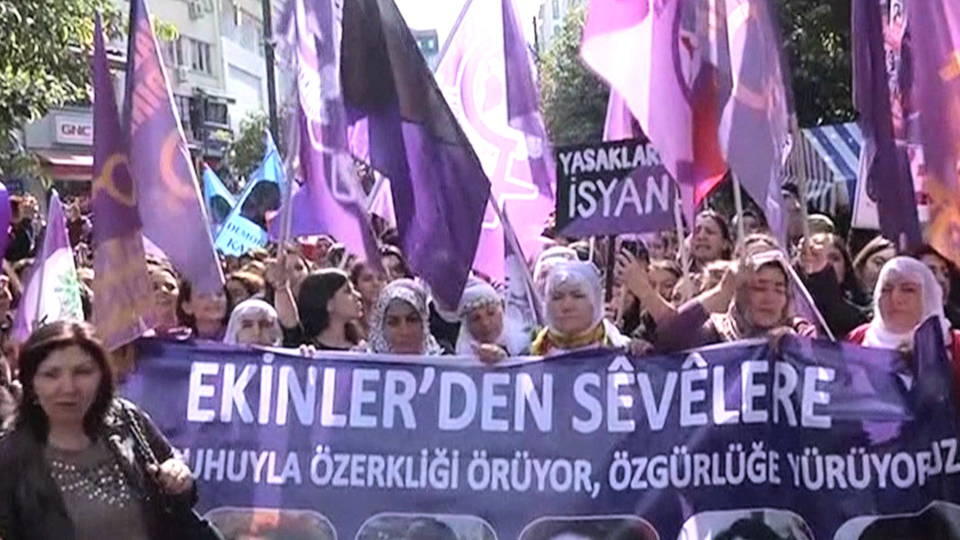
Meanwhile, hundreds of women gathered in Istanbul, defying a ban, to rally for gender equality ahead of Tuesday’s International Women’s Day. Riot police fired rubber bullets to disperse the crowd, but protester Guris Özen said women would not back down.
Guris Özen: "We have always said that we would never leave the streets for the March 8 demonstrations, and we never will. Neither the police nor the government can stop us. You see the power of women. We are here despite every obstacle, and we will continue to fight for our cause."
TOPICS:
Turkey
Women's Rights
Turkey Meets with EU Leaders on Refugee Crisis; 25 People Drown
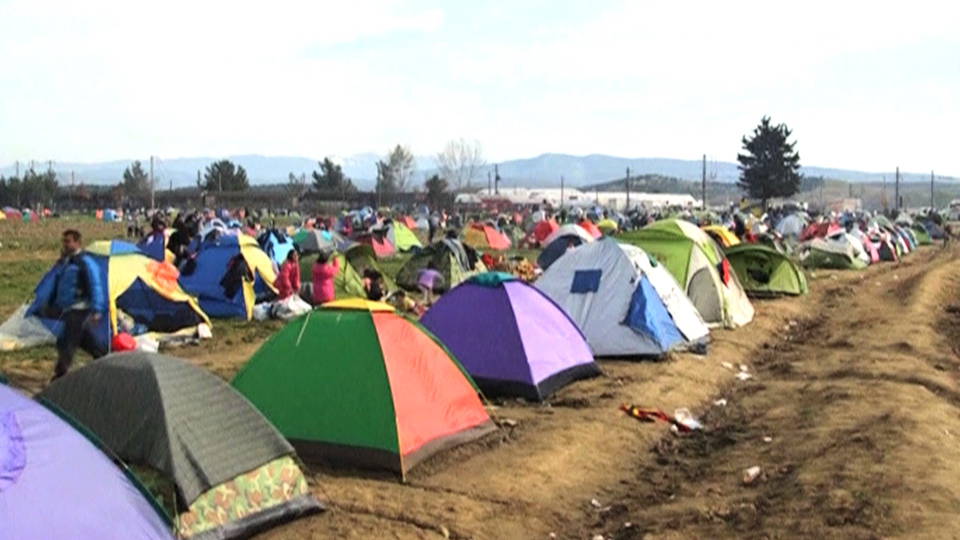
The repression in Turkey comes as the Turkish prime minister meets with European Union leaders in Brussels over the largest refugee crisis since World War II. Turkey is also seeking to advance its bid to join the European Union. On Sunday, at least 25 people drowned off the Turkish coast attempting to reach Greece. On the Greek border with Macedonia, thousands of refugees remain stranded as Macedonia has tightly restricted who can cross. A man from war-torn Aleppo, Syria, called for open borders, appealing to German Chancellor Angela Merkel.
David: "I want this door, nothing; I want this door open, this door. Merkel, Mama Merkel, I want, where are you? Mama Merkel, where are you? Where are you? I want open the door."
TOPICS:
Turkey
Refugees
Slovakia: Party with Neo-Nazi Ties Wins 14 Parliamentary Seats
In Slovakia, an extreme right-wing party has made surprising gains in the elections, picking up 14 parliamentary seats. The People’s Party-Our Slovakia is led by Marian Kotleba, known for his past ties to neo-Nazism, including his decision to wear a uniform modeled after the World War II-era militia of the Nazi-sponsored Slovak State. The party of Slovakia’s prime minister—who himself has campaigned against refugees—finished first in the polls. Slovakia takes over the presidency of the Council of the European Union in July.
Iraq: Suicide Bombing South of Baghdad Kills At Least 60
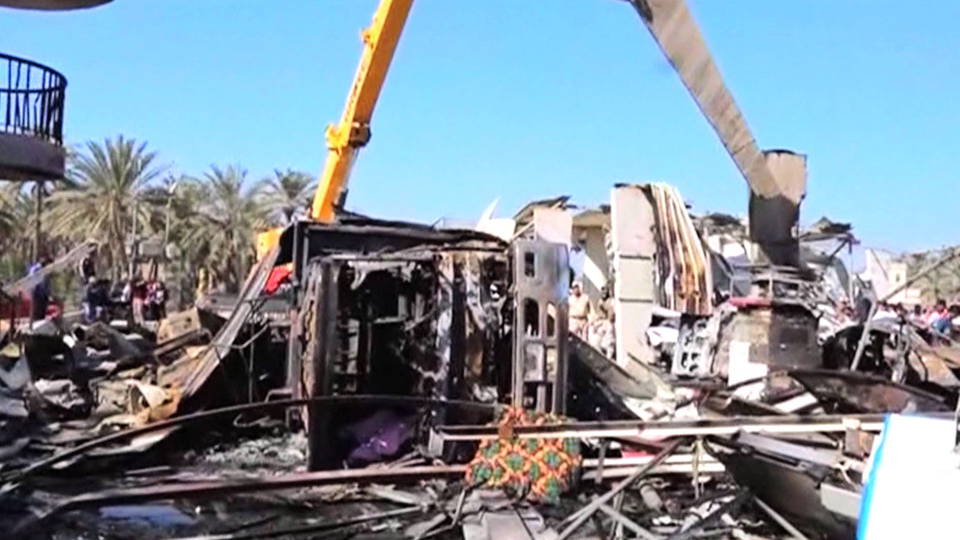
In Iraq, a suicide bomber detonated a fuel tanker laden with explosives, killing dozens of people at a checkpoint in Hilla south of Baghdad, near the site of ancient Babylonian ruins. Reuters said at least 60 people had been killed and more than 70 wounded in what it called the second deadliest suicide attack this year. ISIL has claimed responsibility. It was the third major bombing around Baghdad in just over a week.
TOPICS:
Iraq
Yemen: Civilian Casualties Mount Amid U.S.-Backed Bombing

In Yemen, gunmen attacked a nursing home founded by Mother Teresa in the southern city of Aden, killing at least 16 people, including six nuns. The violence came as the United Nations reported about twice as many civilians had been killed in Yemen in February as in the previous month, marking the highest monthly casualty toll since September. Rupert Colville, spokesperson for the Office of the U.N. High Commissioner for Human Rights, said most of the casualties came from airstrikes by the U.S.-backed, Saudi-led coalition fighting Houthi rebels.
Rupert Colville: "Civilian casualties continue to mount in Yemen. During the month of February, a total of at least 168 civilians were killed, and 193 others were injured, around two-thirds of them by coalition airstrikes."
TOPICS:
Yemen
Average Temperature Briefly Tops 2 Degrees in New Climate Milestone

The world has reached a new climate change milestone. On Thursday, for a brief period, the average temperature in the Northern Hemisphere was more than 2 degrees Celsius above normal for the first time in recorded history. The 2-degree marker has been accepted by governments around the world as a key red line to avoid the most catastrophic impacts of global warming. This comes after February became the most unusually warm month on record—smashing the record set the month before.
TOPICS:
Climate Change
Supreme Court Blocks Louisiana Anti-Choice Law, Saving Clinics for Now
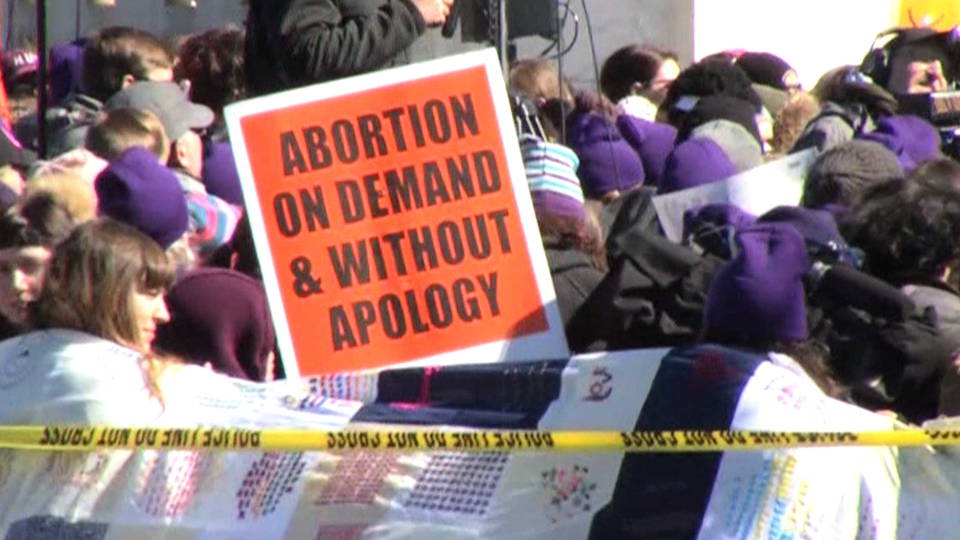
In a victory for reproductive rights, the Supreme Court has temporarily blocked a Louisiana law critics say would have shut down all but one abortion clinics in the state. The law required abortion providers to obtain admitting privileges at a nearby hospital, a task many can’t achieve, in part due to anti-choice sentiment. The court said its decision was "consistent" with a prior ruling blocking part of a similar sweeping anti-choice law in Texas. The decision on Louisiana Friday came just two days after the Supreme Court heard a challenge to the Texas anti-choice law, marking the most important abortion case in a generation. A decision is expected in June.
TOPICS:
Abortion
Supreme Court
West Virginia Passes Law Letting People Conceal Guns Without Permit

In West Virginia, the Legislature has approved a measure allowing people to carry a concealed firearm without having a permit. Lawmakers overrode a veto by Democratic Governor Earl Ray Tomblin. The measure was opposed by police but backed by the National Rifle Association.
TOPICS:
Gun Control
Former First Lady Nancy Reagan Dies at 94
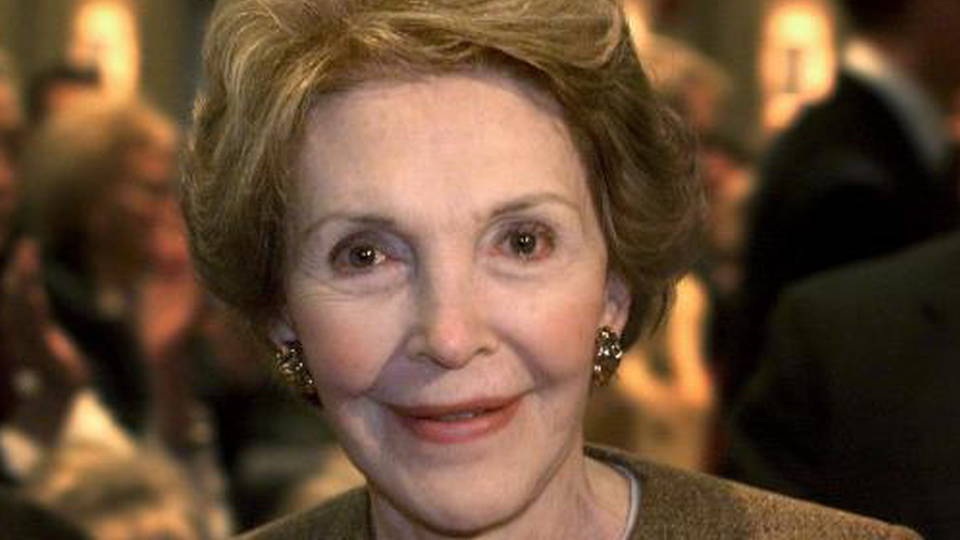
Former first lady Nancy Reagan, widow of President Ronald Reagan, has died from congestive heart failure at the age of 94. Reagan is perhaps best known for her ad campaign urging people to "just say no" to drugs, part of a wider escalation of the war on drugs under her husband’s presidency. Later in life, Nancy Reagan split with conservatives to become an advocate for stem cell research, after caring for her husband as he suffered from Alzheimer’s.
Honduras: Thousands Gather for Funeral of Berta Cáceres
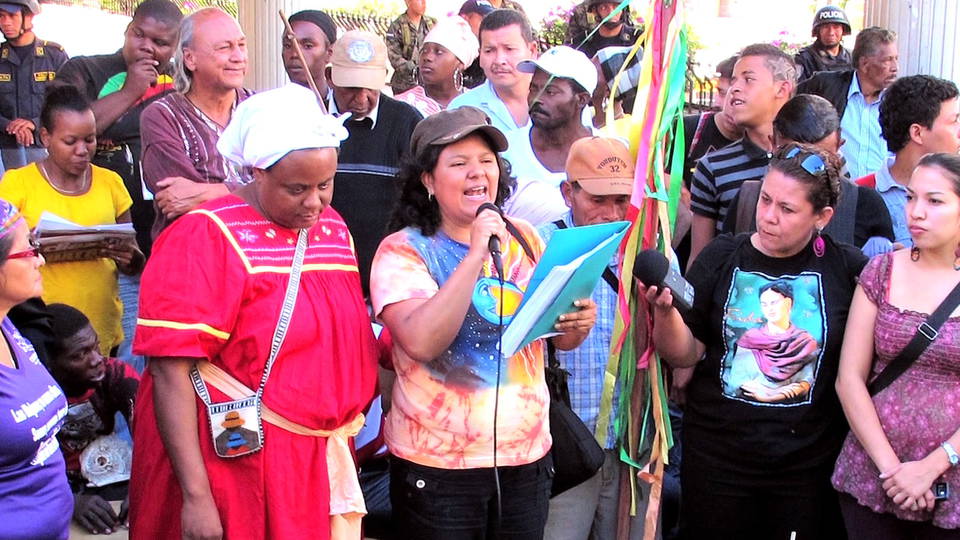
And in Honduras, thousands of people gathered at the home of assassinated environmentalist Berta Cáceres to pay their final respects to one of the leading advocates for indigenous land rights in Honduras. Cáceres, who won the Goldman Environmental Prize last year, was gunned down at her home early Thursday. She had received repeated death threats over her opposition to mining and dam projects, including the Agua Zarca Dam. In a statement, Vermont Senator Patrick Leahy called for the dam project to be abandoned. Cáceres’ supporters, including Lesly Flores, vowed to continue her struggle.
Lesly Flores: "I’m saying goodbye to her for the last time, but the truth is that Berta hasn’t died. Berta lives on in our hearts. They haven’t actually killed Berta; they haven’t killed her. Berta is a seed that we’ve been left with. For us, that seed will germinate day after day, and we, as women, will continue the fight. We are not scared."
TOPICS:
Honduras
Donate today:
Follow:




SPECIAL REPORT

"Thirsty for Democracy: The Poisoning of an American City": Complete Democracy Now! Special on Flint
SPECIAL REPORT

The Fight to Keep Abortion Safe & Legal: A Special Report from Outside the U.S. Supreme Court
WORK WITH DN!

Broadcast Engineer
Director of Finance and Operations
Director of Development
---------------------
207 West 25th Street, 11th Floor
New York, New York 10001, United States
--------------------
--------------------
No comments:
Post a Comment